Timeline
Historical Timeline 1899-2024
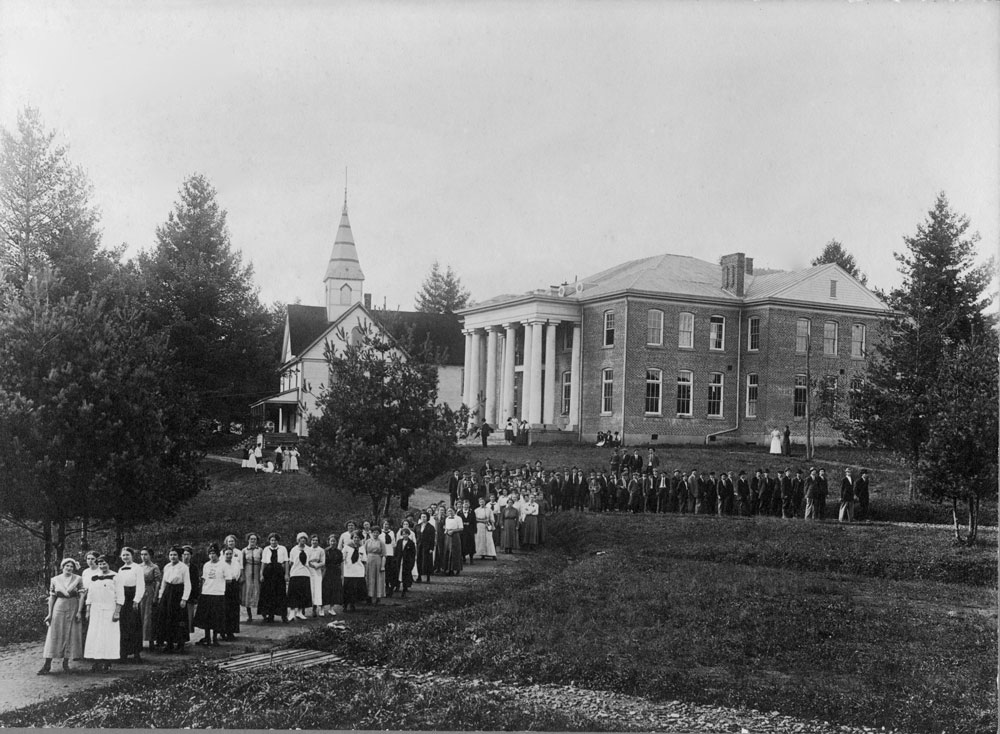
Timeline
Historical Timeline 1899-2024
Explore this timeline to learn about Mountaineer milestones, unforgettable events and interesting facts in App State’s history — from 1899 to today. When did football become an official sport at App State? Who was the university’s first leader? Dive in to find out.
Appalachian State University begins as Watauga Academy, founded in 1899 by Dr. Blanford Barnard “B.B.” Dougherty, his brother, Dauphin Disco “D.D.” Dougherty, and D.D.’s wife, Lillie Shull Dougherty.
An announcement of Watauga Academy’s founding appeared in the July 13, 1899, issue of the Watauga Democrat newspaper, with classes to begin Sept. 5, 1899. Tuition was $1–$3 per month, and board was $4 per month.
Local community members raised $1,100, as well as labor and materials for the two-story, wood frame Watauga Academy building, construction for which began in fall 1899. Classes for the 53 enrolled students were held in the old Boone Academy building, located behind the present-day Boone First Baptist Church, until the Watauga Academy facility was ready for classes in January 1900. Construction of Watauga Academy was completed in 1903.
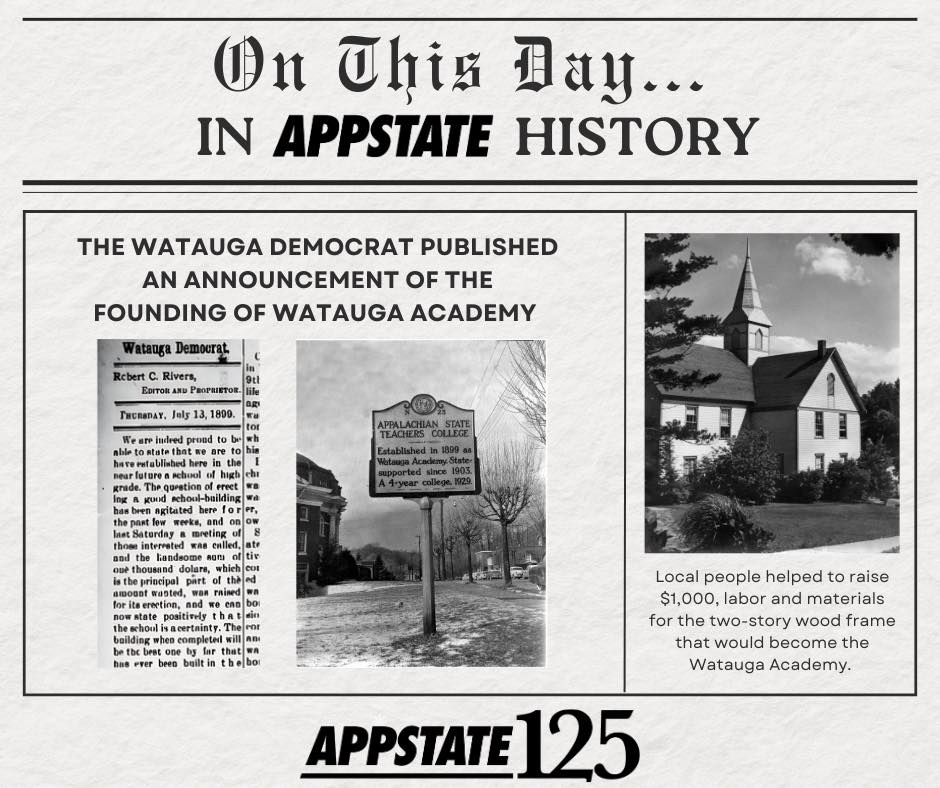
150 students enrolled at Watauga Academy.
Watauga Academy celebrates its first graduates: Thomas C. Baird, a farmer from Valle Crucis; and Jesse L. Moore, a merchant from Elizabethton, TN.
Watauga Academy became the Appalachian Training School, opening on Oct. 5, 1903, with 325 students and six faculty. The school, which prepared and trained both teachers and students, had three departments: The Public School Department with seven grades; a Teacher’s Course for teacher preparation; and a High School Department. Eight students graduated from Appalachian Training School in 1903, and deans were established the same year.
The school was made possible through $2,000 in state funding — supported by the Newland Bill, drafted by B.B. and passed by one vote on March 9, 1903, at the state legislature — as well as $1,500 in matching funds raised by Watauga County and a $500 gift from local entrepreneur Moses Cone.
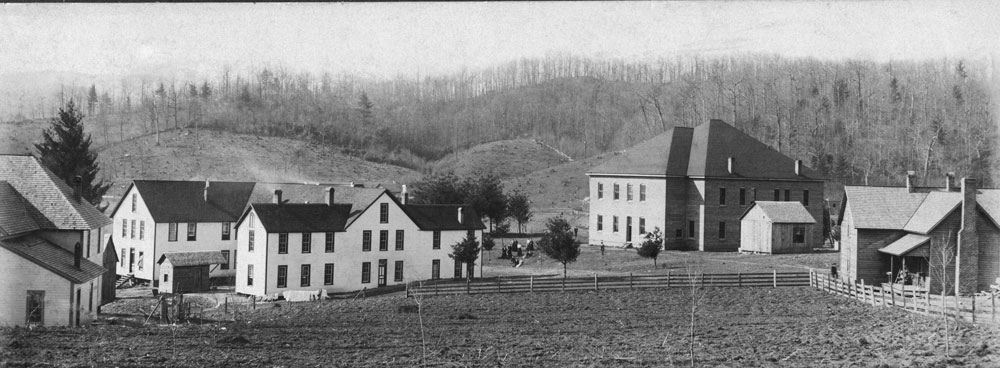
Construction of the Doughertys’ family home, located along Rivers Street on the Boone campus, is completed.
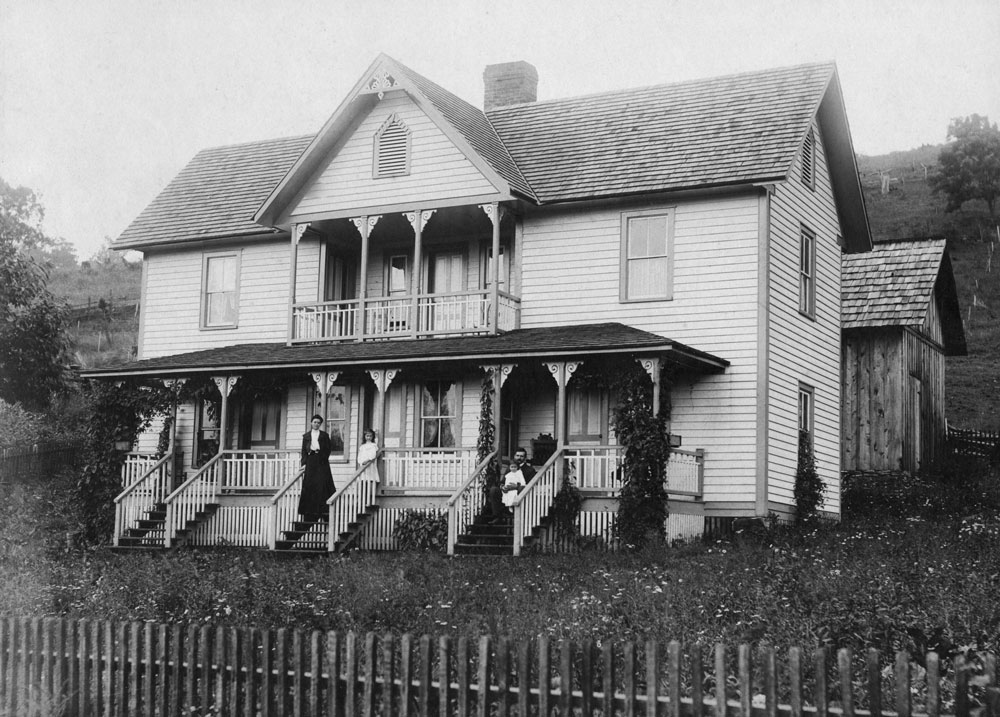
The Dew Drop — a school bulletin, course catalog and general information pamphlet — is first published. It was published from 1904 to 1930, at which point the name was discontinued but production continued as a standard course catalog. View digitized versions of the catalog.
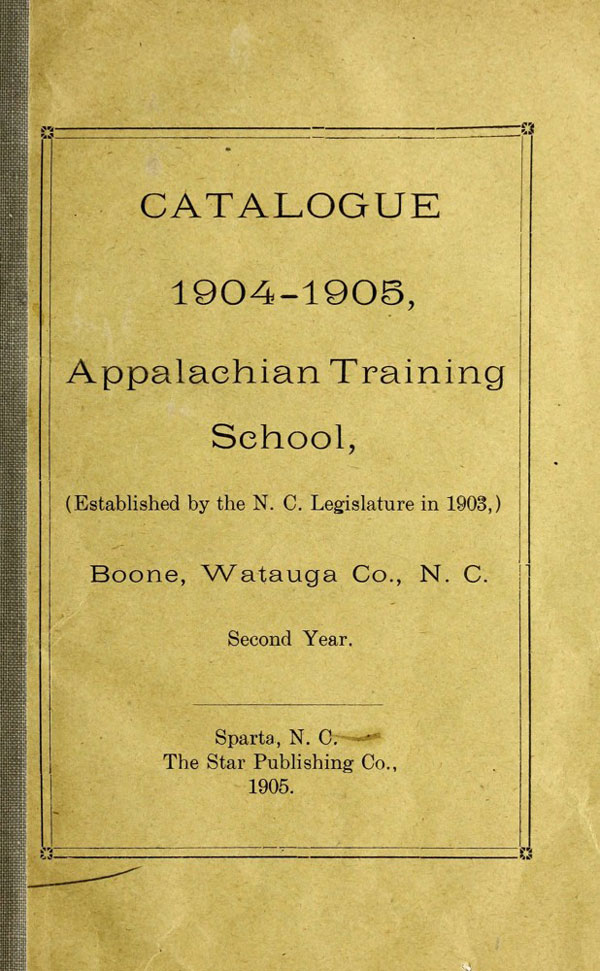
Tuition ranged from $4.50 to $11.25 per term, with free tuition for all teachers and students intending to teach a minimum two years in NC public schools. High School classes were $2.50 per month, the first three Public School grades were $1 a month, grades 4–5 were $1.50 and grades 5–6 were $2. Music and art cost $2, while piano classes were $0.25 per month.
The first administration/classroom building is completed east of Watauga Academy. The two-story building, demolished 1967, contained an office, business room and chapel on the first floor and an auditorium and music rooms on the second floor.
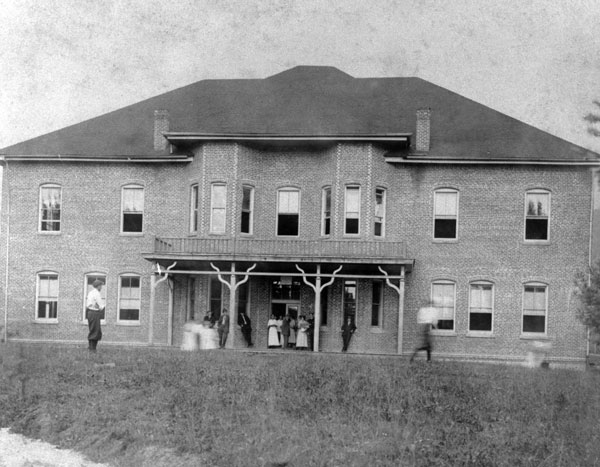
The Lovill Home was built as a women’s dormitory. It housed 85 women and included two society halls, two sitting rooms and two study rooms. Another Lovill Home was built in 1915, and the original Lovill Home became apartments for workers and teachers.
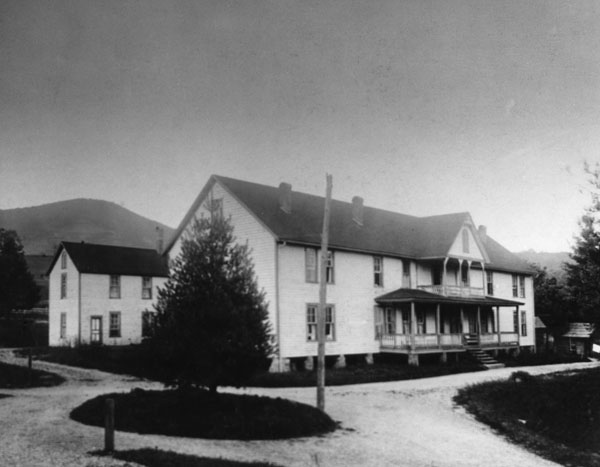
An Alumni Association is organized. Today, App State has more than 150,000 living alumni across the state, nation and world.
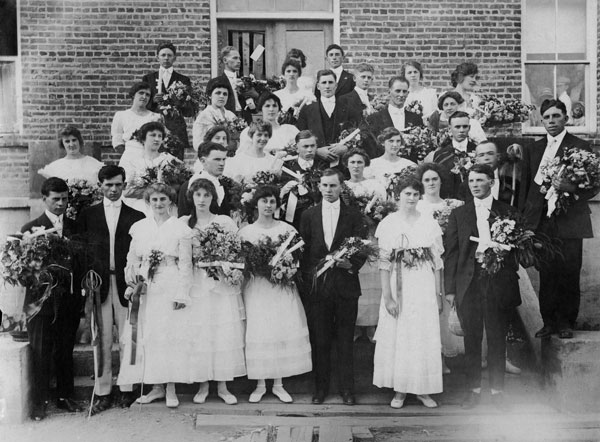
The first male residence, Newland Hall, is built on the south side of the Boone campus, west of the Doughertys’ home.
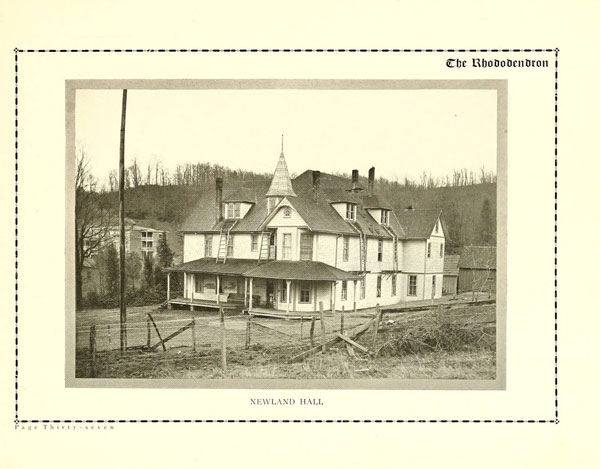
Tuition is $10 for all students. Total student fees per term (board, tuition and incremental fees) was reported as $48.50 for men and $44.00 for women. Teachers and students intending to teach in NC public schools were still exempt from tuition payments. Two scholarships for free tuition were available from the University of North Carolina and Trinity College.
371 students are taught at Appalachian Training School in the 1909–10 school year, with 108 in the summer term only.
Science Hall, the first specialized academic campus building, is completed. The building, along with Watauga Academy, was destroyed by fire in 1946.
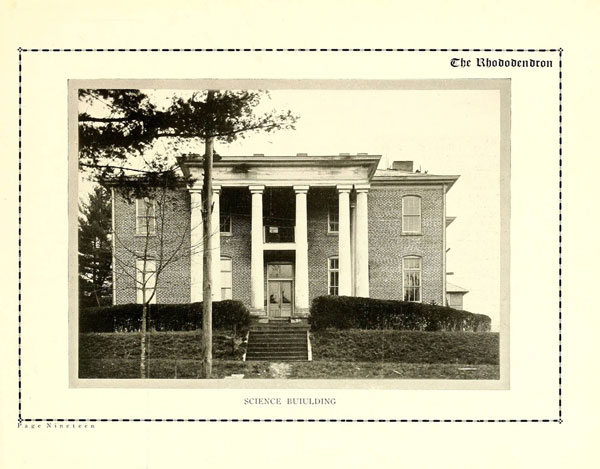
Young women students gain access to grounds for croquet, tennis and other games, located behind the Administration Building.
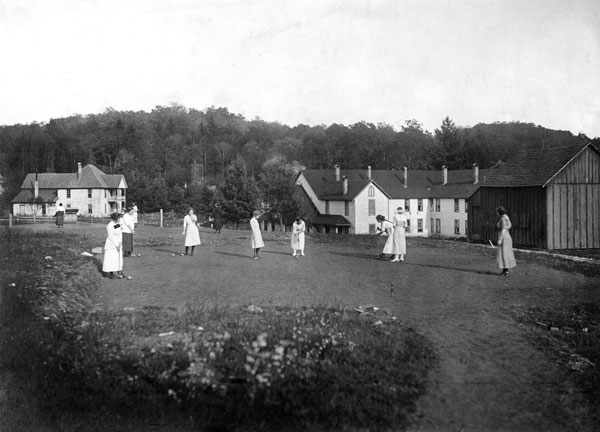
The Athletic Association, for men’s athletics, is first mentioned in the Dew Drop catalog. Membership was $0.25 per year. The association managed baseball games, a track team and other sports.
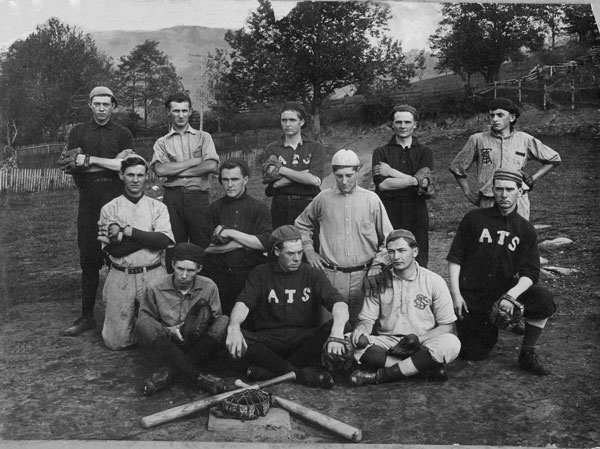
The quarter term system began. With this system, the university’s academic year operated on a four-part schedule, with fall, winter, spring and summer terms. Today, App State uses a semester system, with the academic year divided into two semesters, fall and summer, and two Summer Sessions.
Library hours are increased to two hours a day, with the library offering 5,000 volumes, two daily papers, and 20 monthly magazines. Bettie Stephenson became the university’s first librarian.
The Book Room provides students with textbooks at wholesale prices. The campus no longer provided books directly.
New River Light and Power (NRLP) — the university’s electric utility — is established with state approval. The utility’s power plant was built on Edmisten Farm, approximately two miles south of campus, and provided electricity for the first time to the Appalachian Training School and six customers in Boone. Electricity and water systems were installed in all campus buildings. Learn more about NRLP’s history.
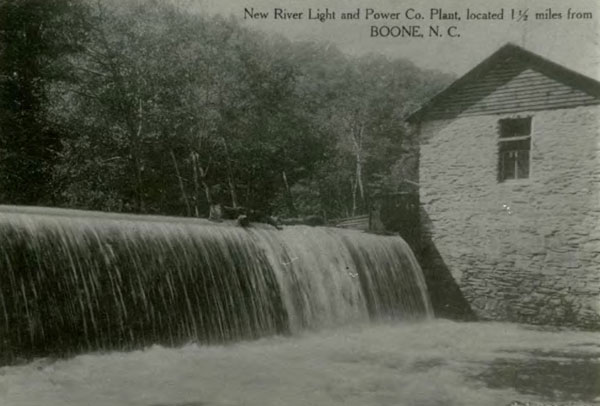
Appalachian Training School maintains 16 regular faculty and six assistants. Enrollment reaches 556.
The U.S. enters World War I and enrollment drops to 390 in the 1917–18 school year, with 181 students in summer school only.
An Arts and Crafts Building, also known as the Industrial Arts Building, is constructed on the south end of the Boone campus. The building housed the university’s first gymnasium on its first floor and the manual training program on the second floor. The facility was demolished in the late 1930s.
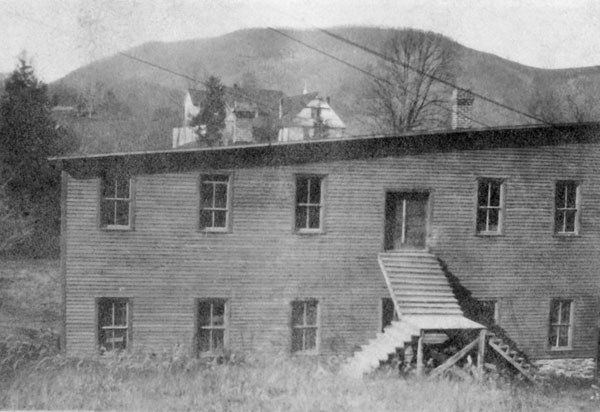
A narrow gauge railroad to Boone, NC, is established by the Linville Branch of the Eastern Tennessee and Western North Carolina Railroad, known as the Tweetsie Railroad, in October. It ran from Johnson City, TN, to Boone.
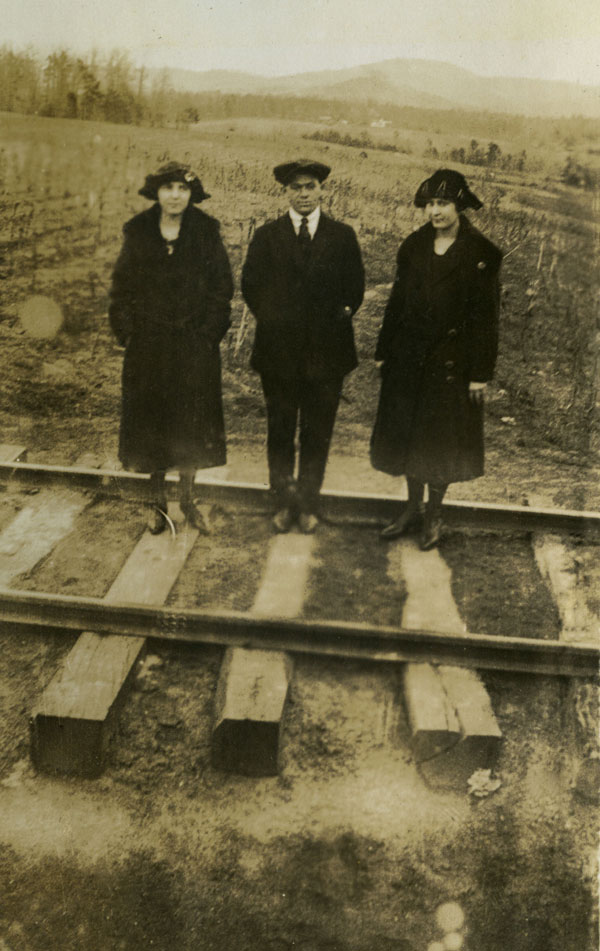
The Appalachian Training School campus is placed under quarantine during the Spanish Influenza, and students are restricted to campus, with entrances closed to visitors. A few mild cases of sickness among students were reported, but all recovered within a few days.
On Nov. 11, word arrives that World War I has ended. The Appalachian Training School celebrates, with chapel service and a parade.
The North Carolina General Assembly suggests the Appalachian Training School abandon high school education in preference for training elementary school teachers, due to a teacher shortage in the state following World War I.
University trustees elect B.B. Dougherty as sole president of Appalachian Training School and D.D. Dougherty as the school’s business manager.

The North Carolina State Board of Education takes regulatory control of Appalachian Training School, and the school begins phasing out its high school courses and implementing a two-year curriculum.
For the first time, health certificates are required at time of registration, certifying and stating that the applicant is not sick with a contagious disease and has not been exposed to any such disease within 20 days.
The first volume of the university’s yearbook, The Rhododendron, is published. It was released yearly until 1992. In 2004, the yearbook returned, but in 2006, production ended again. The Rhododendron was compiled and published by members of the senior class. View digitized issues of The Rhododendron.

Student enrollment reaches 770 in the 1922-23 school year, and 48 students graduate.
The New River Light and Power (NRLP) plant burns down on March 23, causing a blackout on campus and in Boone that lasts for 17 months. Electricity was restored in the fall of 1924, when the new hydroelectric plant on the Middle Fork of the New River was finished.
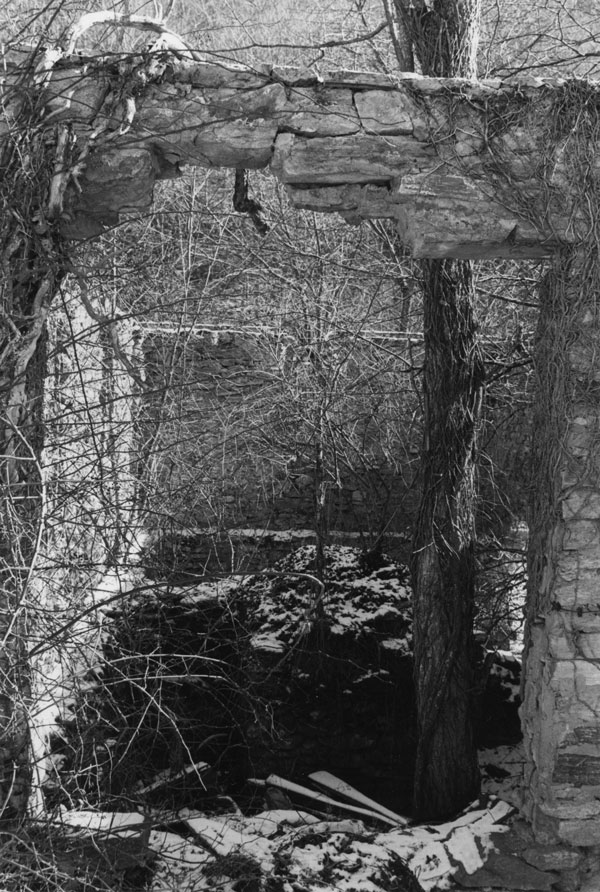
The State Board of Education appropriates $125,000 ($2.3 million in today’s dollars) for the construction of a new Administration Building on the western side of the Boone campus, as well as $300,000 (equivalent of $5.6 million today) appropriated for a hydro-electric plant on Middle Fork of the New River and a physical education building.
The university’s first football field is built. It was located on the site that is now home to the Rankin Science Building.
1,097 students enrolled at the Appalachian Training School.
The road between Wilkesboro and Boone is paved to facilitate automobile travel through the area.
The second Administration Building is completed. It was located on the Promenade, approximately where Anne Belk Hall is currently located, and was destroyed by fire in 1966.
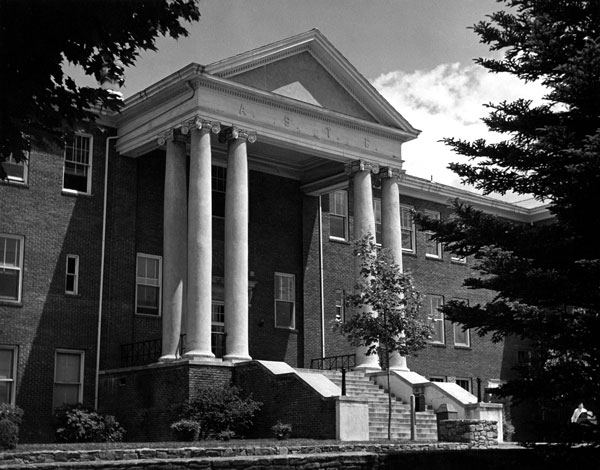
Appalachian Training School receives approval from the North Carolina General Assembly to offer two-year college courses, and the school’s name is changed to Appalachian State Normal School (ASNS). High school courses were phased out entirely. B.B. Dougherty was named president of ASNS and a new Board of Trustees was formed. ASNS opened on Oct. 5 with 350 enrolled students.
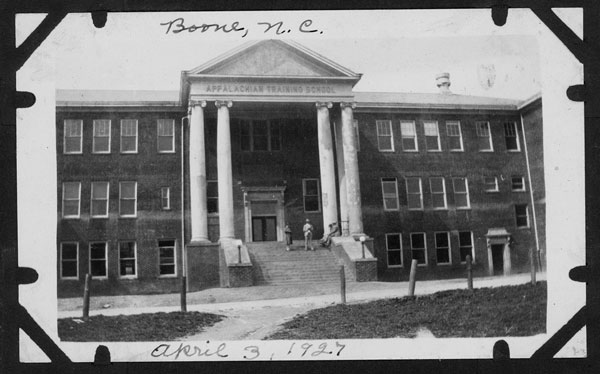
Boone Grade School is constructed as a Demonstration Elementary School, aka Appalachian Elementary School. The school was a cooperative institution between the university and Watauga County Schools, through which the school provided facilities and teachers for Watauga County students, and Appalachian Training School students gained teacher training in their final year. In 1954, a second facility for the school was built beside the Boone Grade School building. Before the Boone Grade School was built in 1924, the school had previously been taught in the university’s Science Hall. The Appalachian Elementary School program ended in 1975.
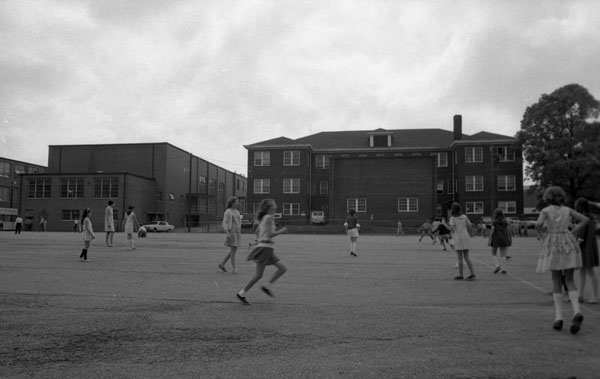
Profits from New River Light and Power are set aside to be used as a loan fund for students. Currently, NRLP reserves approximately $650,000 each year for the general scholarship fund at App State, which supports the Chancellor’s Scholarship and other university scholarships.
Appalachian State Normal School is accredited by the American Association of Teachers’ Colleges and Normal Schools.
The first organized football team begins intercollegiate sports competition in the 1928–29 school year.
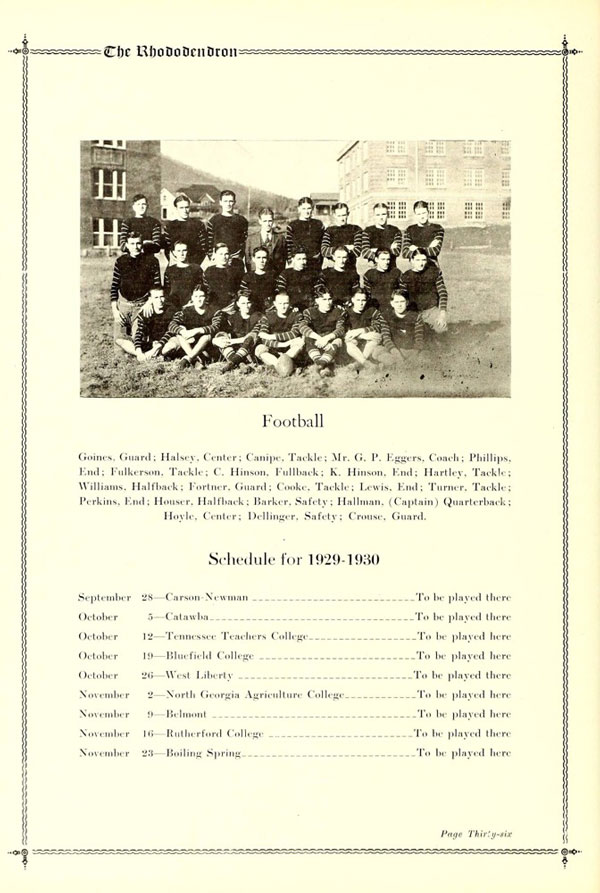
With approval from the state legislature, Appalachian State Normal School becomes the Appalachian State Teachers College — a four-year college for training teachers. B.B. Dougherty is named president of the college and a new Board of Trustees is formed.
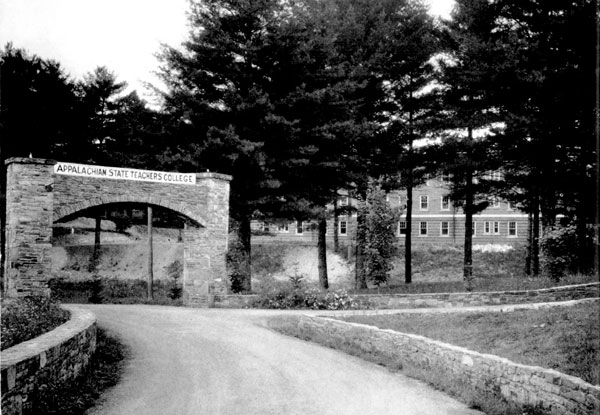
App State co-founder D.D. Dougherty passes away the same day that registration opened at the new Appalachian State Teachers College on June 10. After her husband’s death, Lillie Shull Dougherty took over as the college’s treasurer and business manager.
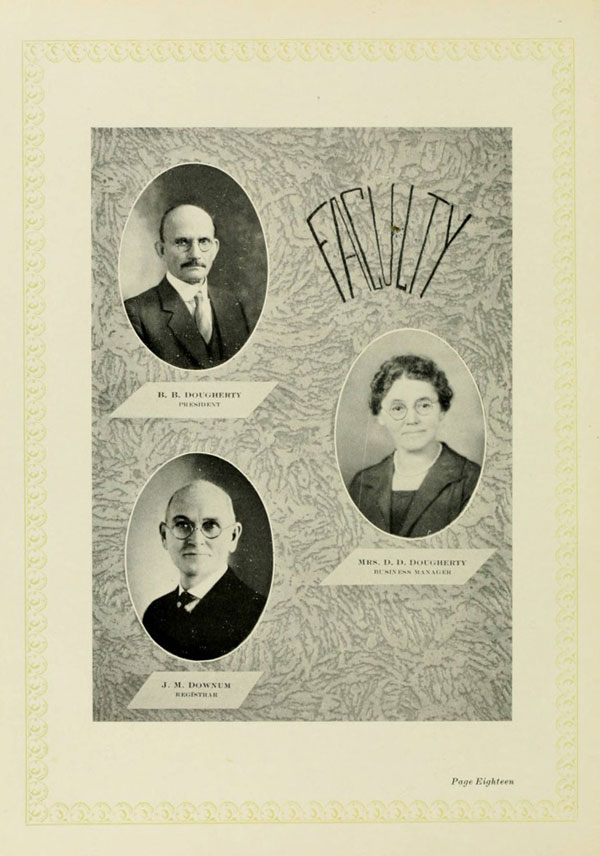
During the Great Depression of the 1930s, average enrollment at Appalachian State Teachers College is 900 students, with a low of 350.
In May, the Young Women’s Christian Association sponsors the first May Day Festival and elects the May Day queen. May Day festivals took place in the spring and typically included a dance. This video offers a glimpse of the 1953 May Day celebration at Appalachian State Teachers College.
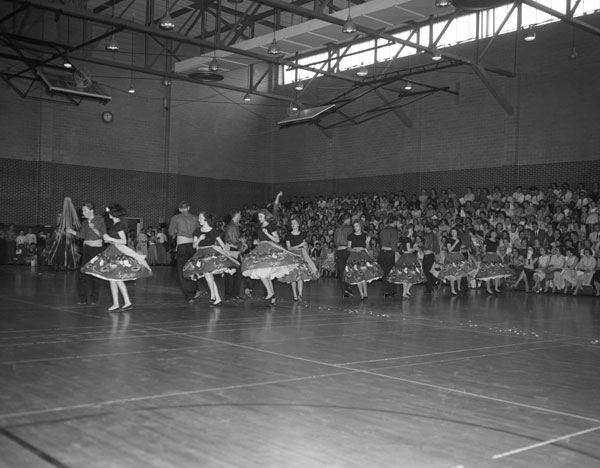
The first organized cheerleader squad appears in The Rhododendron.
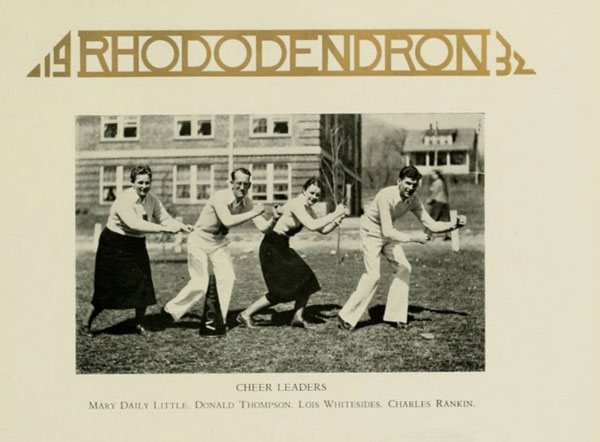
The International Relations Club is founded. The organization collected literature on world issues, hosted lectures and “attempts to sponsor international peace through intelligent study and understanding of international problems.”
Research by App State’s Special Collections and Research Center shows that the university had a global connection even in its early years, when it was still a small teachers college and most of its students were from the local region. Learn more about some of the first international students to attend the university.
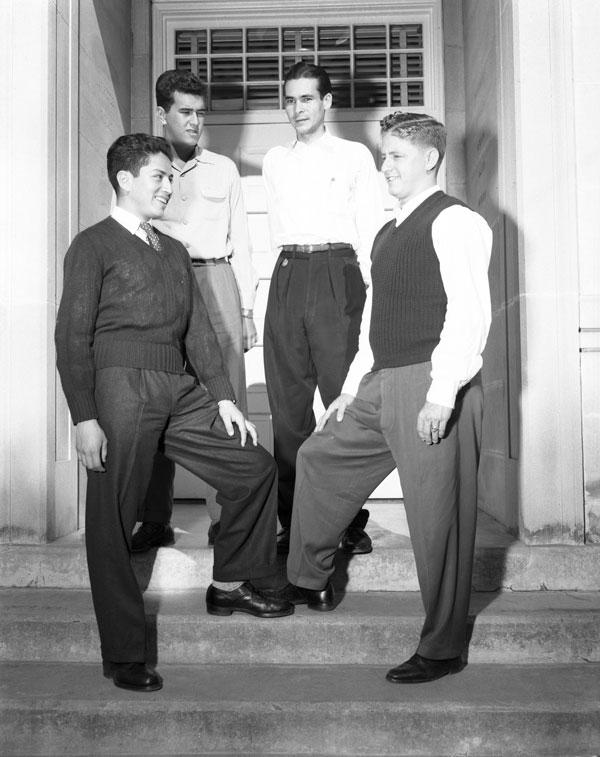
A college infirmary opens at Appalachian State Teachers College, with construction supported by federal funding (Works Progress Administration program). The building was reopened in 1938 as Watauga County Hospital, serving members of the university and the town of Boone, and later became Watauga County Hospital in 1959. It served in this capacity until 1968, when it was renovated as the Administration Building Annex. Today, it is an administration building known as Watson-Brumit Hall.
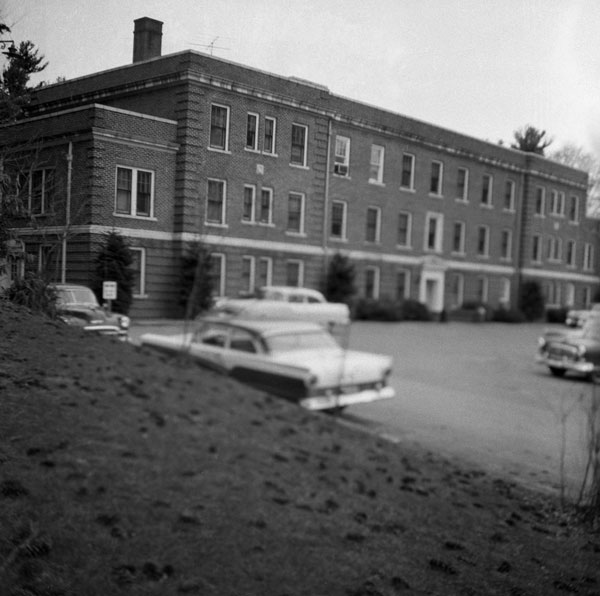
The Boone campus houses 756 students and 27 faculty. During the Great Depression years, the college was appropriated only $40 per capita by the state legislature, and teacher salaries were reduced 32%.
Playcrafters, App State’s first theater group and dramatic club, is organized.
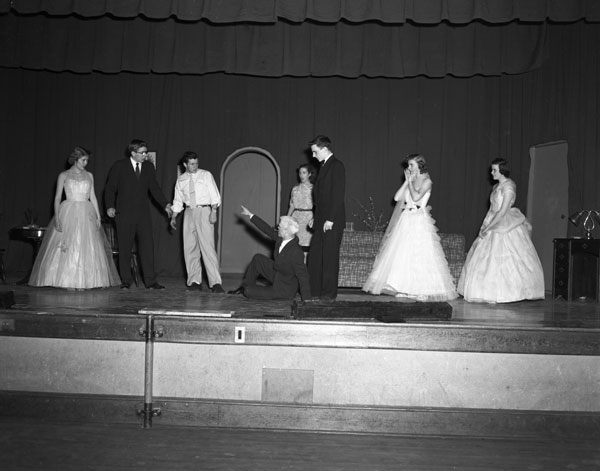
The first Freshman Orientation is held, which includes testing and classification of students.
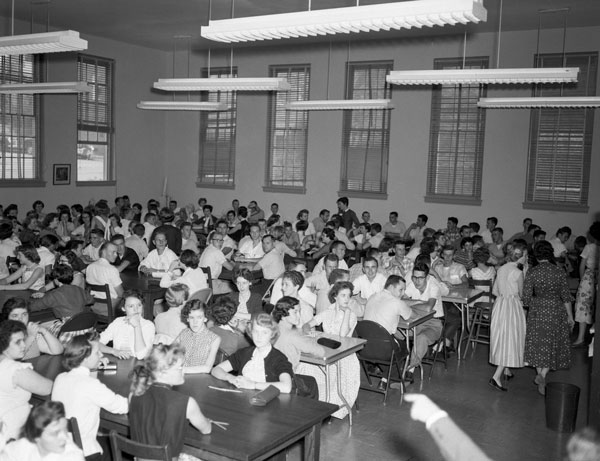
The Social Science Department is established.
English and history majors are offered.
The first issue of The Appalachian student-produced newspaper, reporting on campus events and opinions, published in October. Browse digitized past issues of The Appalachian.
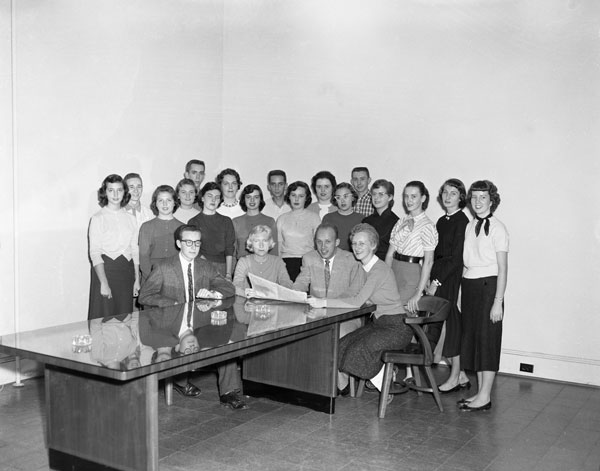
The Appalachian State University Alumni Association, as it is known today, begins. Nearly 150,000 living Appalachian State University alumni are located across the state, nation and world, making lasting and impactful contributions to their respective communities. The App State Alumni Association creates and fosters communities of App State alumni, supporting nearly 30 regional alumni networks in NC and across the nation.
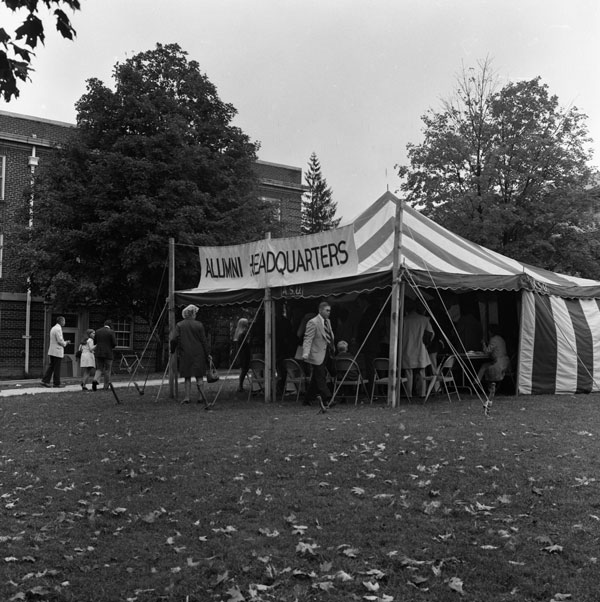
The College Bookstore moved to a brick building on the corner of Locust Street and College Street. Three apartments on the second floor were used for faculty housing.
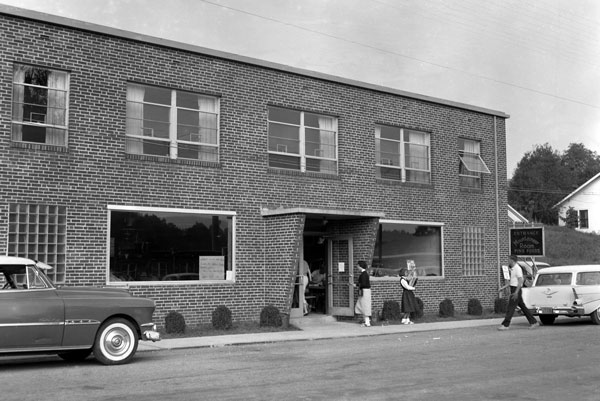
A Women’s Gymnasium was completed. It was demolished for the addition to the Welborn Cafeteria/Hall in the 1956–57 school year.
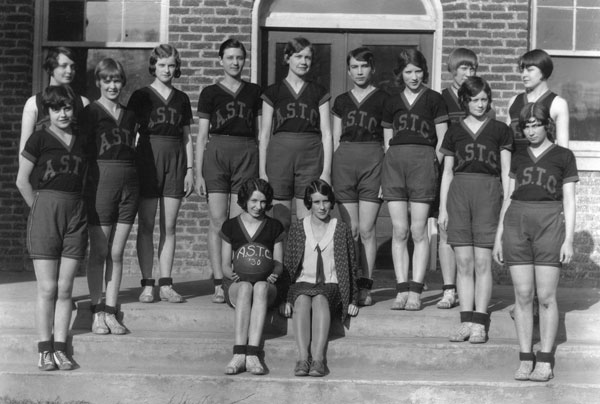
The university’s slogan is “Appalachian marches on” during the mid-1930s.
Construction of the Blue Ridge Parkway begins in the mid-1930s between Virginia’s Shenandoah Mountains and the Great Smoky Mountains National Park, running through Watauga County. The roadway increased access to the rural communities along its route, including those in Western North Carolina.

Kidd Brewer begins coaching football at App State. In 1935, the team scored five wins, two ties and two defeats. In 1936 and 1938, the team won eight games and lost one, and in 1937 the team was undefeated. He left App State after the 1938 season.
The D.D. Dougherty Library is completed on the Boone campus. The building served as the campus library from 1935 until 1969, when the first Belk Library opened. It is now known as D.D. Dougherty Hall, home to the Disco Student Learning Center, established in 1972 and part of App State’s University College.
Did you know? The “Disco” portion of the center’s name honors App State co-founder Dauphin Disco Dougherty. The word disco means “learn” in Latin.
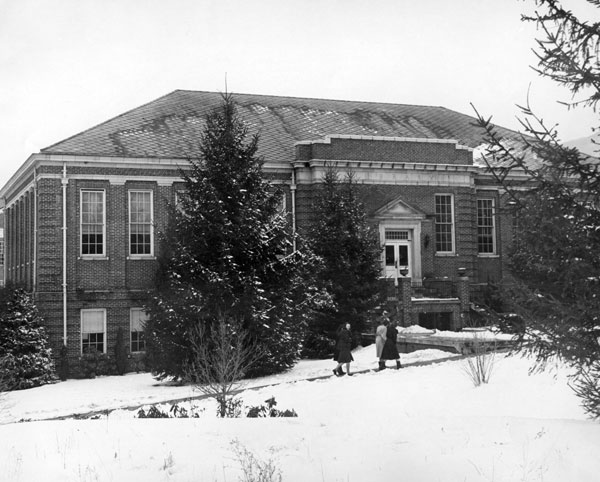
At the opening of the fall term, B.B. Dougherty allows women students to select what days they were allowed to travel uptown, when they would visit the soda fountain, department stores and other Boone businesses.
The Glee Club forms in the Hayes School of Music. Watch this video from a 2019 App State men’s basketball game to listen to the Glee Club sing the national anthem.
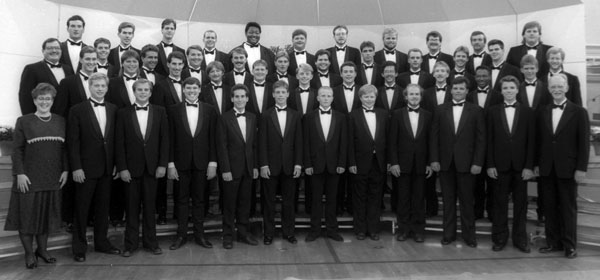
Seventeen students form a Letter Club in November. In the 1930s, Letter Clubs existed alongside other groups such as fraternities, sororities and academic honor societies. With an emphasis on athletics and school spirit, Letter Clubs were particularly prominent during this time period.
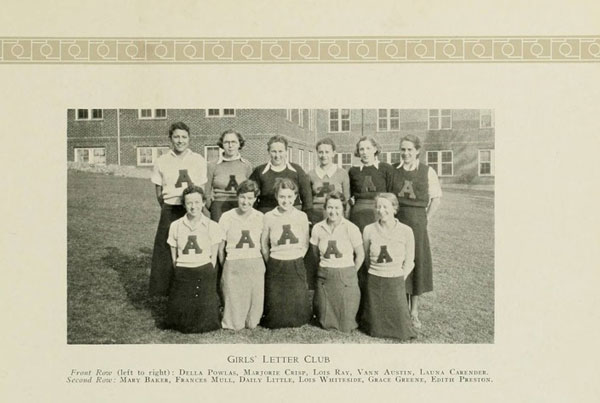
850 students register for the spring term.
A blizzard hits Boone in March, preventing people from entering or leaving Boone for one week.
A department for public speaking, titled the Department for Extemporaneous Speaking, is formed and directed by Dr. Daniel Jay “D.J.” Whitener.
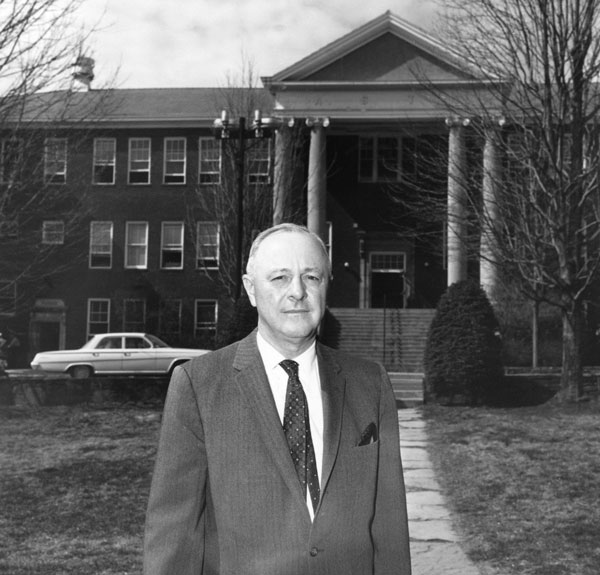
The first Boone high school band is organized by Appalachian State Teachers College music professor Gordon Nash.
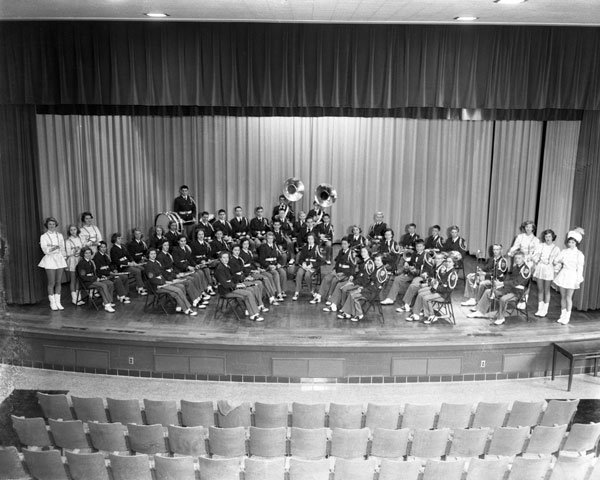
A home economics major is offered.
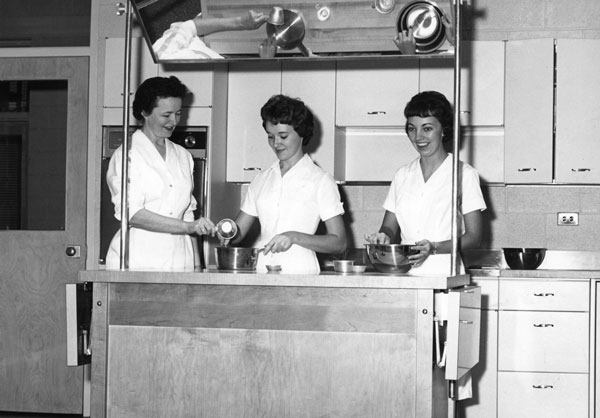
The College Bookstore implements a textbook rental program. App State’s textbook rental program transitioned to a digital delivery system — one of the first of its kind in the nation — in 2021, and in the 2022–23 academic year, the program saved students over $5 million. It has been utilized by 99% of the student population since its launch.
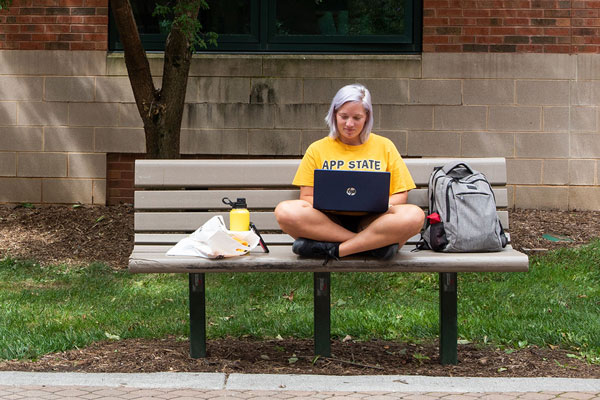
App State co-founder Lillie Shull Dougherty retires. Her son David Barnard Dougherty took over as business manager of the college from 1938 to 1955 and served as vice president of the college from 1955 until 1965.
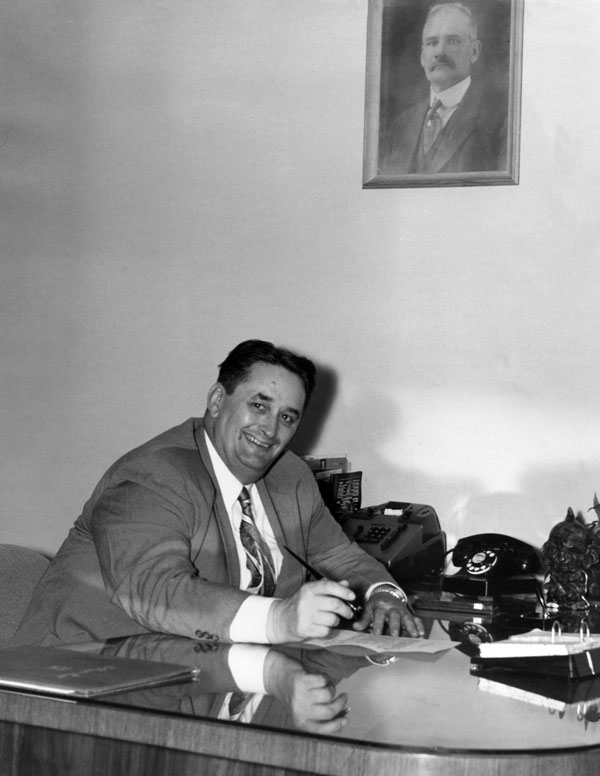
The first graduate courses are offered in Summer School; no degree offered.
Appalachian State Teachers College establishes a Student Council comprising the student body president, five senior class officers, four junior class officers, two sophomore class officers and two first-year class officers. The Student Council was divided into the Women’s House Council and the Men’s House Council, with each having a president and vice president of each dorm, as well as hall monitors. This organization has evolved into the Student Government Association.
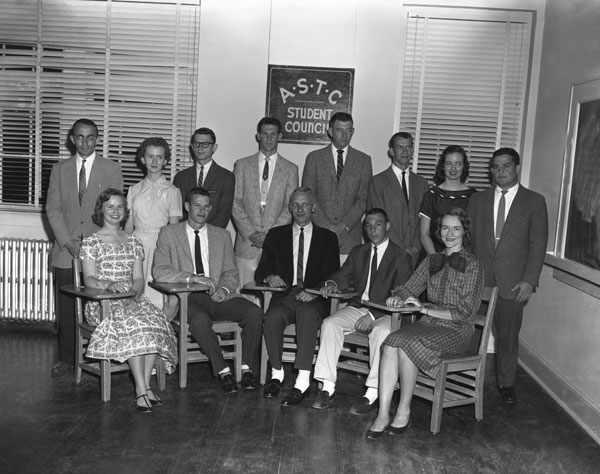
The university’s first marching band forms, directed by music professor Gordon Nash and managed by the Department of Music. They performed routinely at parades and athletics events during the academic year. Today, this band is known as the Marching Mountaineers and is made up of nearly 300 App State students across the university’s different majors.
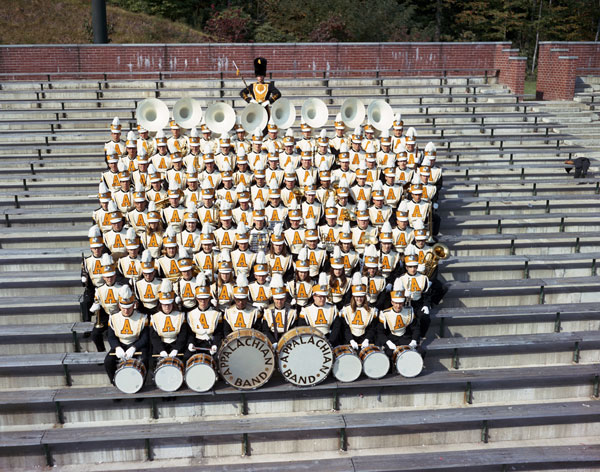
A Music Department is started at Appalachian State Teachers College.
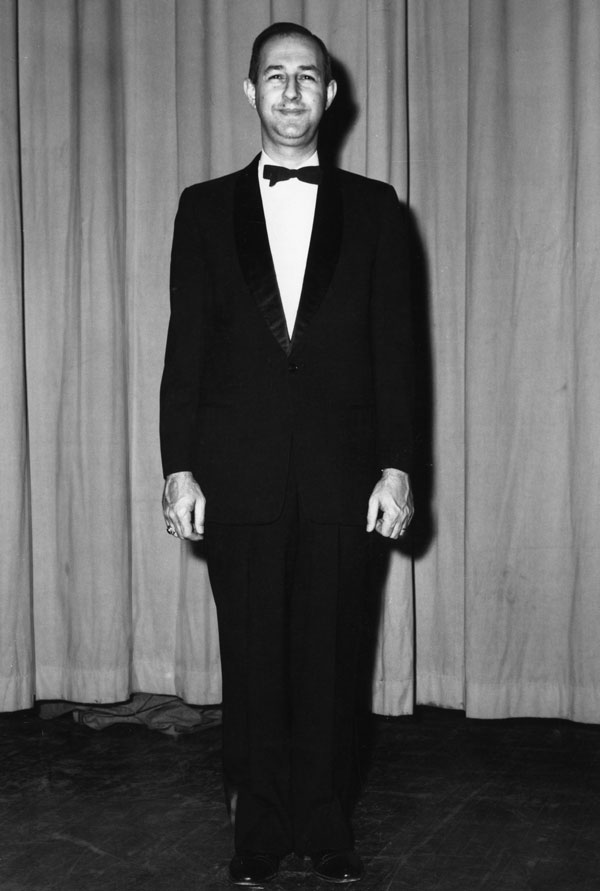
The Baton Twirling Club, later known as the Majorettes, forms.
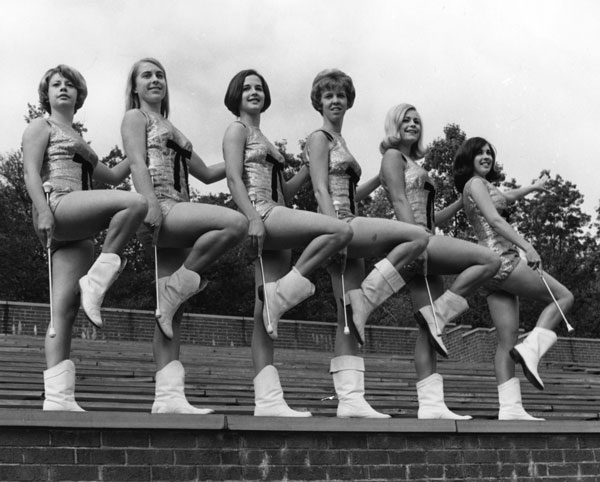
Appalachian State Teachers College is accredited by the American Association of Colleges for Teacher Education.
The first Administration Building is converted into the Home Economics Building. It was demolished in 1967 to prepare for the building of the third and current administration building, the B.B. Dougherty Administration Building, completed in 1968.
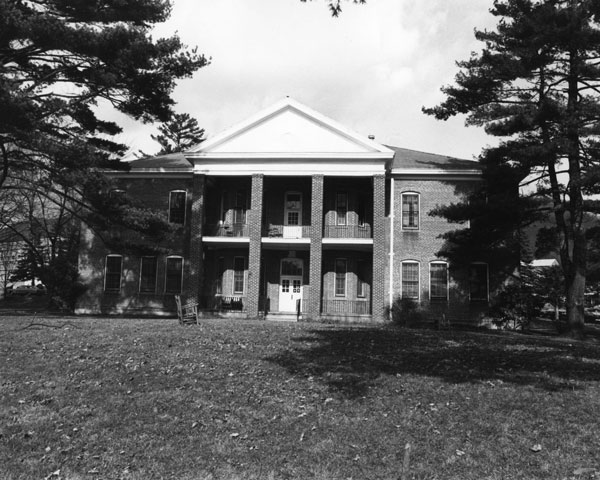
Science Hall, built 1911, is converted into the Fine Arts Building.
Human Behavior grades for students are established. Grades ranged from one to five, with a five resulting in expulsion from the school. Objections to grades could be brought before the Student Council. Human Behavior grades were dropped in 1955.
A flash flood washes out the tracks of the Tweetsie Railroad between Cranberry and Boone. The railway company decided not to rebuild and switched the remaining line between Cranberry and Elizabethton, TN, to freight travel. No other railroad is built to reach Boone. Learn more about the flood of 1940.
Faculty housing is built on the east side of Rivers Street.
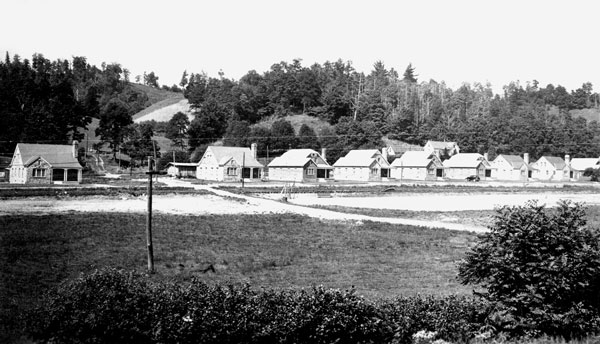
Catherine Morris is elected the first student body president in April.
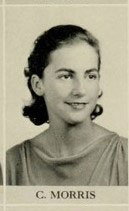
On March 25, Time Magazine publishes an article on App State co-founder B.B. Dougherty, covering his achievements in support of education in Western North Carolina.
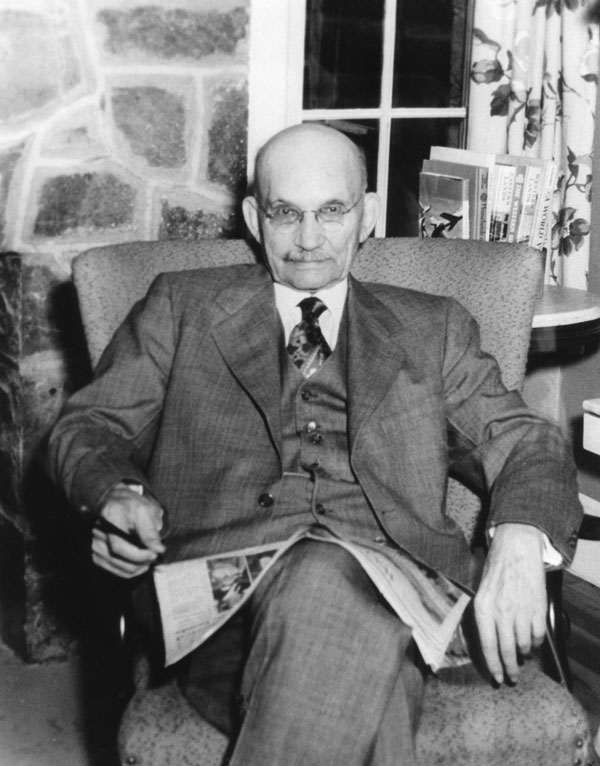
Enrollment reaches 1,212 in the 1940–41 school year.
Lucy Brock becomes chair of the Department of Home Economics in the College of Fine and Applied Arts at Appalachian State Teachers College. She came to Appalachian State in 1938 and served as head of the economics department for 21 years, from 1940 until her retirement in 1961. The university’s Lucy Brock Child Development Laboratory is named in her honor.
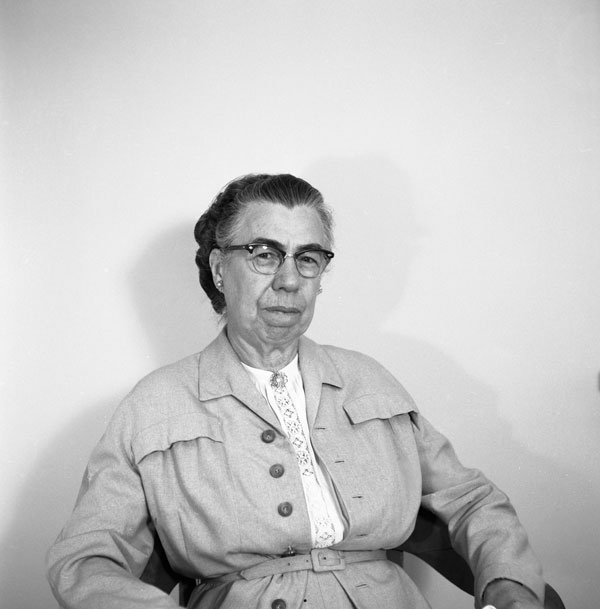
A library science major is offered.
Two Appalachian State Teachers College students and members of the wrestling team — Jimmy Reese and Al Crawford — are drafted into the armed forces during World War II. The U.S. entered World War II in 1941.
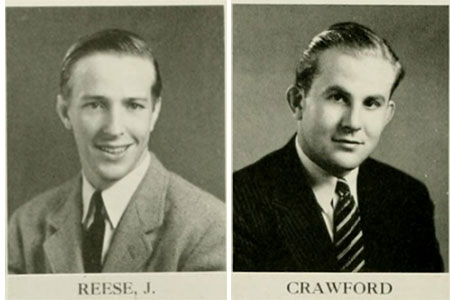
Librarian Emma Moore is in charge of a Boone drive to collect book donations for the armed forces, part of a nationwide program to collect a total of 10 million books.
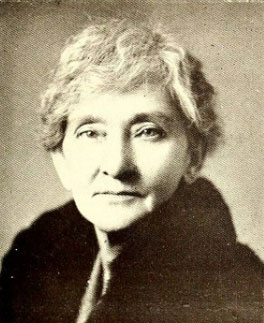
Appalachian Professor Cleone Hodges teaches Red Cross-sponsored training courses in first aid to Watauga County teachers and citizens as part of the governor’s plan to adjust North Carolina public education to aid defense programs.
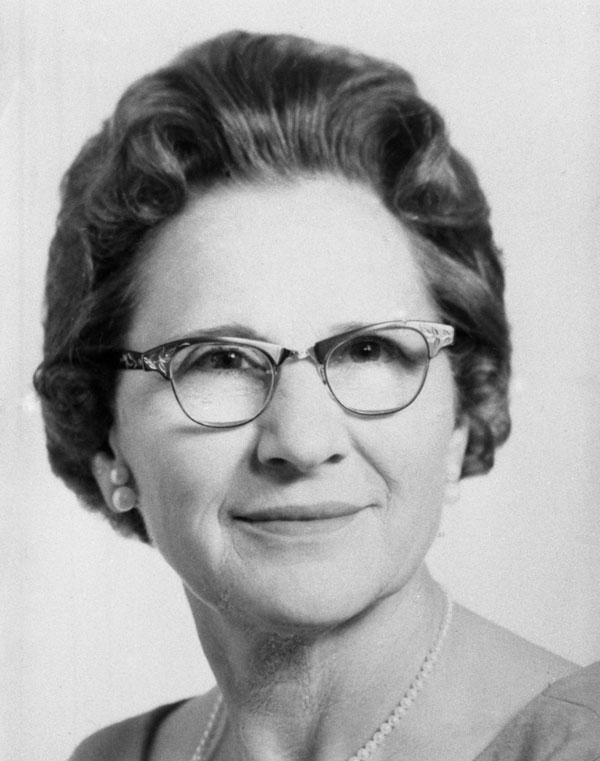
Sugar rationing regulations are announced for the cafeteria. Students were allowed only one teaspoon of sugar in one cup of coffee, refills had to be unsweetened and only one teaspoon of sugar was allowed in a bowl of cereal. Sugar was a primary ingredient in explosive shells, with approximately 2,600 lbs used in each 16-inch cannon shell, or 125,000 spoonfuls.
In March, students form defense squads for Watauga County, including fire protection, utilities repair and fire watchers squads.
Dan’l Boone Yoseff — the first mention of App State’s beloved Mountaineer mascot, now known as Yosef — appears in the 1942 volume of The Rhododendron yearbook. Watch this video to learn more about the history of Yosef.

On March 3, a blizzard hits Boone with a total of 18 inches of snowfall and with drifts up to 10 feet deep, causing classes to be called off the following day and businesses to close. The college resumed classes on the next day. No mail or traffic moved into Boone for the rest of the week.
Graduate courses leading to a graduate degree first offered during the summer. Graduate degrees were obtained through the University of North Carolina.
The D.D. Dougherty Library collection reaches 28,892 volumes.
Appalachian State Teachers College is accredited by the Southern Association of Colleges and Secondary Schools.
Fall enrollment drops by 200 from the previous fall, to 348. There are 38 male students. Seven faculty members are on leave for terms in the armed services. 450 total students were enrolled for the academic year.
The First Founders Day celebration is held on May 8.
W.L. Eury becomes library director, holding the position until 1970. The W. L. Eury Appalachian Collection, housed in App State’s Special Collections Research Center, is named in his honor. The collection, which celebrated its 50th anniversary in 2018, includes books, periodical subscriptions, sound recordings, maps, oral histories, moving images, photographs, ephemera, artifacts and manuscript material covering the Appalachian Region.
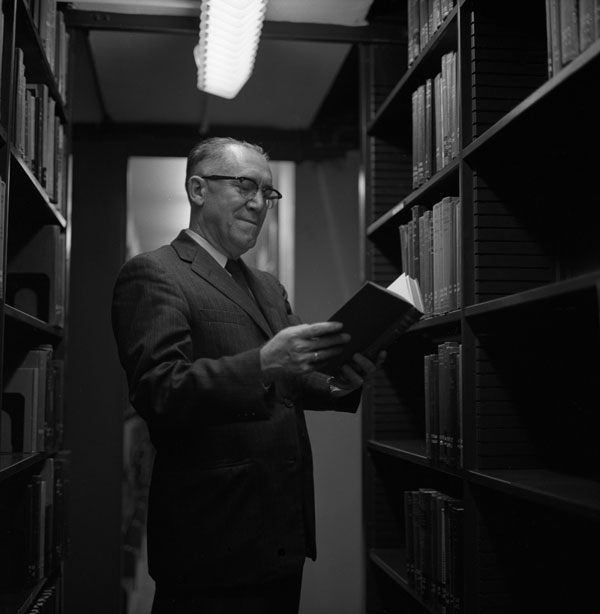
App State co-founder Lillie Shull Dougherty passes away.
Public school music and business education majors are offered.
In the 1946–47 school year, 80% of enrolled first-year students enrolled at Appalachian State Teachers College are attending via the G.I. Bill.
Male students outnumber female students for the first time in the school’s history.
The annual Homecoming football game is reinstated.
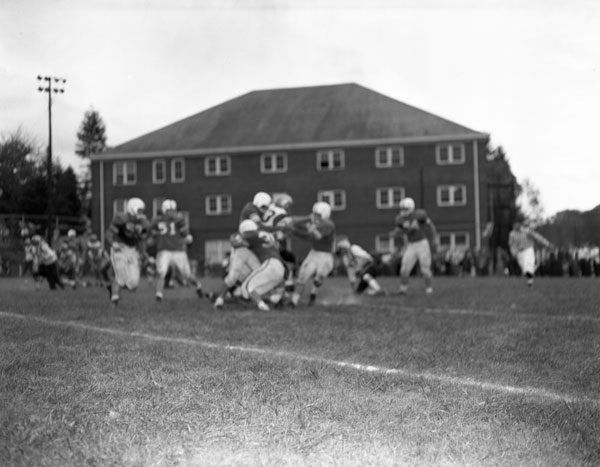
A fire destroys the Watauga Academy and Science Hall buildings on Nov. 22. The fire was reported at 2 a.m. by the college night watchman and was reported to have begun on the second floor of Watauga Academy. The Art and Music Departments were moved to the basement of the Administration Building.
Did you know? The bell that hung in the steeple of Watauga Academy survived the 1946 fire. Today, it is housed in the B.B. Dougherty Administration Building on the Boone campus. Learn more about the history of the Watauga Academy bell.
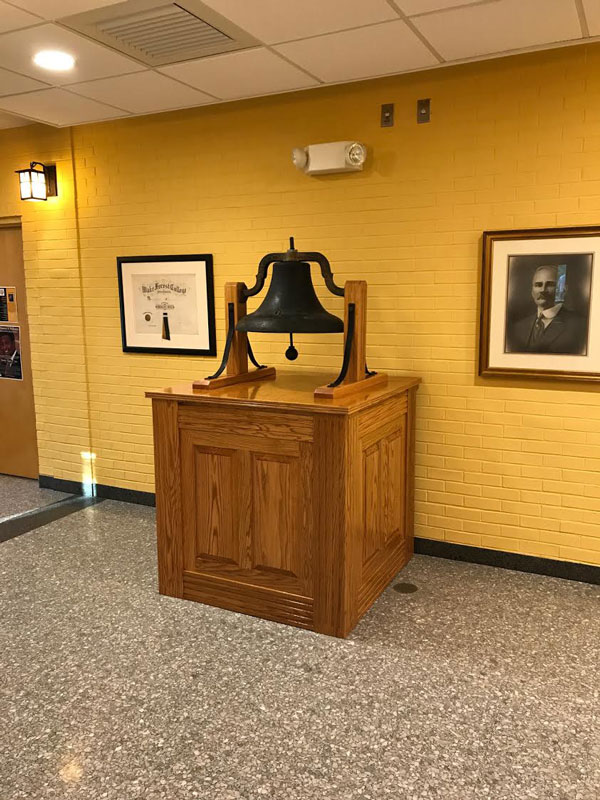
Cratis D. Williams joins the faculty of Appalachian State Teachers College. He would go on to become dean of the Graduate School at App State, which is named in his honor. He served as dean from 1956 until 1975, acting chancellor for Academic Affairs in 1974, assistant chancellor from 1976 to 1979 and interim chancellor in 1979.
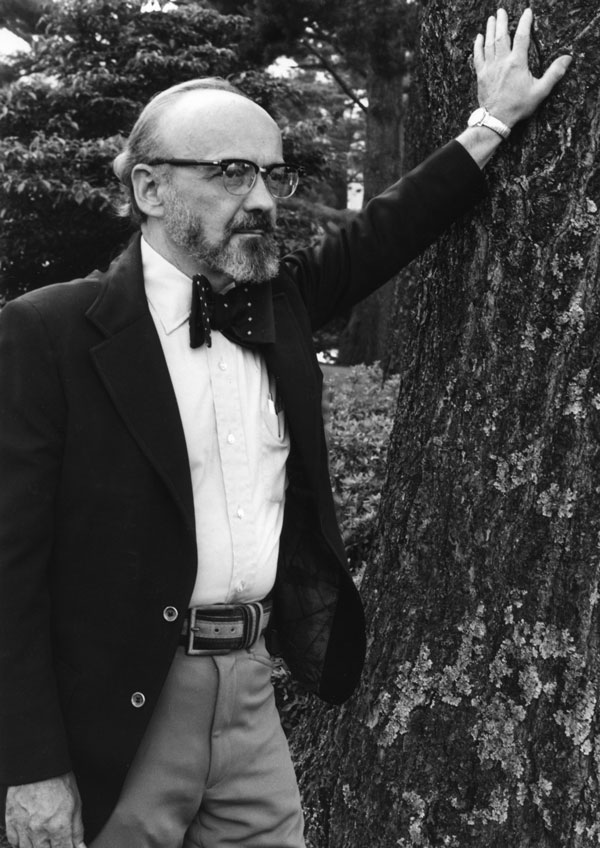
Yosef becomes the official school mascot in January, dropping the second “f” from his name. On Nov. 22, the university sponsored a Mr. and Mrs. Yosef contest. Skills needed for the titles included hog and chicken calling.
An accredited Graduate School is established at Appalachian State Teachers College to offer and award the college’s first graduate degree — a Master of Arts in education. Harold C. Quincy earned the first ASTC master’s degree, awarded in the summer.
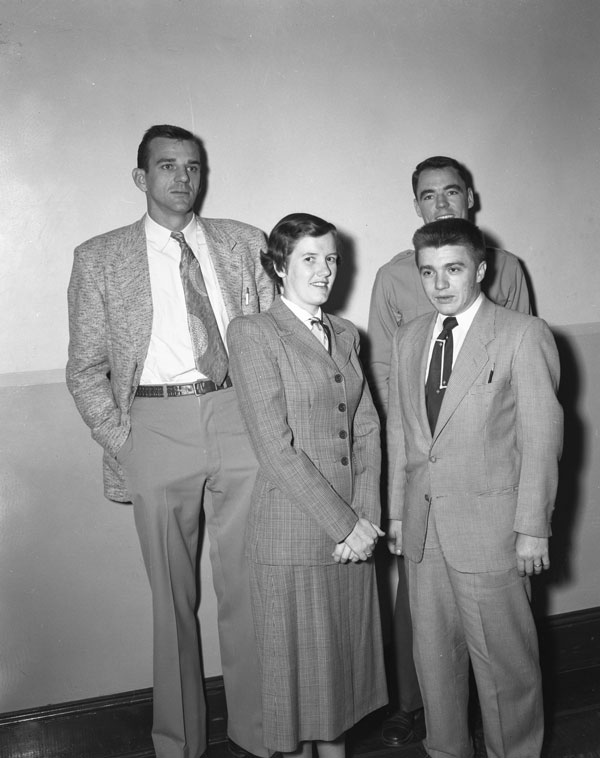
1,100 students enrolled, including 65 faculty and 23 graduate students.
Registered nurse Mary S. Shook is hired as the first full-time nurse in the college infirmary. No doctor was on staff. She provided care for minor injuries and illnesses before the university had a formal Health Services department. Shook retired from the university in the early 1980s. M.S. Shook Student Health Service, a primary care ambulatory campus health clinic for students on the Boone campus, is named after her.
In this video, Shook recounts her 40-year career healing and nurturing Appalachian State University students.

July 7 is decreed as Education Day in Watauga County, in honor of the county’s 100th anniversary and BB. Dougherty’s 50th year as an educator.
In 1949, John Geffrich, a 48-year-old World War II veteran, was one of the first Yosef mascots. Geffrich helped establish a lineage of male undergraduates portraying a bearded man with coveralls, a pipe and a straw hat. The addition of a musket and a black and gold pickup truck called the “Yosef Mobile” came along through the generations of Yosef.
586 graduate students enrolled in Summer School — 338 in the master’s program and 248 for certification renewal.
Campus laundry facilities are completed in the Services Annex Building. University Laundry handled services for departments and residence halls. It ceased operation in the early 1990s.
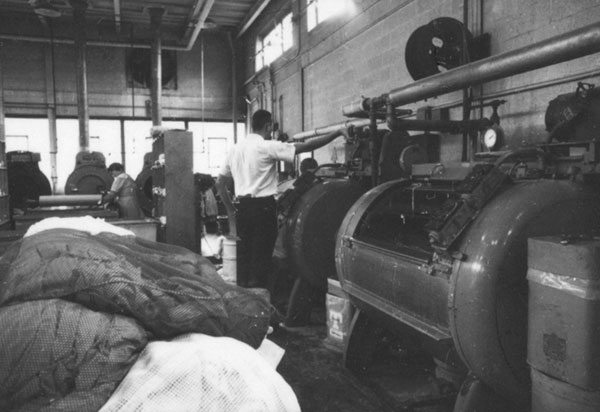
Take a trip back in time by watching this 1950s promotional video for Appalachian State Teachers College (ASTC). The video shares some ASTC history and introduces viewers to notable staff members of the day, including Dr. J.D. Rankin, College President W.H. Plemmons and Vice President David Barnard Dougherty. First-year students Pat Dowling and Bruce Trammell are shown registering for and attending a variety of classes tailored to prospective teachers. Footage from the Homecoming parade and the football game can also be seen. Viewers are given a glimpse into the college reading center, a physics lab, as well as home economics and business classrooms. The video ends with commencement and some aerial footage of the college.
WATA-AM radio station begins broadcasting in Boone on Sept. 24. At the time, WATA was a 240-watt radio station owned and operated by the Wilkes Broadcasting Co. that broadcasted national and local news, sporting events, religious programs, Appalachian High School events, Appalachian State Teachers College events and programs performed by students and faculty at ASTC. The station remains in operation today.
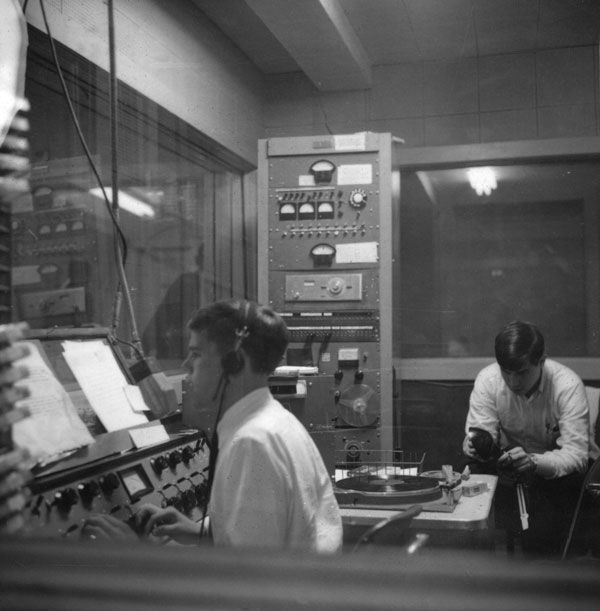
The Fine Arts Building, later named I.G. Greer Hall, is completed.
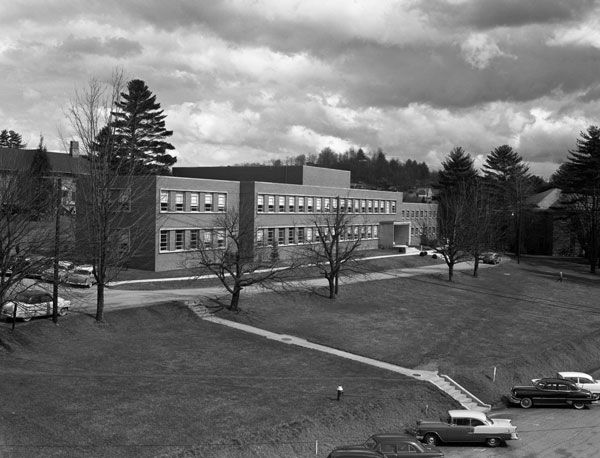
The first non-education graduate degrees are offered, beginning in the 1953–54 school year. By 1953, the Graduate School offered degrees in eight specialized ed majors.
A Graduate Student Club is formed in October.
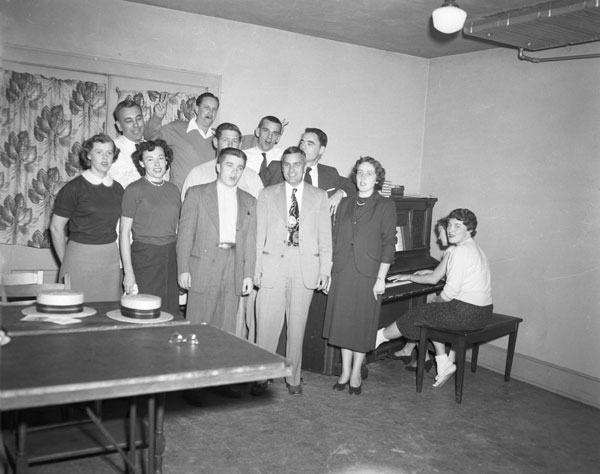
The first convocation is held, welcoming new students to Appalachian State Teachers College.
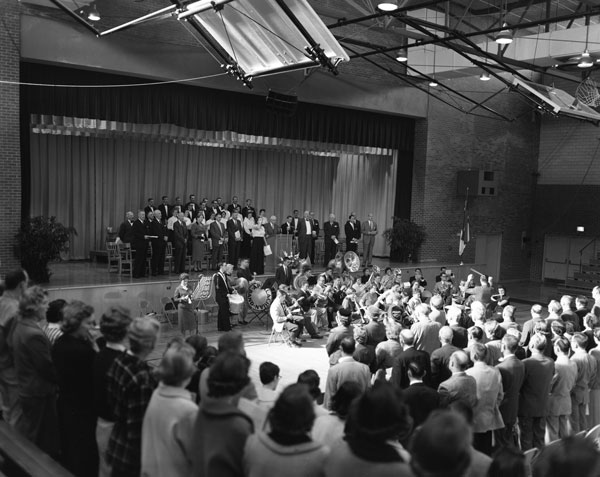
The 2,000th student registers during the spring semester at Appalachian State Teachers College.
After devoting more than a half-century to the university, B.B. Dougherty retires as president of Appalachian State Teachers College in June. Dr. James Daniel “J.D.” Rankin became interim president. Prior to his interim role, Rankin was a professor of English at Appalachian Training School, Appalachian State Normal School and Appalachian State Teachers College from 1921 to 1929, and became dean of the college in 1929. The Rankin Science Building on App State’s Boone campus is named in his honor.
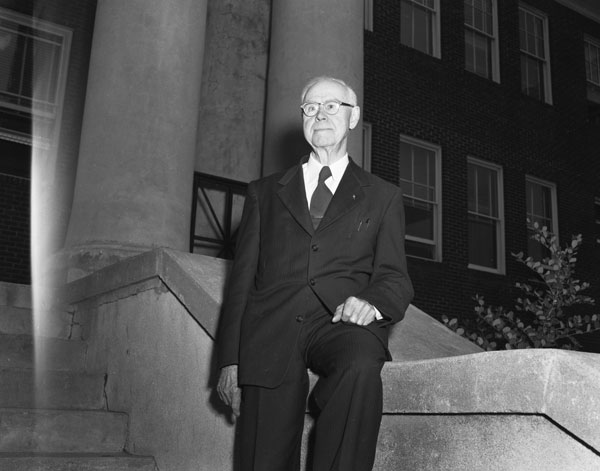
Dr. J.D. Rankin retires as interim president in September. Dr. William Howard Plemmons becomes president of Appalachian State Teachers College. He was known as the “builder president” who coined the phrase “Appalachian Family.”
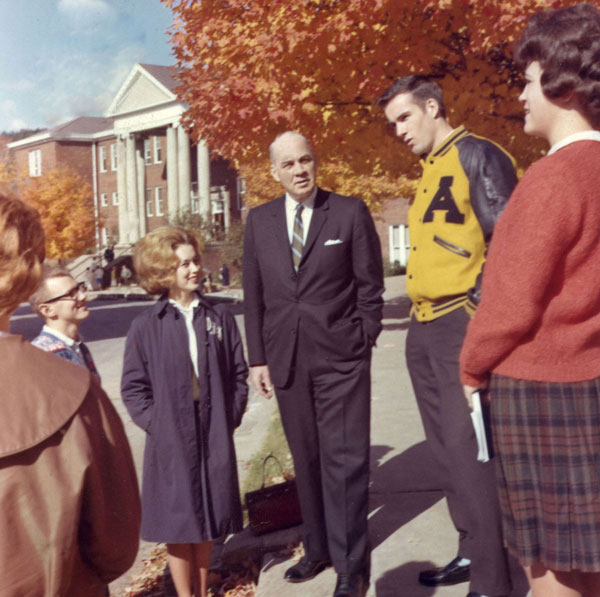
A Traffic Department is established in May. This marked the first registration of student vehicles on the Boone campus. A total of 275 student cars were registered. Women were not allowed to bring cars to campus. Today, the department is known as App State Parking and Transportation.
The official inauguration of Appalachian State Teachers College President William Howard Plemmons was held on April 24 — it was the first such ceremony in the school’s history.
App State co-founder and President Emeritus B.B. Dougherty passes away.
The college infirmary begins administering a three-part polio vaccine to students.
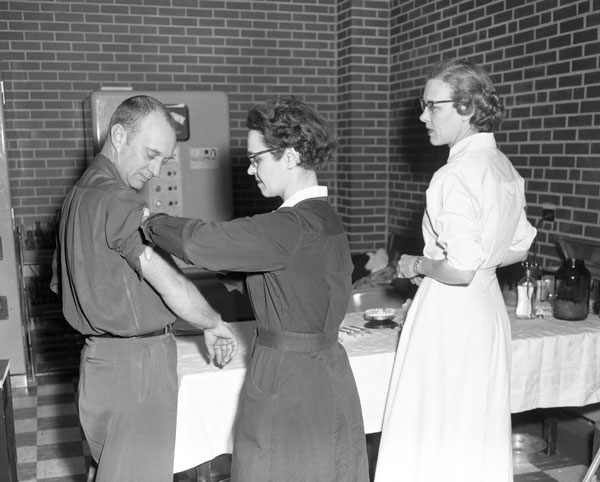
First restrictions on registration: GPA required to be at least 2.0 for unconditional registration.
Dr. Herbert Walter Wey becomes dean of the Graduate School in the 1957–58 school year. He would later become chancellor of App State, leading the institution from 1969 to 1979.
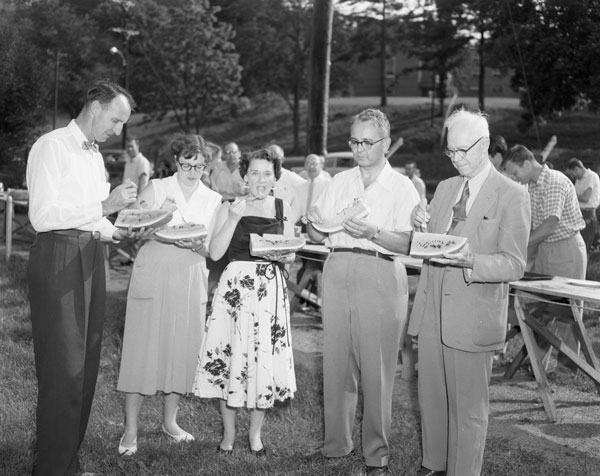
A two-room lounge is added beneath the cafeteria in Welborn Hall, built 1925. One room includes a television and chairs, and the other includes tables for quiet study. Originally built as the university’s first Central Dining Hall, the facility was simply known as “the Cafeteria” from 1938 until 1981, when it was named Welborn Cafeteria in honor of Food Services Manager John W. Welborn. Renovations and additions were made to the building in 1958, 1965, 1968 and 1988. It was demolished in February 2009 after the completion of the new Central Dining Hall.
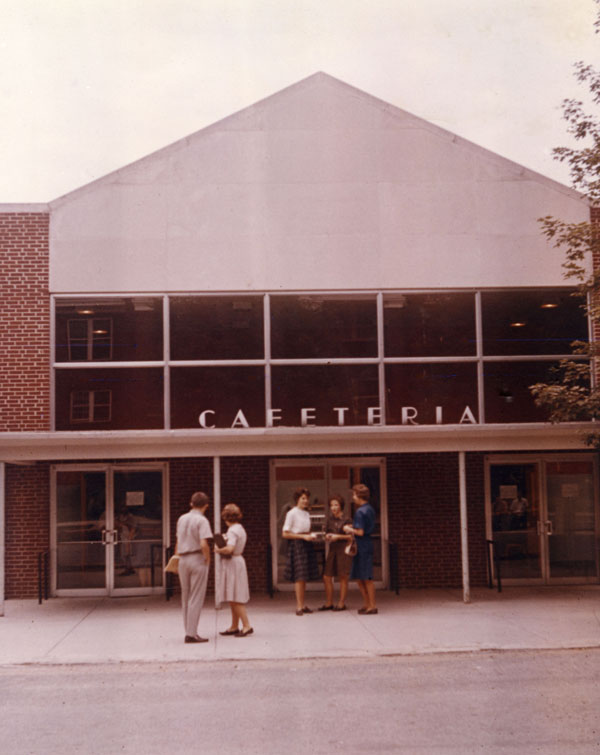
In May, the Men’s “A” Club installs a 7-foot tall Yosef statue in the lobby of the Broome-Kirk Gymnasium.
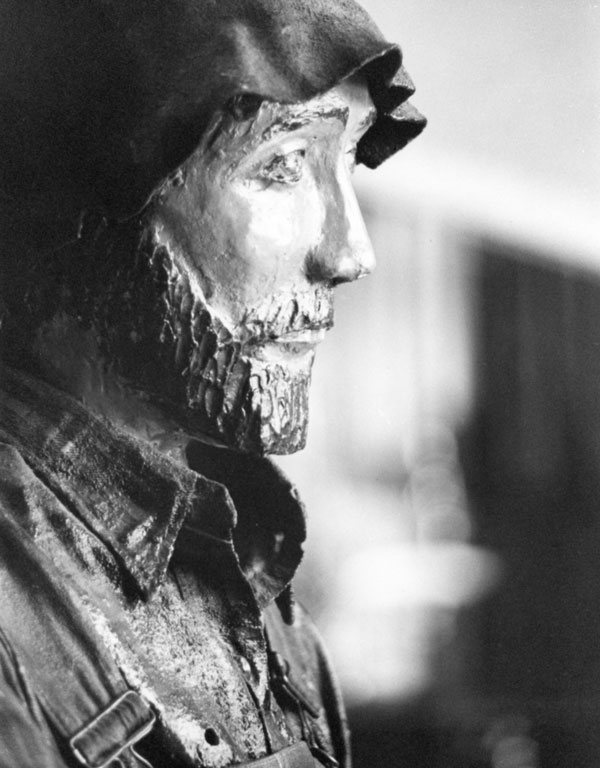
2,140 students enrolled, with 108 faculty at Appalachian State Teachers College.
An industrial arts program is initiated. The program commenced with completion of Kerr-Scott Hall, later named Katherine Harper Hall, in 1961.
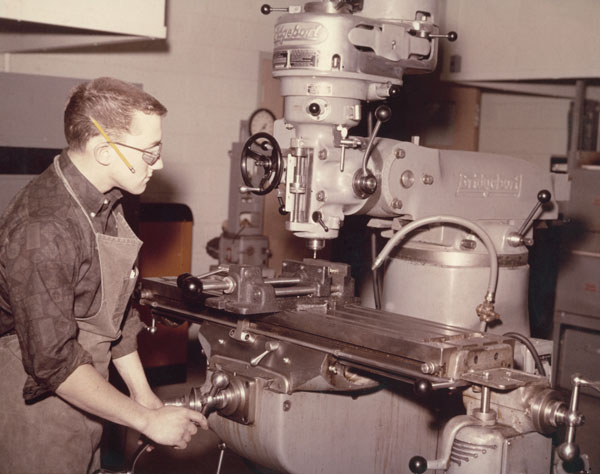
Dr. Cratis D.Williams becomes dean of the Graduate School.
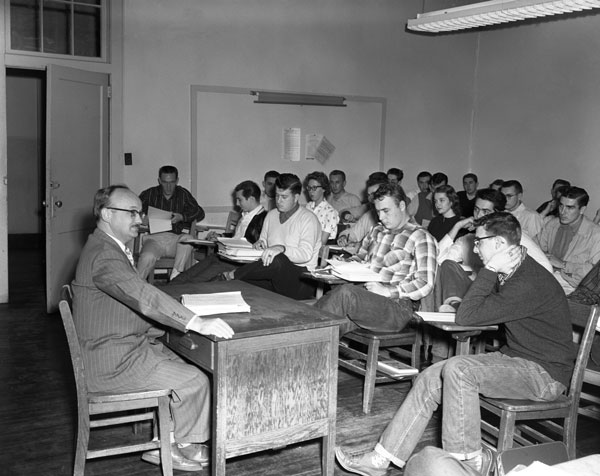
The first language lab is opened in the Department of Foreign Languages. It provided mainly Spanish language materials.
The App State herbarium is established on the Boone campus. Located on the second floor of the Rankin Science West building, this “museum for plants” houses approximately 30,000 plant specimens from the Southern Appalachian Mountains region and around the world.
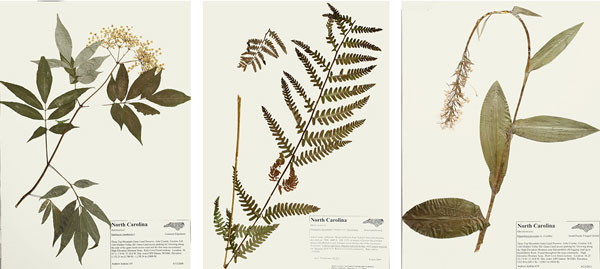
IBM processing equipment is installed and student records are converted to a punch-card system during the summer. Each student was assigned a seven-digit number. The machines were rented from the IBM Corporation.
The football field, known as College Field, is dismantled in February to prepare for construction of the Rankin Science Building. No home games were played during the 1961 season; the four scheduled home games were played in neutral locations. Appalachian High School, also affected by the loss of College Field, scheduled games at local parks. The next home game was played in September 1962, in the new Conrad Stadium.
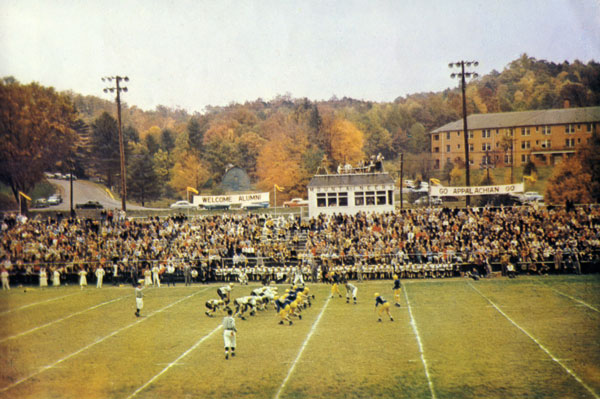
Camp Broadstone, located in Valle Crucis, is purchased for $10 by the State of North Carolina, Watauga County and the newly formed Appalachian School Camp Inc. Appalachian School Camp Inc. was formed to manage the property as an education tool for elementary and high school students, as well as to provide teaching experience in an outdoor setting.
App State still operates Broadstone today, with the multifaceted outdoor education facility serving students, faculty and staff, as well as the greater region of Western North Carolina.
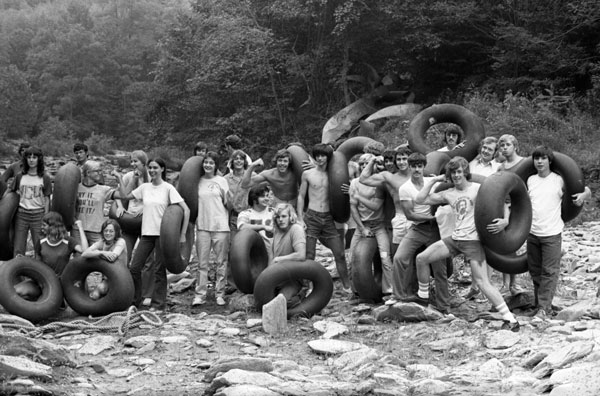
Conrad Stadium, now known as Kidd Brewer Stadium, is completed and opens in September. Named for former university trustee William J. Conrad in 1988, the stadium initially had 10,000 seats. The Owens Field House was constructed adjacent to the stadium, and the stadium was rebuilt in 1979.
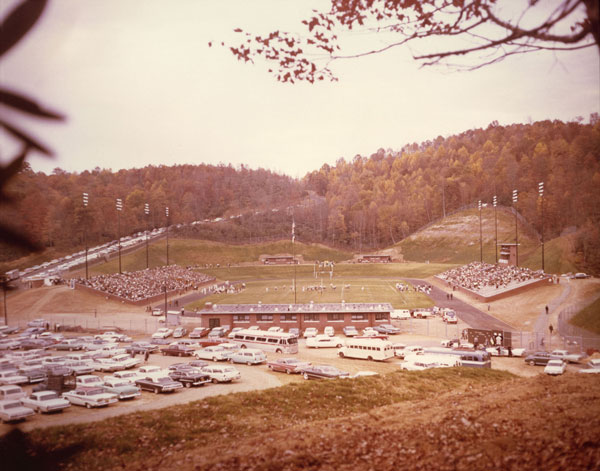
Pre-registration using IBM computers is instituted for summer and fall registration for sophomores, juniors and seniors. First-year students and students not receiving complete schedules have to register in person.
B.B. Dougherty is named to the North Carolina Education Hall of Fame. Dougherty served as co-principal of Watauga Academy from 1899 to 1903, superintendent of Appalachian Training School from 1903 to 1921, and president of Appalachian State from 1921 to 1955. During his early term at Appalachian, he taught English and pedagogy and served in numerous capacities on state boards and commissions.
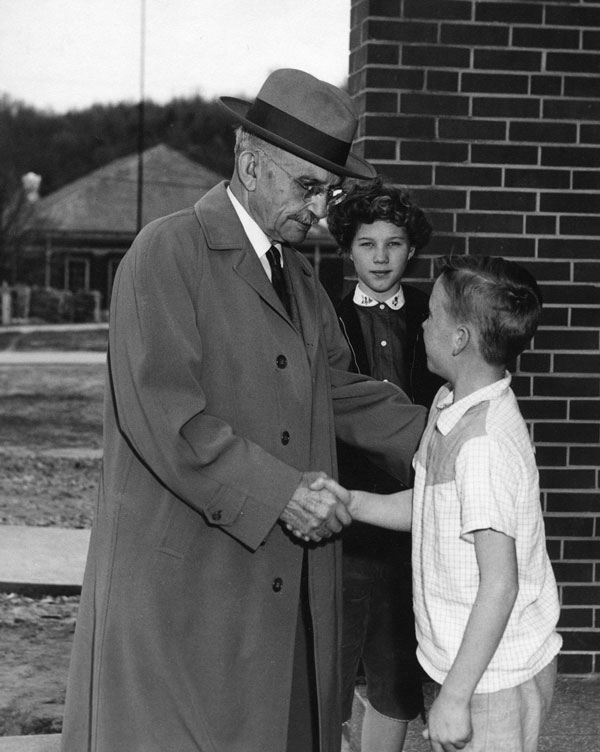
The graduate curriculum is revised in the 1962–63 school year, with the Graduate School awarding 245 degrees.
Rankin Science Building is completed and dedicated to Appalachian State Teachers College Dean Emeritus James Daniel “J.D.” Rankin. An addition to the building was completed in 1970. The building was demolished in 2003 and the new Rankin Science North was completed the same year. Today, the Rankin Hall Science Complex consists of Rankin North, South and West.
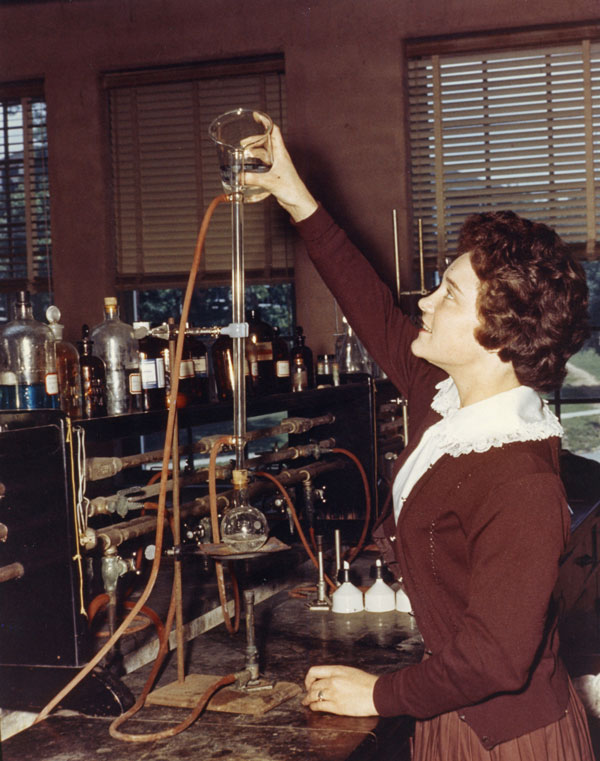
68 undergraduate courses are offered, with 107 courses total at all levels.
In October and November, Rankin Science Hall holds evening open houses on Tuesday and Friday nights to allow students, faculty and staff use of the observatory to view stars, visible planets and the moon.
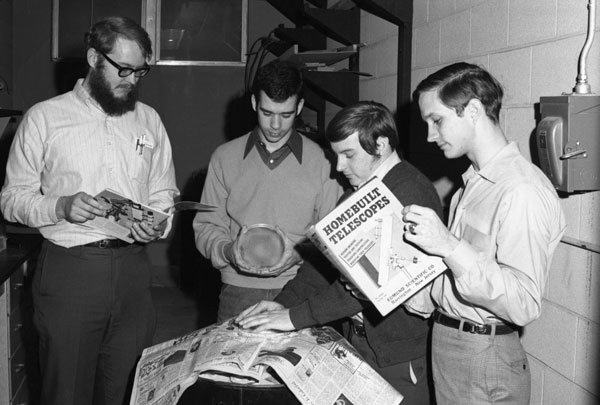
Lucy Brock Nursery School opens. This school is now known as the Lucy Brock Child Development Lab, named in honor of Lucy Brock, who was chair of the university’s Home Economics department in the 1940s. The full-day, NC-licensed program, housed in App State’s Reich College of Education, provides high-quality care for young children five years and younger and serves as a model and professional preparation site for individuals working with young children.
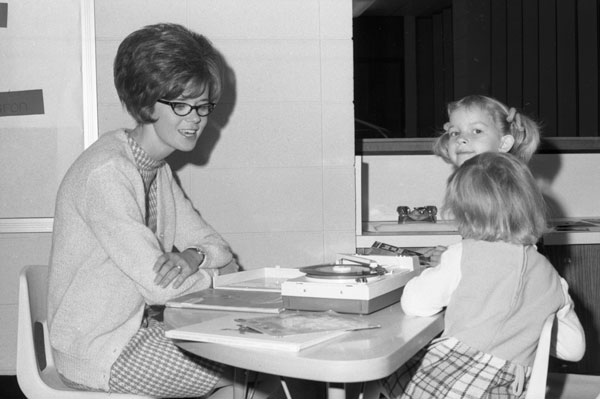
Non-teaching degree programs are activated.
The Department of Social Studies separates into the Departments of History, Political Science, Geography and Geology, and Sociology.
Edwin Duncan Hall is completed. Currently, the nearly 98,000-square-foot facility is undergoing a $27 million renovation, with a goal of improving and adapting the space to current and future programming needs — which includes offering more technologically advanced classrooms.
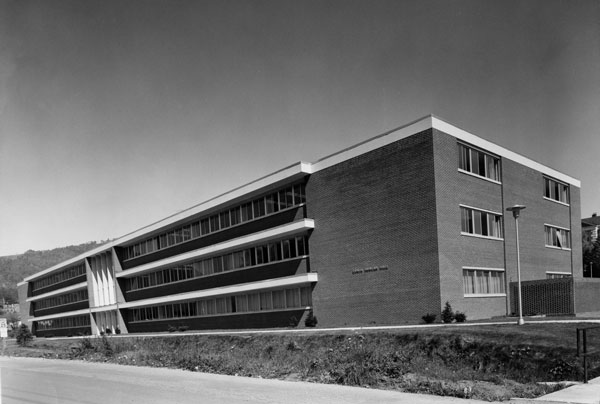
Appalachian High School merges with the newly created Watauga High School. The building was renovated and renamed Chapell Wilson Hall, reopening in 1966.
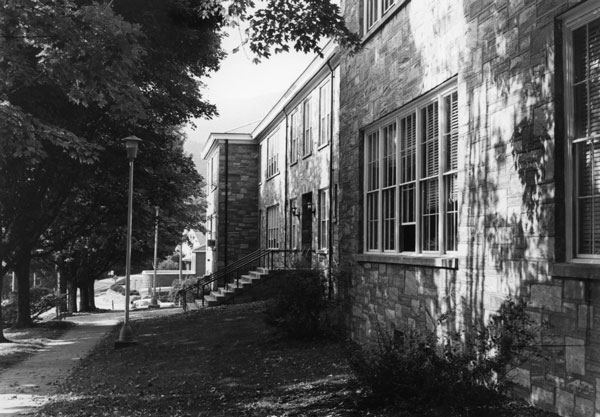
The Second Administration Building is destroyed by fire on Dec. 29. The fire destroyed The Appalachian newspaper offices, the president’s office, student records, financial aid records and several faculty and departmental libraries and records. Student and financial records were reconstructed from other offices’ records.

The Appalettes reform as a precision dance group, performing dance routines in parades, pep rallies and other campus events. Formerly known as the Mountaineer Marching Team, the Appalettes began as a drill team directed by Appalachian High School Band leader Perry Watson and was comprised of women college students.
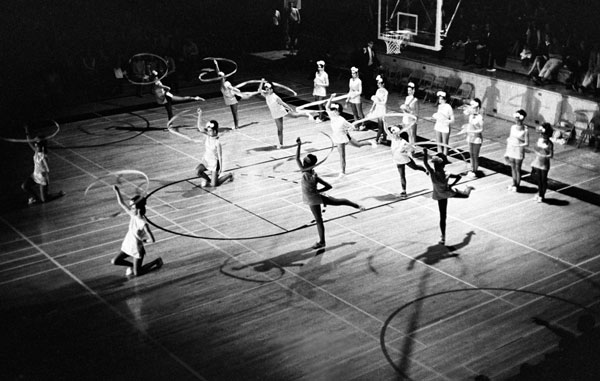
Appalachian State Teachers College receives full university status from the state legislature, with its name changing to Appalachian State University, effective July 1, 1967.
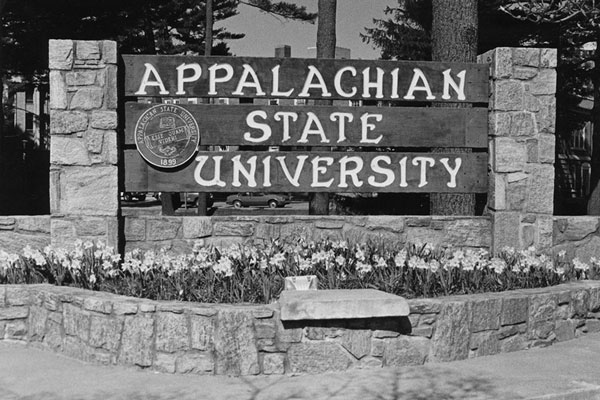
Freshman Seminar began. This is now known as the First Year Seminar program, offered through University College. In small, seminar-style classes, students in First Year Seminar practice thinking critically and creatively, communicating effectively, developing intercultural competence and developing information literacy competence.
Plemmons Student Union is completed and named in honor of App State’s second leader, Dr. William H. Plemmons. Known as the College Center and located centrally on the Boone campus, the facility’s purpose was for students to have a place on campus where they could socialize outside the classroom. Some of the amenities inside the new student union included eight bowling lanes, 10 billiard tables, a ping pong area, a music listening area, a crafts area, and a game area. The union was the first building on campus to be fully air conditioned. Learn more about the history of App State’s Plemmons Student Union.

The Gold Room at App State provided leisurely dining, specializing in steak and seafood. Located in Plemmons Student Union, the Gold Room operated from 1967 (when the union was completed) until 2000, when it was replaced by the Blue Ridge Cafe. The space is now occupied by McAlister’s Deli.
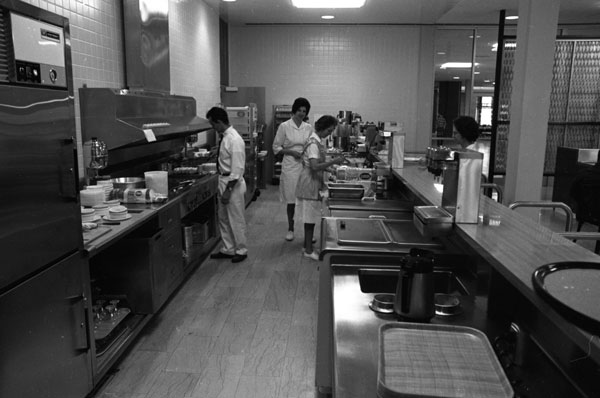
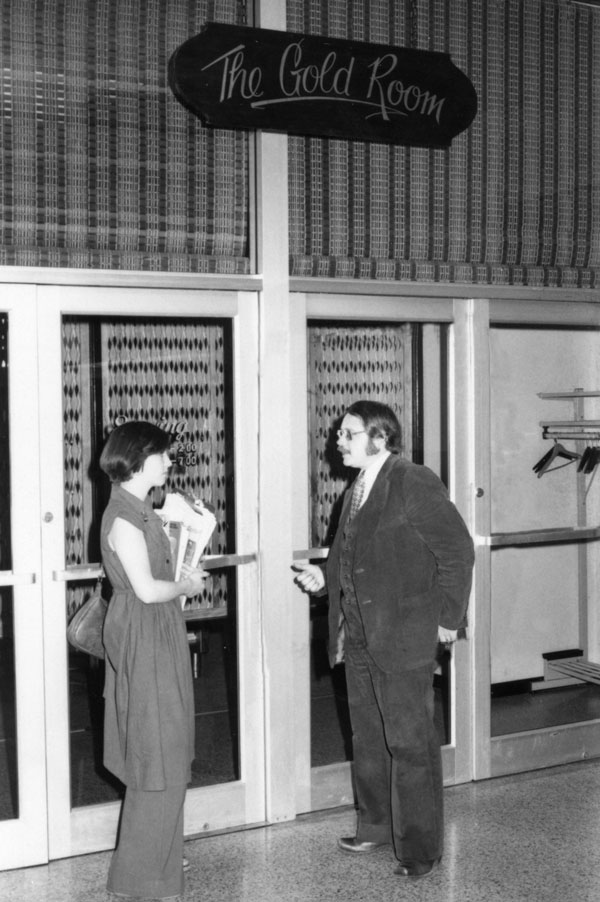
The Appalachian State University administration considers filling in Duck Pond to create more parking spaces on the Boone campus. We bet the ducks are glad they didn’t!

The Appalachian State University Faculty Senate forms. Today, App State’s Faculty Senate is made up of approximately 50 members from across the university (plus three ex-officio). The senate participates in the formation, implementation and review of university policy, working in close partnership with the chancellor, the provost and university deans.
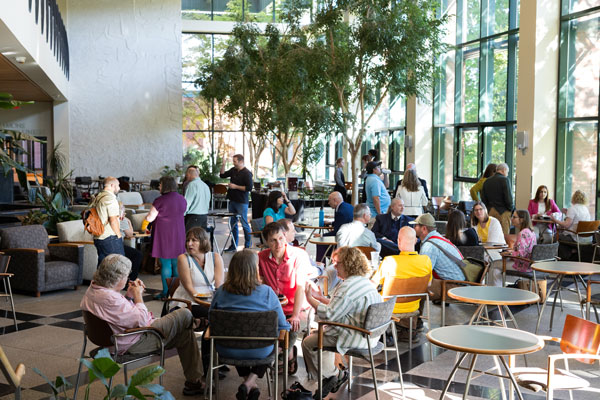
Appalachian State University enrolls 4,939 students, and the university employs 261 faculty.
Appalachian State University withdraws from the Carolinas Conference. From 1928-30, App State football was designated as independent, meaning the school didn’t belong to any conference. Eventually in 1931, the university joined the North State Conference in Division II of the NCAA and stayed there until 1961, when it joined the Carolinas Conference. From 1968-1971, the program became independent once more until 1972, when it joined the Southern Conference, advancing to Division I athletic competitions.
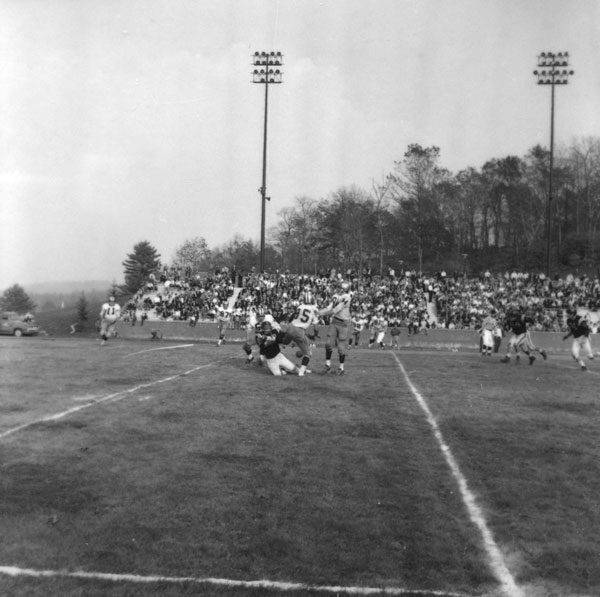
Pre-professional programs are offered in the General College, with interdisciplinary programs for pre-law, pre-medical, pre-dental, and pre-engineering degrees.
The Student Government Association passes a Student Bill of Rights.
Varsity Gym is built, becoming the largest indoor sports complex west of Charlotte.
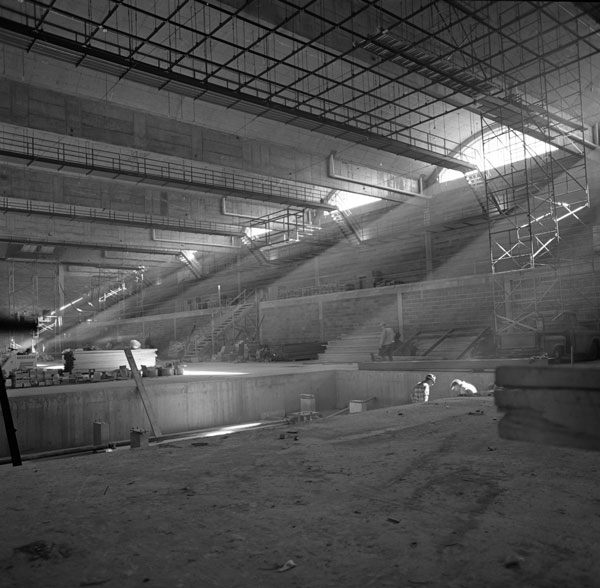
Field hockey begins in 1968 as the university’s first women’s sport. Learn more about the history of women’s athletics at App State.
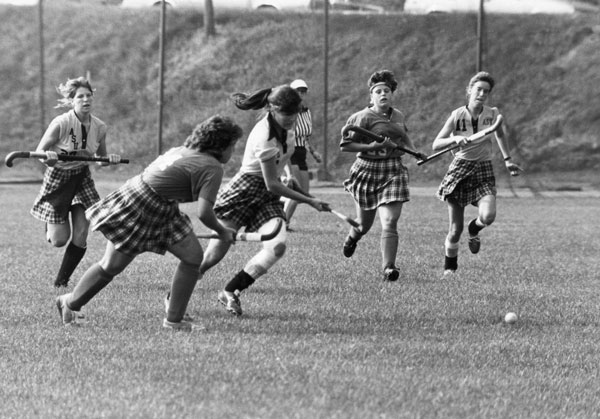
Appalachian State University enrolls 5,200 students and employs 305 faculty.
Three degree-granting colleges — the College of Education, College of Arts and Sciences and College of Fine and Applied Arts — are established, as part of the restructuring of academics that took place with the institution’s transition to a comprehensive university. The App State Board of Trustees appointed three deans to the new colleges in April. Ben Horton was named dean of the College of Education; William C. Strickland was named dean of the College of Arts and Sciences; and Nicholas Erneston was named dean of the College of Fine and Applied Arts.
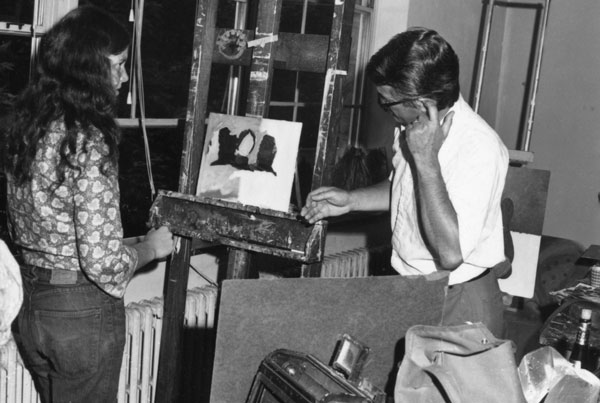
The College Infirmary installs an X-ray machine.
A Computer Center first appears in the university catalog as part of University Services. It housed a UNIVAC 9400 and an IBM 1130. The Computer Center began in 1968 and offered computing support for administrative offices and a laboratory for computer science students.

The Student Health Service expands to include a psychiatrist and a clinical psychologist.
The B.B. Dougherty Administration Building is completed at the site of the first Administration Building.
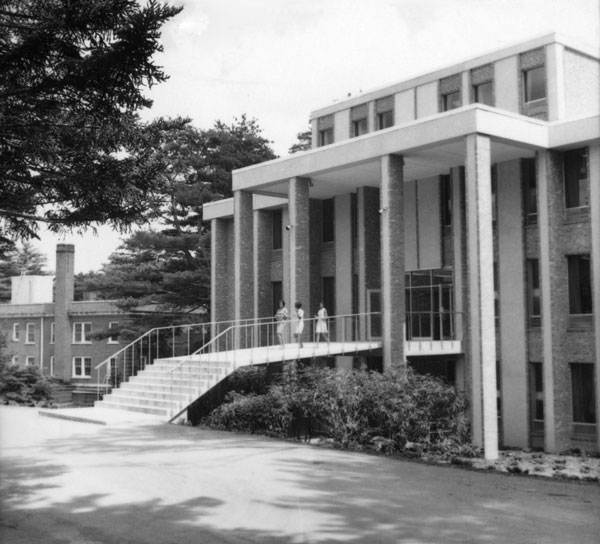
Construction of the first Belk Library is completed. The library, which was housed in what is known today as Anne Belk Hall, opened in 1969, replacing D.D. Dougherty Library as the main Boone campus library. It served in this capacity until 2005, when it was replaced by the current Belk Library and Information Commons. The old Belk Library was renamed the Library Classroom Building, and in 2009, it was rededicated as Anne Belk Hall.
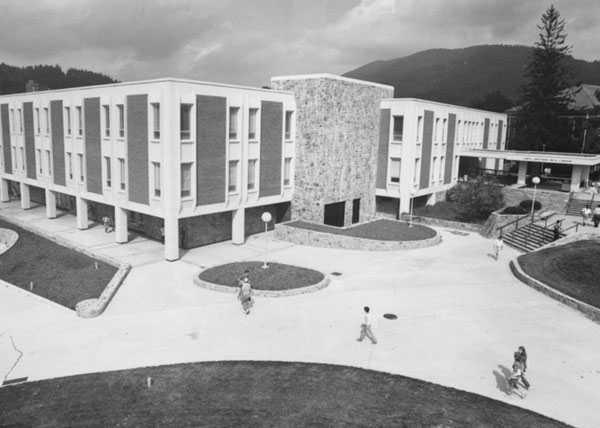
The W.L. Eury Appalachian Collection is founded. The collection, housed in what is known today as the Special Collections Research Center at App State, is a comprehensive, multidisciplinary repository that includes books (both circulating and rare), periodical subscriptions, sound recordings, maps, oral histories, moving images, photographs, ephemera, artifacts and manuscript material concerning the Appalachian Region.
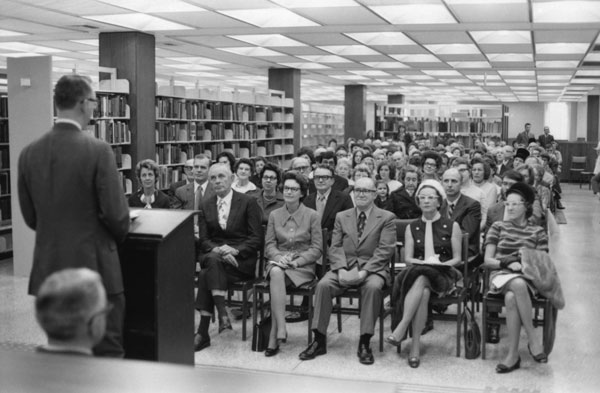
The Charles E. and Geneva S. Scott Scottish Rite Communication Disorders Clinic is established. Today, the clinic serves children who have speech and language disorders that are primarily behavioral or developmental in nature. It also serves adults with behaviorally-based communication disorders. This story shares how the clinic’s speech-language pathologists helped a young client find and develop their voice.
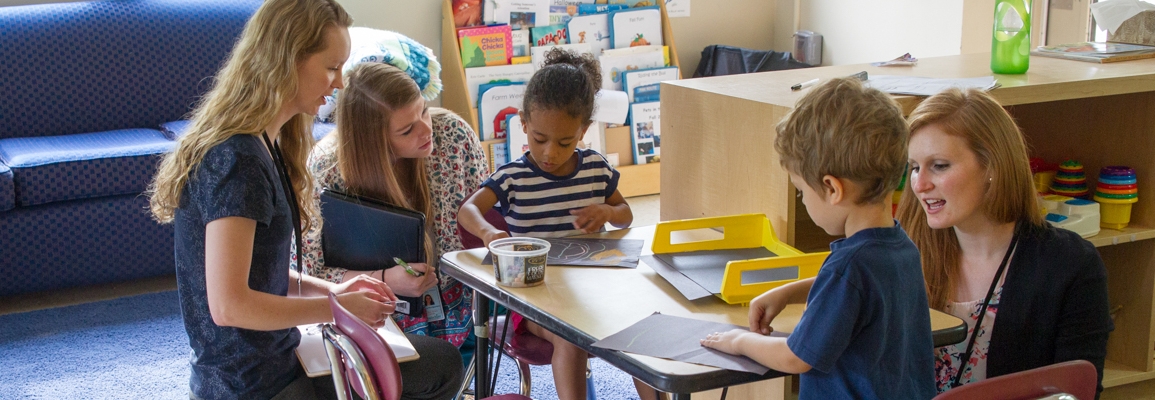
American boxer and civil rights activist Cassius Clay, aka Muhammed Ali, speaks at Varsity Gym on Sept. 18 on Appalachian State University’s Boone campus.
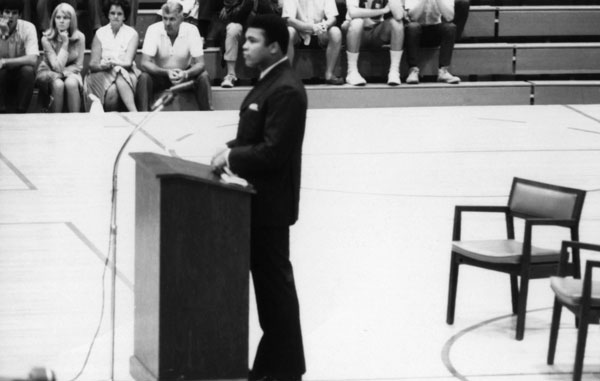
The Reserve Officers’ Training Corps (ROTC) program and Military Science Department, housed in the College of Fine and Applied Arts, begin at Appalachian State University in the fall semester. ROTC offers two-year programs in leadership and military training with no obligation of future military service, and an additional two-year program that results in a commission as a second lieutenant in the U.S. Army Reserve or the Army National Guard.
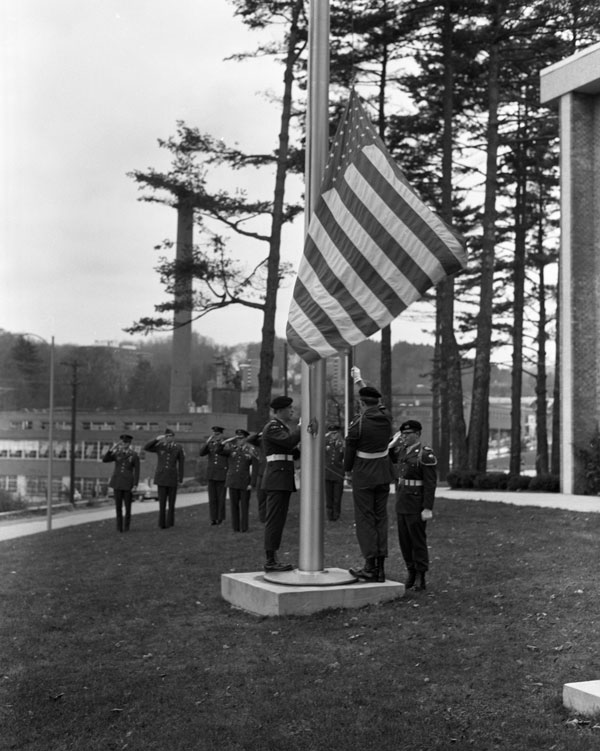
William Howard Plemmons retires as president, and Dr. Herbert Walter Wey becomes president of Appalachian State University. Wey was the first App State leader to hold the title of chancellor at the university and was in office when the university became part of the University of North Carolina System in 1971. He previously served as chair of the Department of Education in 1955, as well as dean of the Graduate School until 1957, when he began working at the University of Miami. He retired in 1979.
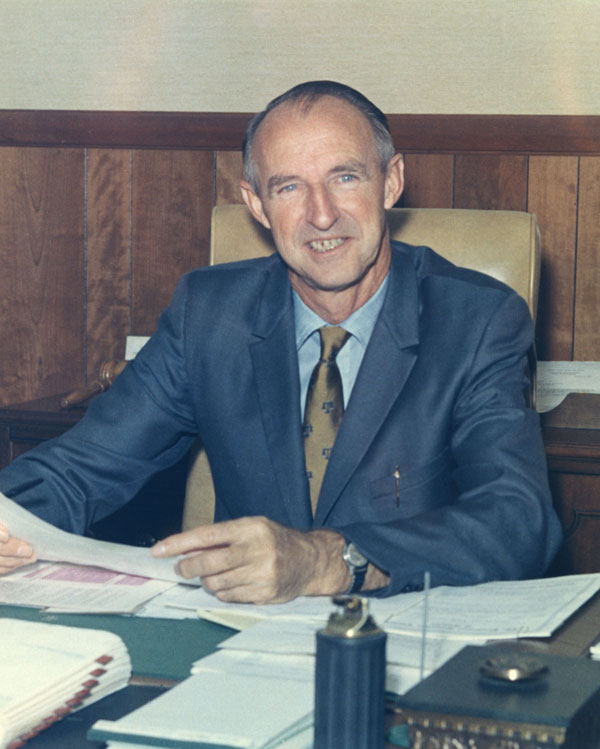
The University Bookstore is completed. The building was located on Locust Ave., facing south, and is now part of the Plemmons Student Union.
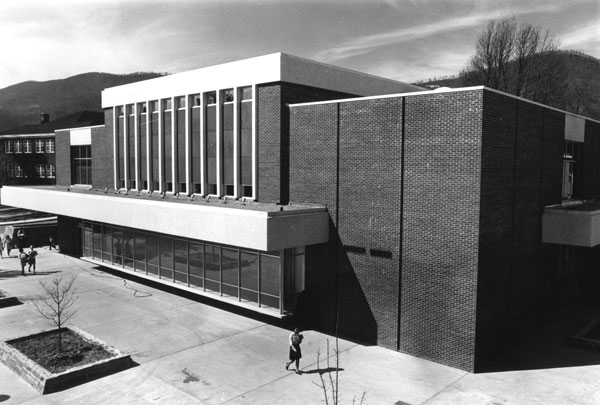
An independent study program and interdisciplinary program of honor studies are introduced, marking the beginning of App State’s University Honors program. In the late 1960s, faculty members began advocating for an honors program, and the first departmental honors program, in English, was founded in 1970. The honors program began in the General College before later moving to Academic Affairs in the late 1980s. In 2008, the program moved to University College. The program was developed into the Honors College at Appalachian State University in 2010, with the approval of the General Administration of the University of North Carolina (now known as the UNC System). In the late 1970s, the University Honors Program began administering the Chancellor’s Scholarship.
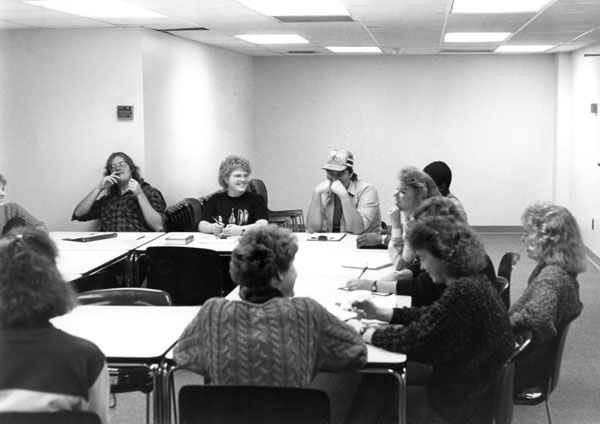
The College of Business is founded. Today, the college is known as the nationally and internationally recognized Walker College of Business, which has the highest enrollment of full-time undergraduate students in the UNC System.
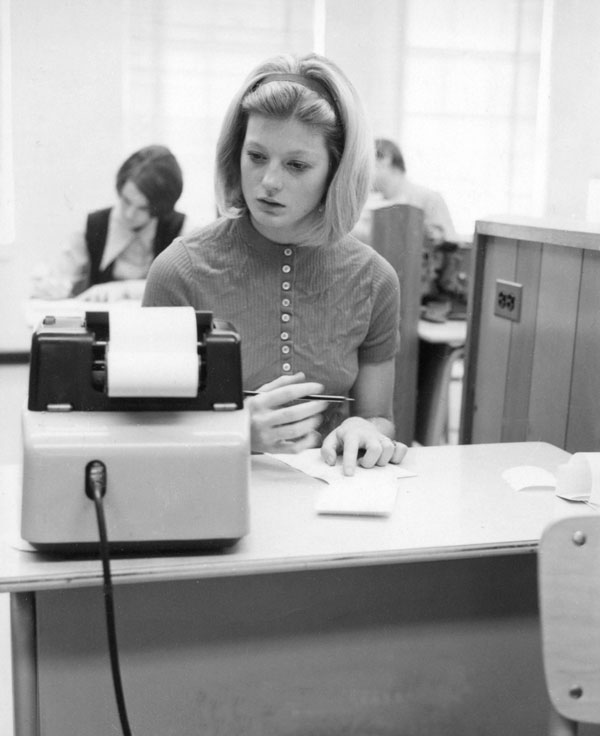
Actress and activist Jane Fonda visits App State’s Boone campus on Nov. 5, speaking on the Vietnam War as part of the university’s Artists and Lecture Series.
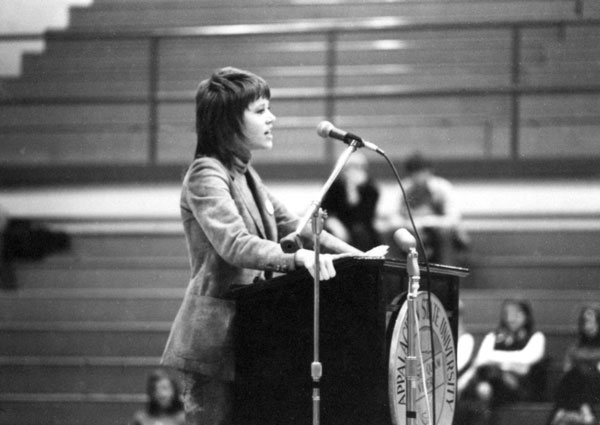
The Faculty Senate chair and student body president sit as participating members on App State’s Board of Trustees.
The Appalachian State University Foundation is established. In its first year, donors gave more than $1 million toward an endowment to supplement educational projects not assisted by state appropriations.
The Campus Post Office is made an official contract station of the United States Postal Service.

The Lighthouse Program is launched in Watauga County Schools. The Lighthouse Program was part of the Appalachian Training Complex, a grant-funded program at Appalachian State University in the early 1970s to examine new methods for teaching students in elementary and high school. The program targeted Western North Carolina public schools with high dropout rates, low attendance and poor facilities, and served as a training ground for interns and education students at App State.
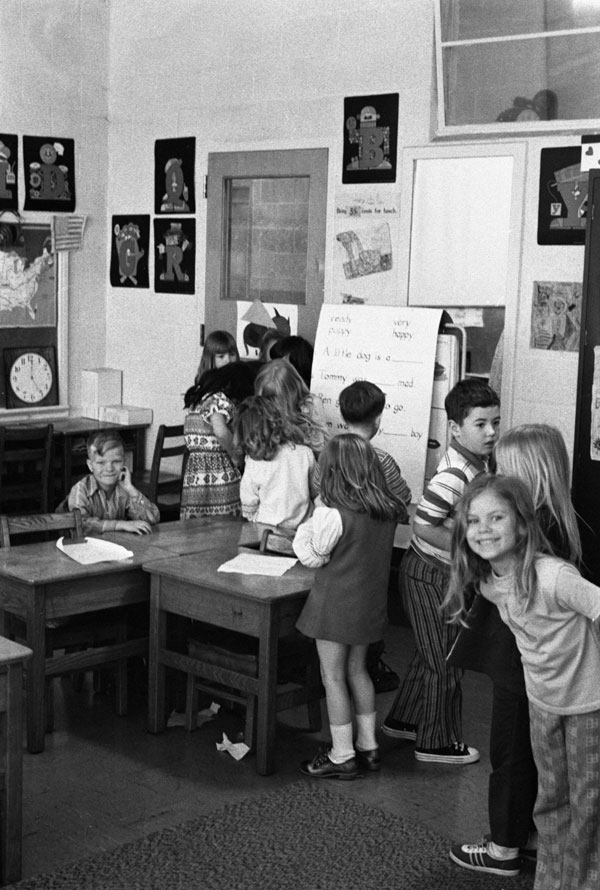
On May 12, Appalachian State University holds a memorial for students killed at Kent State and Jackson State College. It is followed on May 14 by a Student Government Association forum on Sanford Mall to discuss opinions on Vietnam, the invasion of Cambodia, the Kent State shootings and student dissent.
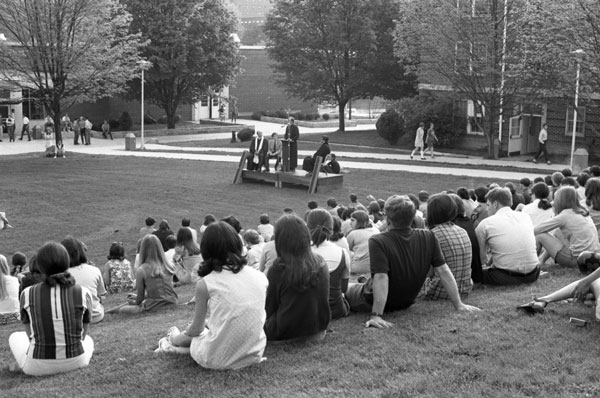
In May, air conditioning is installed in two faculty lounges and offices in Edwin Duncan Hall. Classrooms and offices with exterior windows were not air conditioned.
Appalachian State University becomes part of the newly created University of North Carolina System, with Dr. Herbert Wey becoming the university’s first leader to be called chancellor.
The university offers specialist degrees in biology, educational leadership, higher education and elementary education. The specialist degree was situated between the master’s and doctoral degrees.
The College of Business divides into four programs: Accounting, Business Administration, Economics, and the Department of Business, Economics, and Occupational Education.
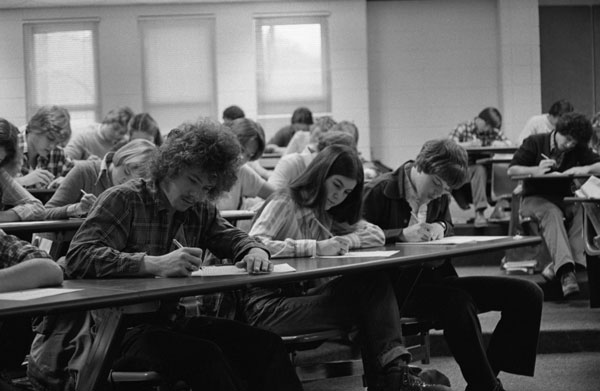
An admissions partnership program is created. Today, App State maintains partnerships with 27 NC community colleges as part of its Appalachian Aspire program, which provides a streamlined path for students enrolled at partner community colleges to complete their bachelor’s degrees at the university.
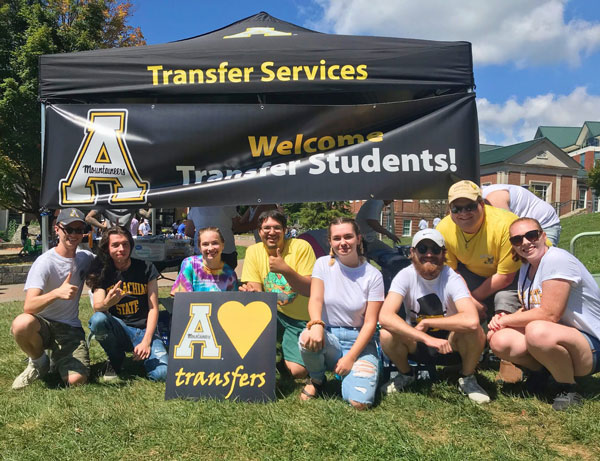
Pre-nursing is added to the offered pre-professional programs in General College. The program offers the first two years of academic education required for a bachelor’s degree in nursing. The additional two years had to be completed at another institution.
The Appalachian Journal debuts. Published by the Center for Appalachian Studies, the interdisciplinary, peer-reviewed journal features field research, interviews and other scholarly studies of topics such as history, politics, economics, culture, folklore, literature, music and ecology, as well as poetry and reviews of books, films and recordings with a focus on the Appalachian Mountains region.
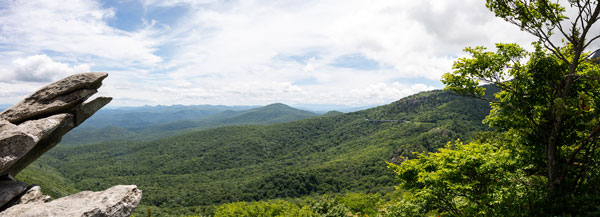
WASU-FM, the university’s radio station, begins broadcasting in April under the direction of the Department of Speech (now the Department of Communication) in the College of Fine and Applied Arts. The radio station broadcasted a mixture of educational programs and entertainment, including jazz, classical and rock music, news and programs from National Public Radio, and App State campus events, with programming focused on student interests.The award-winning, student-operated radio station is housed in the Beasley Media Complex on App State’s Boone campus.
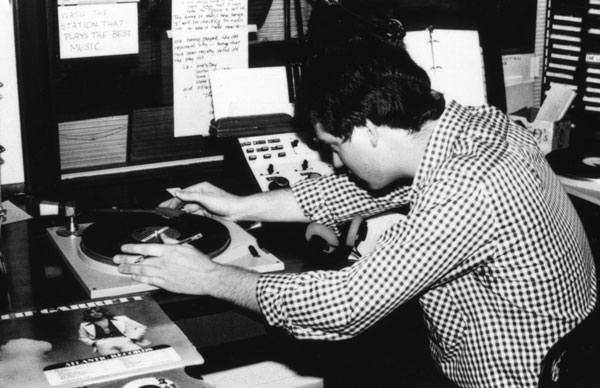
Appalachian Food Services expands the Gold Room and installs an ice cream parlor in Plemmons Student Union in September. The Gold Room provided leisurely dining, specializing in steak and seafood, and was kept separate from other Food Services operations, including the Bavarian Inn, the University Cafeteria, and the Ice Cream Parlor.
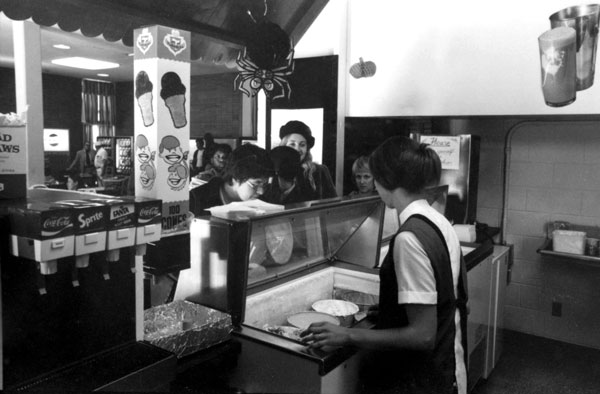
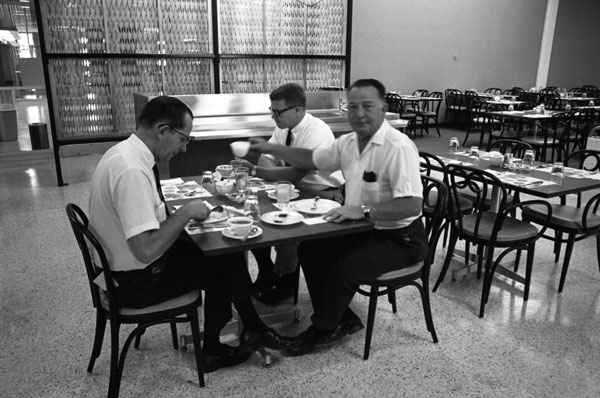
Chancellor Wey dismisses rumors that Appalachian State University will change its name to UNC-Boone.
The first Greek fraternities and sororities are approved at Appalachian State University. Today, App State has about 2,000 students holding membership in 35 campus organizations. Learn about fraternity and sorority life at App State.

The Office of Outdoor Programs is created. Outdoor Programs, part of the university’s Division of Student Affairs, offers outdoor gear rentals at affordable prices and a variety of different outdoor adventures for App State students, as well as faculty, staff and their immediate family.
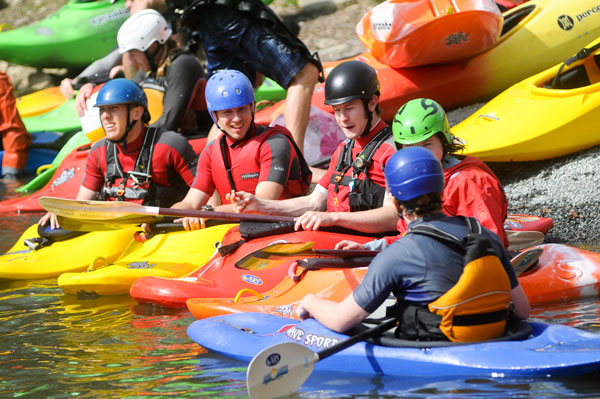
In September, private phones are installed in residence halls for the first time for an estimated 2,100 students. Students are charged $10 each quarter for local telephone service.
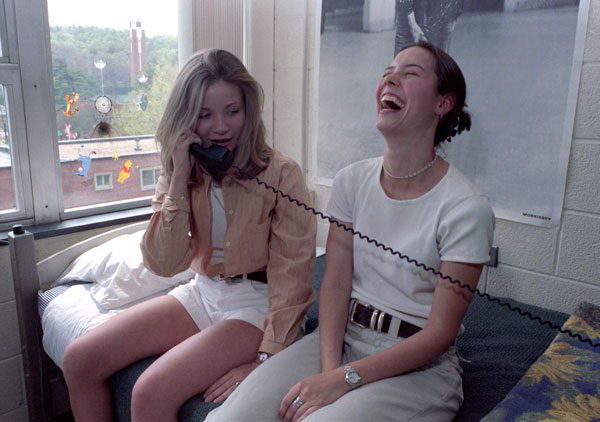
Watauga College is founded as a living/learning residential college, offering the first co-ed housing on campus. Watauga Residential College is a specialized academic program where classes are discussion-based seminars that allow students to pursue topics of interest to them within the context of the class. Classes are interdisciplinary, requiring students to integrate knowledge from a variety of disciplines to gain a complete perspective on a topic. Originally housed in Watauga Hall, the college relocated to East Residence Hall in 1974 and is now housed in the university’s Living Learning Center, which was completed in 2002.
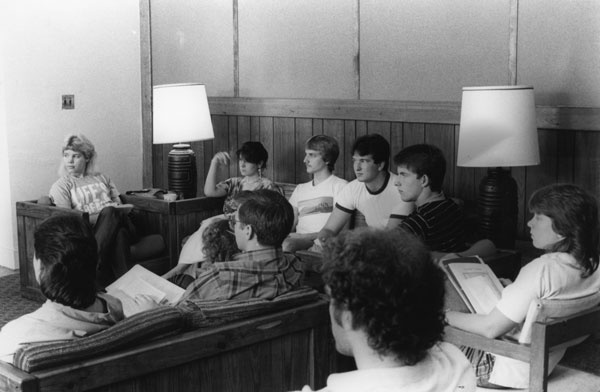
Hardin Park Elementary School opens in Boone, replacing the Appalachian Elementary School. The former elementary school building became home to several academic departments.
The Department of Health, Physical Education and Recreation offers a bachelor’s degree in health education with teacher certification.
A Driver Education Course is built next to Edwin Duncan Hall in June. The Driver Education program first appeared in the Appalachian State Teachers College Bulletin in 1957–58 as a single three-hour certification course for driver education teachers. The more intensive Driver Education Program started at App State in 1973 with a minimum 15 course hours in traffic and safety instruction.
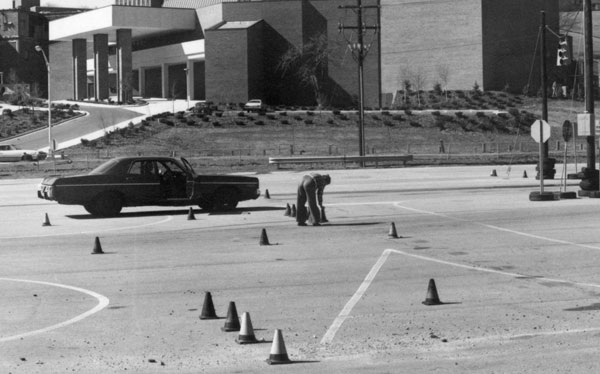
The Broyhill Inn and Conference Center, built 1972, opens. Once located off Bodenheimer Drive on the Boone campus, it housed the Center for Continuing Education and was first known as the Broyhill Building for the Center for Continuing Education. It was demolished in 2017 and is now the site of App State’s Innovation District, which is under construction.
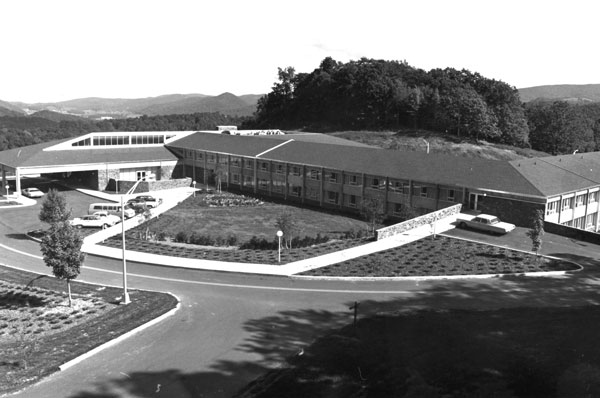
WASU-TV, the university’s first television station, is started by Learning Resources and the Department of Speech. Today, App State’s Department of Communication is home to the university’s award-winning, student-staffed television station, AppTV, which launched in 2015.
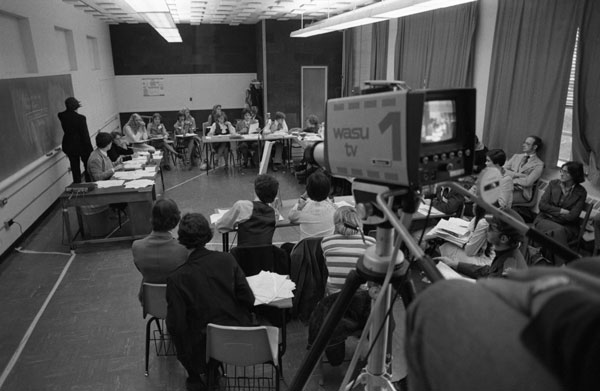
The original 2,250-square-foot App State New York City Loft opens in the Tribeca neighborhood. The NYC Loft project was started in September 1974 by the university’s Department of Art to establish a campus presence in the city and to provide an intensive cultural experience for students.
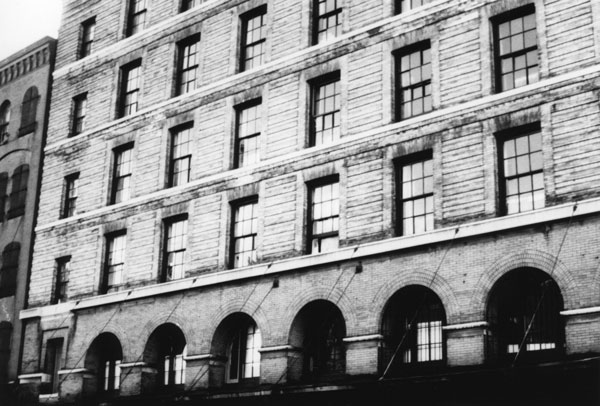
Did you know? App State students established a Center for Woolly Worm Study in 1975 to compare woolly worms of Western North Carolina with 10 year’s worth of regional climatological data, though it’s unclear how long the project lasted. The center was located in the Rankin Science Building on the Boone campus.
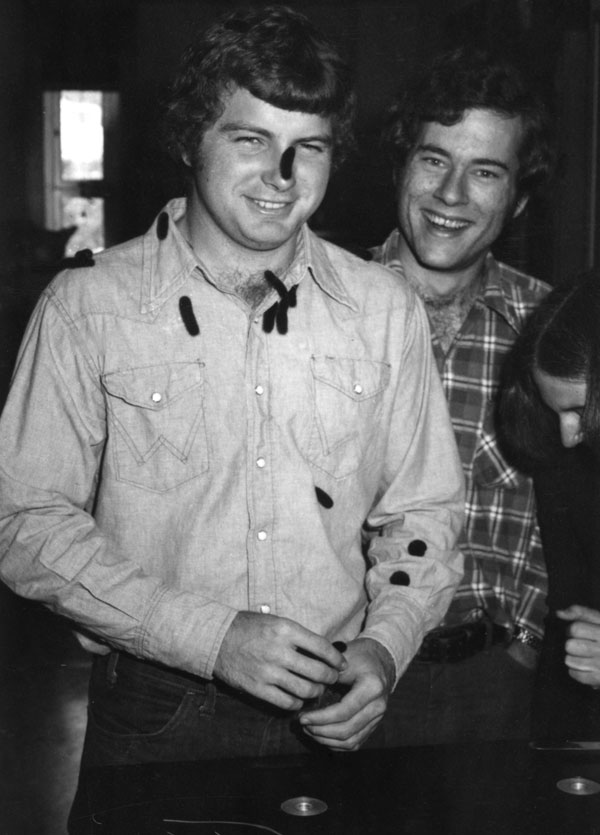
Three pay phones are installed on the Boone campus on January 31.
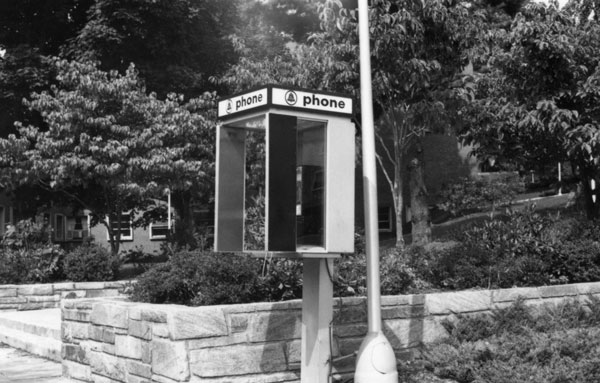
Cold Mountain Review begins publication in May. The literary journal-features work that reflects on eco- and social justice themes and is one of the oldest college literary journals in the country.
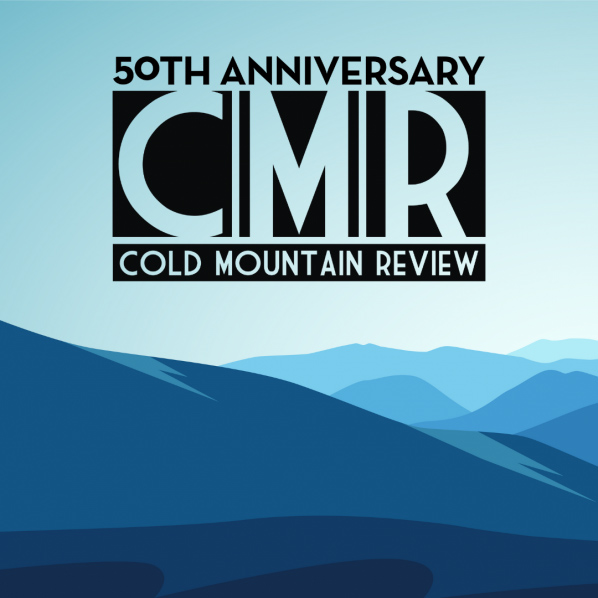
A Women’s Resource Center opens. The center, offered through the Counseling Center, provided support and guidance to women students, as well as women in the local and regional communities, for educational and career development. App State opened a new Women’s Resource Center in Plemmons Student Union in 1998.
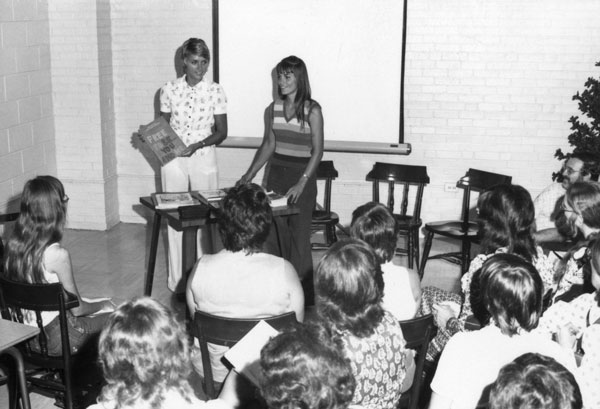
The Student Transit Service (STS) starts on Jan. 9, using a renovated 1959 school bus. The STS transported App State students around campus and to selected locations in Boone, and eventually Blowing Rock. Despite increasing popularity, STS ceased operation in April due to a severe gas shortage in Boone.
A second bus service by the newly formed Community Transit Authority began in December for Boone residents and App State students. Trips were $0.25 per passenger. Service ceased operation in February 1975 due to lack of support.
Today, AppalCART provides transit services to App State students and Boone community members.
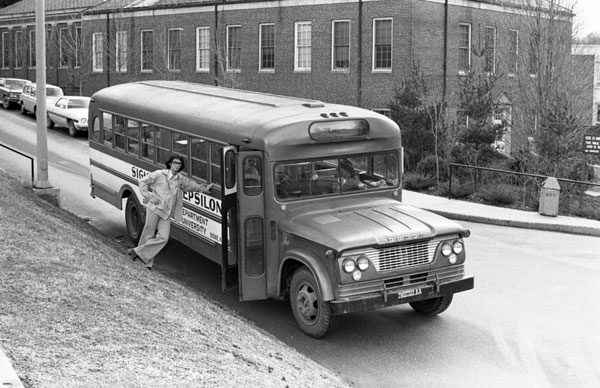
Construction of Farthing Auditorium completed. Farthing Auditorium, located on the Boone campus, is now known as the Schaefer Center for the Performing Arts.
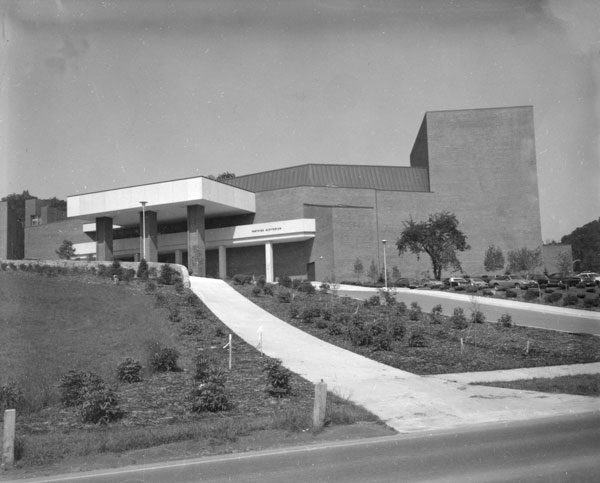
Cratis D. Williams resigns as dean of the Graduate School to become acting chancellor of Appalachian State University during Chancellor Wey’s leave of absence. Williams had served as dean of the Graduate school since 1958. Dr. Richard Rupp became the new Graduate School dean.
App State shifts from a quarter system to a semester system, which is still in place today. App State’s academic year is divided into two semesters, fall and summer, and two Summer Sessions.
The College of Education and the Division of Human Resources are combined to form the College of Learning and Human Development.
Professor Dan Stillwell in the Department of Geography builds a 150-pound, one eight-millionth scale model of the Earth in late 1975. The model is currently located on the first floor of Anne Belk Hall on the Boone campus.

The App State Gospel Choir is established. The choir continues to perform today as part of the approximately 200 concerts and recitals presented by App State’s Hayes School of Music each academic year.
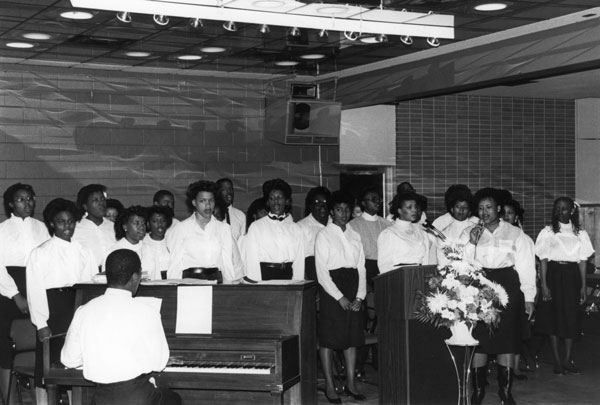
The women’s studies program is founded. This has evolved into the gender, women’s and sexuality studies program — the oldest program of its kind in the UNC System, and second oldest in the state of North Carolina. The degree program is offered by App State’s Department of Interdisciplinary Studies.
The College of Business is accredited by the American Association of Collegiate Schools of Business, now known as the Association to Advance Collegiate Schools of Business (AACSB) International — the premier global accrediting body for business schools. Walker College has maintained this accreditation over the past 48 years, confirming a commitment to quality and continuous improvement through a rigorous and comprehensive peer review process that is conducted every five years.
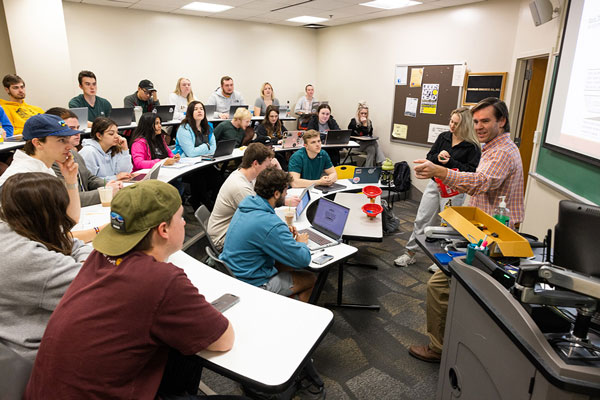
The Appalachian House opens in Washington, D.C. The facility served as a hostel for 18–20 visiting faculty, staff and students. It was replaced by a property six blocks away on North Carolina Avenue in 2003 but closed in April 2008, when zoning restrictions would no longer allow the house to be used as a hostel.
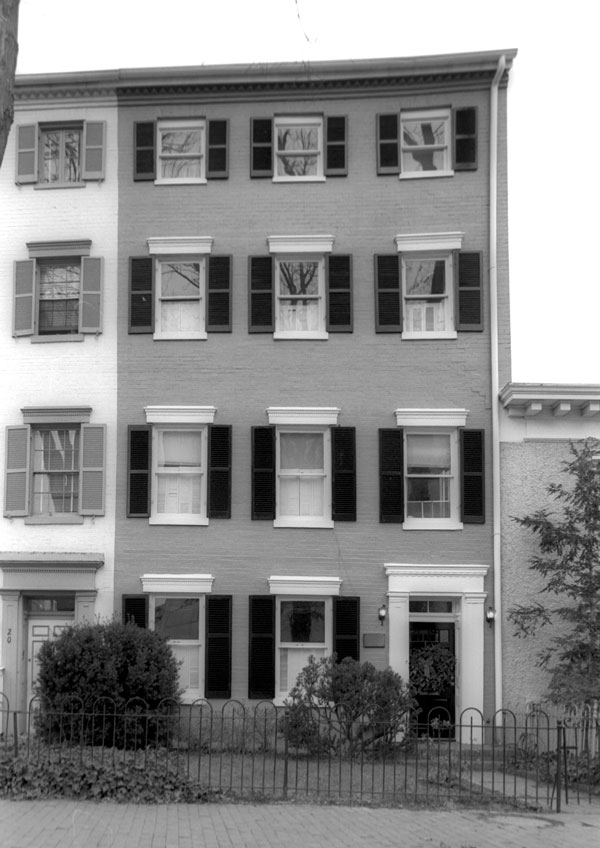
The App State Student Ambassadors form. This group of undergraduate students serve Appalachian State University as official student representatives for the Alumni Association, the Office of Admissions and the Office of the Chancellor.
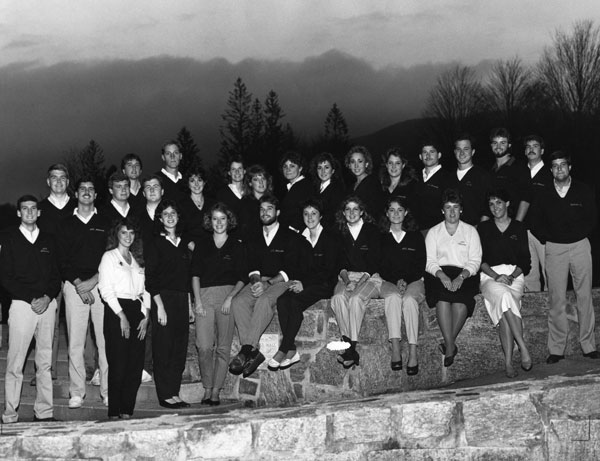
Center for Appalachian Studies established by App State Chancellor Herbert Wey and Appalachian scholar and folklorist Cratis D. Williams as part of the Department of Interdisciplinary Studies to direct the university’s undergraduate minor and major programs in Appalachian studies and to coordinate its many regional educational, research and outreach efforts. In 1979, App State created the first and only Master of Arts in Appalachian studies in the nation. Today, the center works to illuminate and sustain the Appalachian Region’s rich history, cultures, communities and ecology.
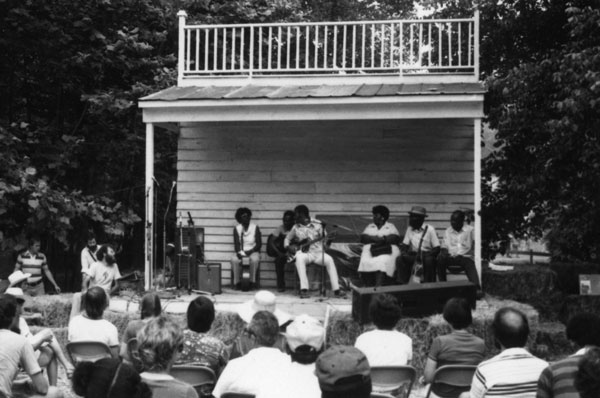
Dr. Herbert Walter Wey retires as chancellor of Appalachian State University, and Cratis D. Williams becomes interim chancellor.
Dr. John Edwin Thomas becomes chancellor of Appalachian State University. Thomas first came to App State in 1974 as vice chancellor of academic affairs, before serving as the university’s fourth leader from 1979 to 1993. After his retirement, he returned to App State in 1994 to teach in the Department of Management in the Walker College of Business for the next decade.
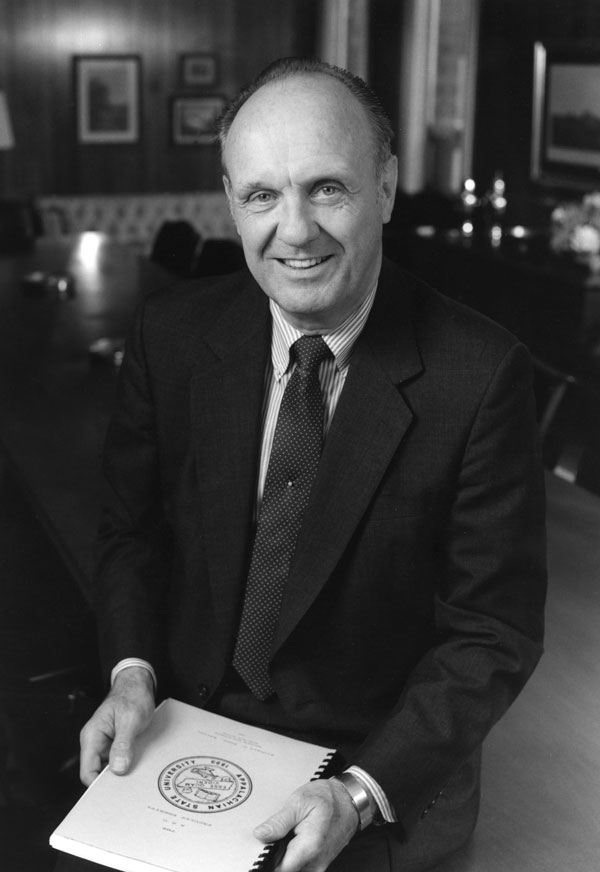
Conrad Stadium is rebuilt.
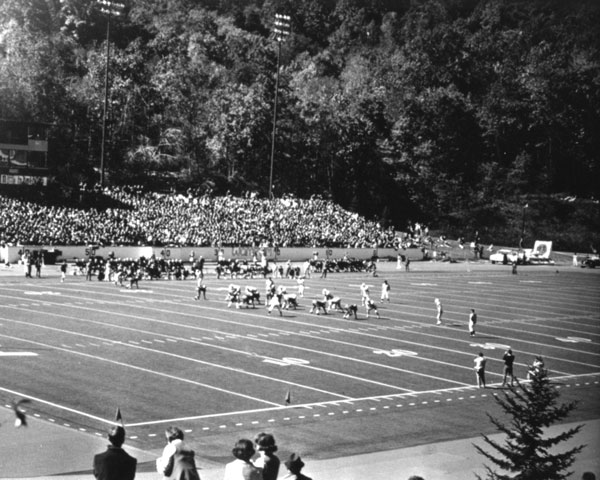
Women’s track became the newest sport in App State’s athletics programs.

App State purchases the Child Care Center (built 1928) in the early 1980s. The university completed an expansion of its Child Development Center in 2022, nearly doubling the center’s enrollment capacity. The center provides high-quality, affordable child care for the children of App State students and employees and local community members.
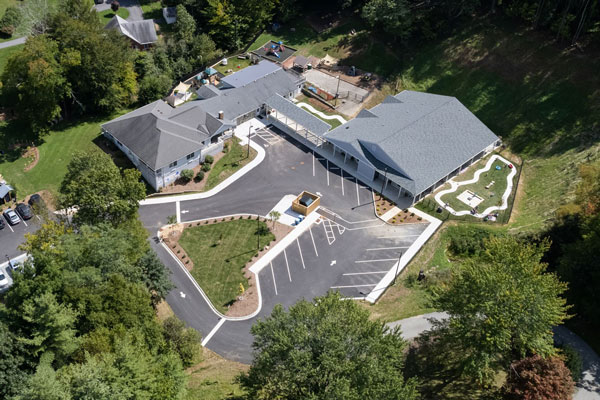
The AppalCART transit system begins operation in January with two buses. AppalCART service expanded to the town of Boone in September 1981, after the App State shuttle service joined with the Watauga County Transportation Authority to create a bus service for students and residents of Boone.
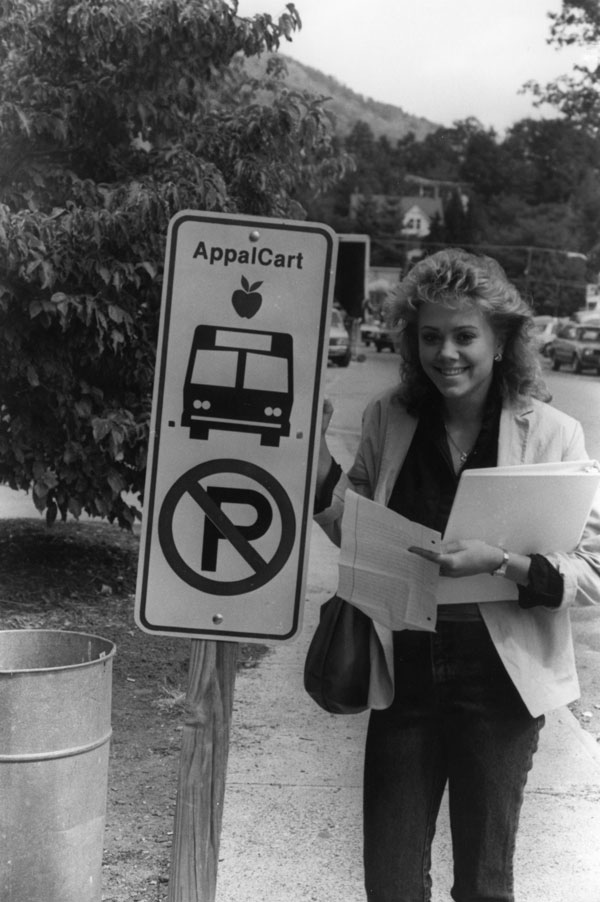
The Residence Life Office is created.
The Watauga Residence Hall is demolished to expand Sanford Mall.
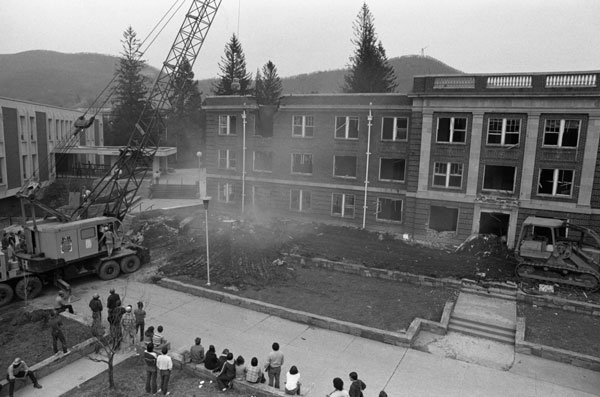
The Miles Annas Student Support Building is completed in the 1980-81 school year. This facility houses M.S. Shook Student Health Service, Counseling and Psychological Services, the Office of Wellness and Prevention Services and the University Post Office.
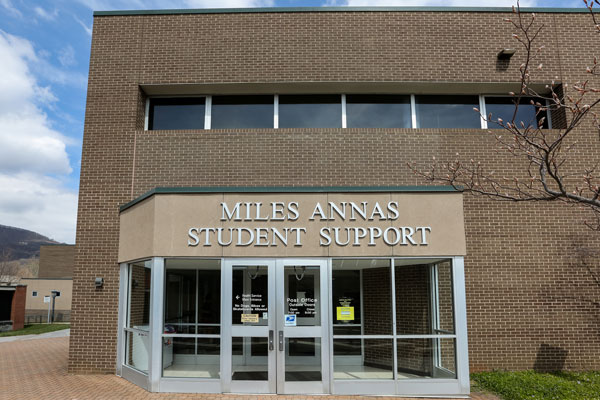
AppKIDS, organized by App State’s Staff Senate, begins. This annual shopping event provides 100 underprivileged K-12 students in Watauga County Schools with winter clothing, as well as hygiene and snack food items. App State faculty and staff, using donated funds, volunteer their time to mentor and guide these children on AppKIDS Day.

The Chancellor’s Scholarship is initiated. The scholarship is the university’s oldest and most academically competitive merit-based scholarship, designed for students with ambitious academic goals. The four-year program of study covers full institutional costs, and Chancellor’s Scholars are provided with numerous classroom and experiential research opportunities, as well as academic mentoring in a living-learning community and study abroad opportunities.
The AppalCART system is expanded to provide public transportation for the town of Boone, organized by App State and the Watauga County Department of Transportation.

The Dark Sky Observatory is opened off campus, about 20 miles northeast of Boone at an elevation of a little over half a mile. App State faculty and their students use the facility to conduct observational research in astrophysics. It is equipped with four telescopes.
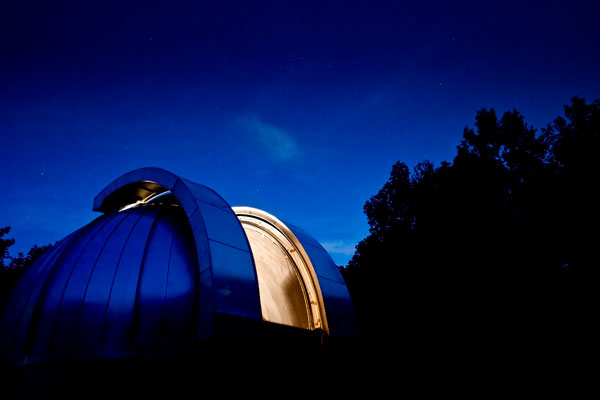
Faculty Apartments are converted to a co-educational residence for honors students and renamed Coffey Hall. Coffey Hall housed the Honors College program at App State until 2004, when it was moved to East Residence Hall. The building was demolished in 2010 to make way for the new Honors and Engagement Village.

App State enrollment exceeds 10,000 students.
Did you know? A taxidermied Alaskan brown bear called Frederick was part of an educational exhibit program at Appalachian State University. Frederick and the other exhibits visited many public schools in the region during each school year, and Frederick spent his summers on display in the Instructional Materials Center (IMC) in App State’s Belk Library and Information Commons. In the early 1980s, the Exhibits Office closed and Frederick came to live in the IMC — his permanent home.
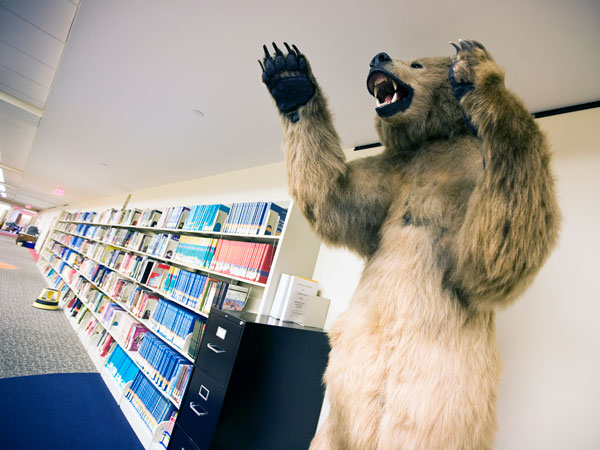
The AppalNet cable system is installed on the Boone campus. AppalNET started as an 8-channel campus cable system implemented by App State Chancellor John E. Thomas. It expanded to become an online resource for information and resources for the App State Community, including academic information, email and university organizations.
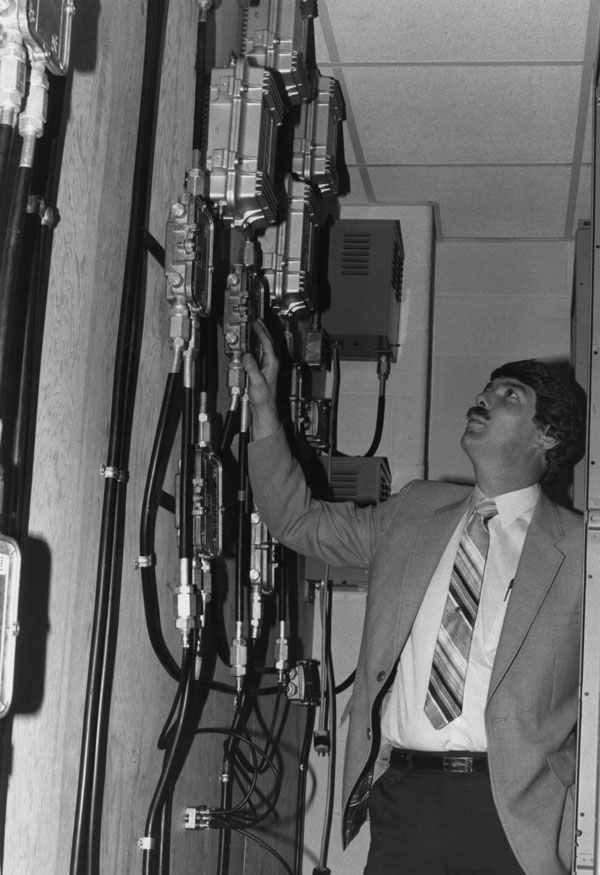
Broyhill Music Center — home of App State’s Hayes School of Music — is completed. The more than 90,000-square-foot facility, located in the university’s fine arts complex on the Boone campus, includes two performance halls, a state-of-the-art recording studio, an opera studio, a computer lab, a piano lab, a 5,000-square-foot music library, an instrumental rehearsal hall, a choral rehearsal hall, small ensemble rehearsal rooms, more than 30 offices and over 50 practice rooms with pianos.

The university’s annual An Appalachian Summer Festival begins. Presented by App State’s Office of Arts Engagement and Cultural Resources, the festival is the university’s monthlong annual celebration of the performing and visual arts, with a mix of music, dance, theater, visual arts and film programming held in venues across the Boone campus. It began as a chamber music series and has evolved into one of the nation’s most highly celebrated arts events, respected for both the breadth and quality of its artistic programming. Some well-known artists who’ve appeared in the series include Doc Watson, the North Carolina Symphony, the New York Ballet, Willie Nelson, Mary Chapin Carpenter, Sheryl Crow, the Dance Theatre of Harlem, The Beach Boys, Kool and the Gang, Patti LaBelle and Brad Paisley.

App State purchases an old Winn-Dixie on the edge of the Boone campus, renovates it and opens the facility as H’Appy’s nightclub. It was remodeled in 1988 and renamed Legends. The university closed Legends in fall 2023 due to the building’s structural issues. Watch this brief video to learn about the history of Legends.

Appalachian Cultural Museum starts, with a focus on the mountains of Western North Carolina. Until the museum’s closure in 2006, tourists, school groups and locals experienced the history of mountain life through exhibits on all things Appalachian — from the tools of early pioneer life, to Civil War artifacts, to Junior Johnson’s NASCAR stock car, to items from the Land of Oz tourist attraction in Beech Mountain. The museum also hosted programs, rotating exhibits, and special events highlighting the arts, environment, and heritage of Appalachia, including workshops by area artisans, musical performances and lectures by regional authors. It was housed in University Hall, located just south of App State’s Boone campus, off of U.S. 321.
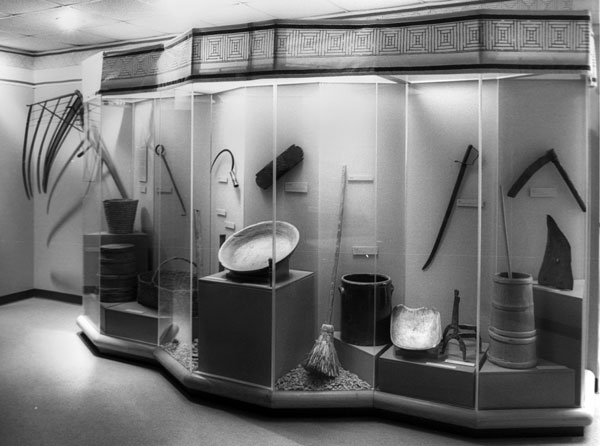
Appalachian Popular Programming Society (APPS) forms. APPS serves as the primary student programming board at App State and is responsible for planning diverse, quality events for the entire university community.
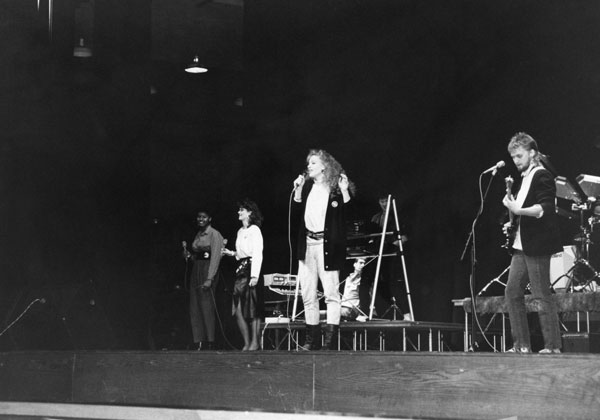
Wellness Center established. Today, Wellness and Prevention Services at App State serves all App State students through the promotion of healthy behaviors, risk behavior modification services and campuswide health policies, which facilitate student success and holistic well-being.
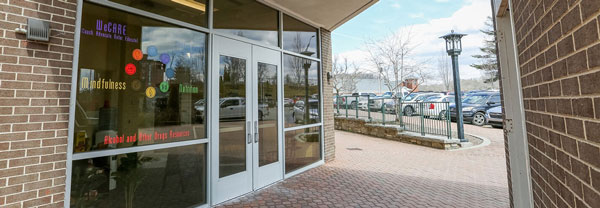
College of Education is named in honor of Dr. Lois Arlene Weisner Reich and her husband, Dr. Edgar Reich, for their generous and ongoing support to the college. Lois, who passed away in 1995, attended App State from 1931 to 1933. She taught school for 17 years and held county school administrative posts for 35 years. The Reichs dedicated their lives to helping the children of others, and their philanthropies reached into many areas, but education was always their main goal.
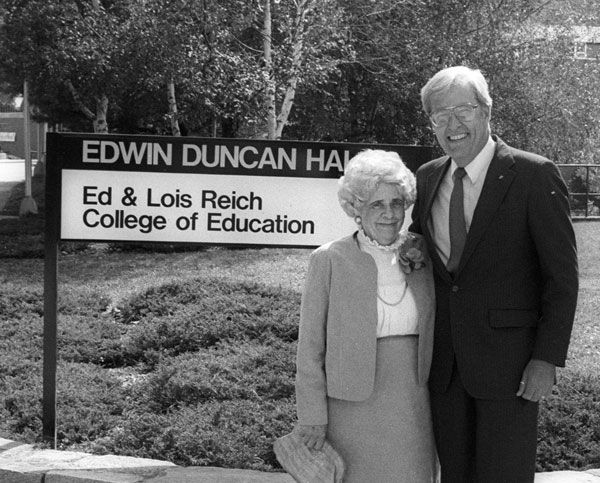
Nearly 10,500 students enroll at App State for fall 1985, with the university employing more than 500 faculty.
The Mountaineers football team claims its first Southern Conference Championship. They ended up winning or sharing 12 conference championships before leaving the league for the Football Bowl Subdivision’s (FBS) Sun Belt Conference in 2014.
Library replaces the card catalog system with computer terminals.
App State’s student-run radio station, 90.5 WASU-FM, changes from a Top 40 format to an album-oriented rock/progressive rock format in August.
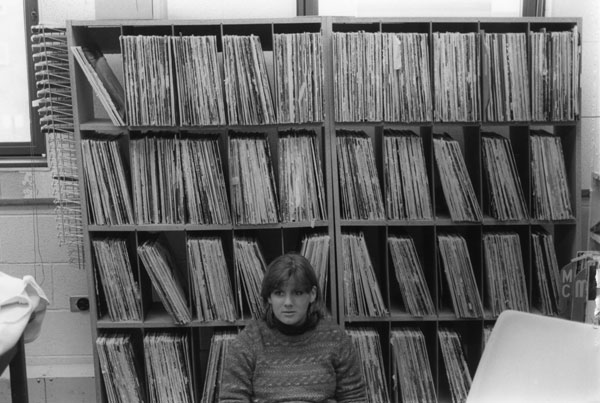
Quinn Recreation Center completed. The 48,000-square-foot Dwight W. Quinn Recreation Center is equipped with state-of-the-art fitness equipment and is located on Stadium Drive, across from Kidd Brewer Stadium.
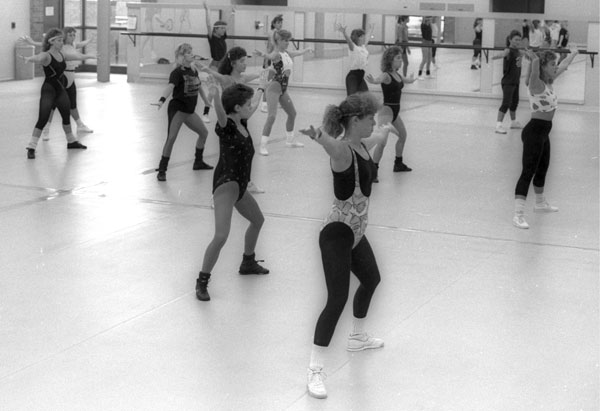
The house of App State co-founders D.D. and Lillie Shull Doughtery is moved from the Boone campus to State Farm Field for storage during the summer. It was purchased by the Appalachian Heritage Museum in 1989 and moved to Mystery Hill in Blowing Rock, NC — its current home — to avoid demolition. According to Mystery Hill, the home is being restored to its original 1903 condition with the help of donations by the community.
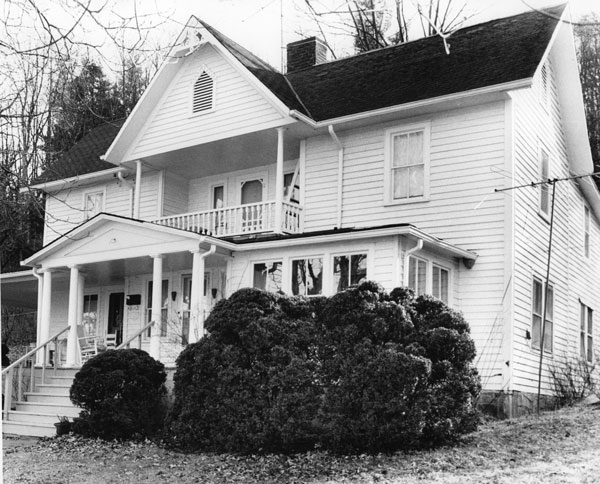
App State’s baseball field is dedicated as Red Lackey Field on April 29, in honor of E.G. Lackey, who graduated from Appalachian State Teachers College in 1937 and served on the university’s Board of Trustees for 18 years. The field was originally located at the current location of Durham Park, at the southeast corner of the Boone campus, before being moved west of Kidd Brewer Stadium. The field became the site of the Sywassink/Lloyd Family Stadium in 2007, the first on-campus home for Mountaineers softball. A new App State softball field is nearing completion at the university’s Appalachian 105 property in Boone.
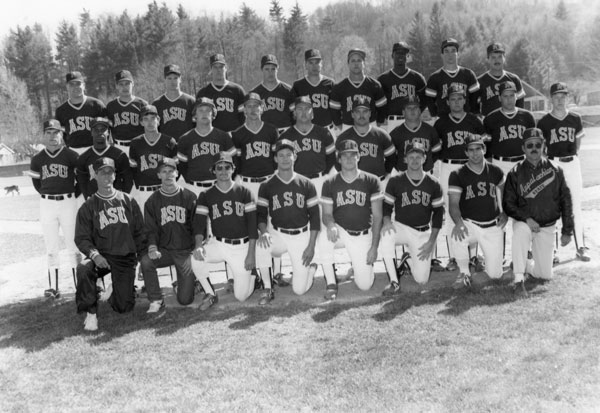
Duck Pond area is renamed Tomlinson Park in honor of Associate Professor Emeritus Rebecca Tomlinson. She was a professor of physical education at the university from 1961 to 1981 and helped design the park’s landscaping and renovations.
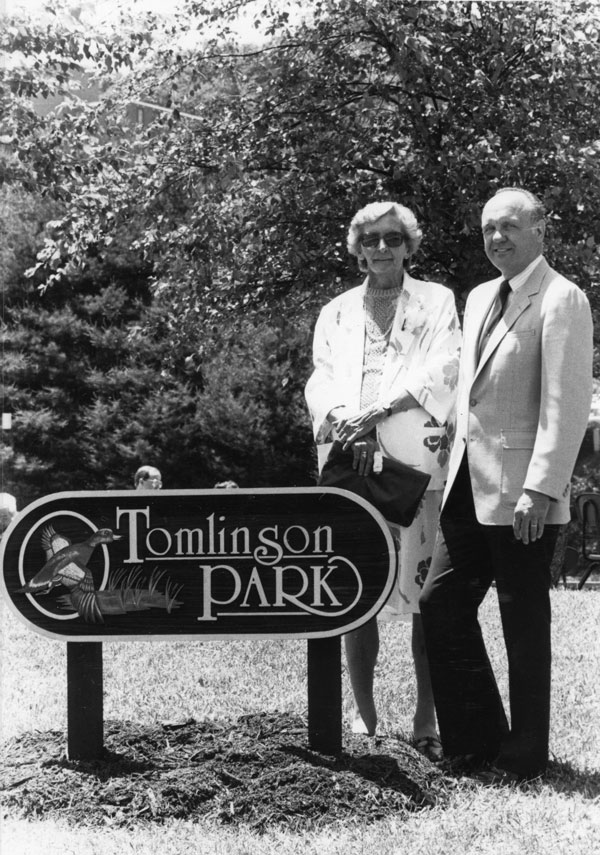
App State’s Board of Trustees approves the establishment of the Hayes School of Music. The school prepares young musicians for professional lives as performers, composers, music educators, music therapists, conductors and music industry professionals, ensuring the next generation of musical leadership for the state, region and nation.
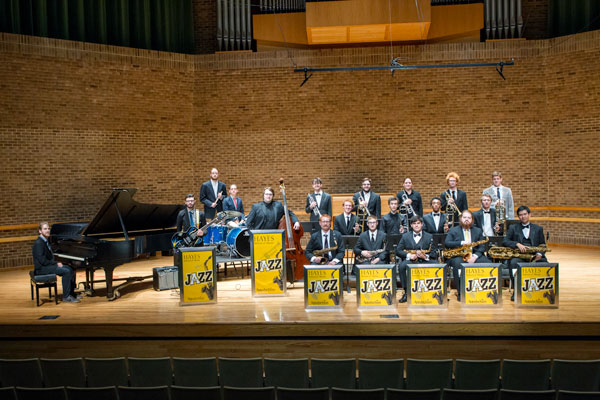
Conrad Stadium is renamed Kidd Brewer Stadium in honor of former head football Kidd Brewer, who coached at Appalachian State Teachers College from 1935 to 1938. He resigned to pursue a career in business. To Mountaineers fans, Kidd Brewer Stadium is known as “The Rock” — one of top 25 football stadiums in the country in 2024, according to ESPN.
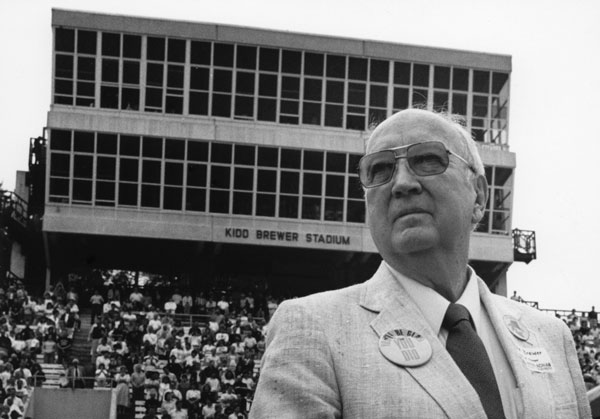
The Harlan E. Boyles Distinguished CEO Lecture Series begins in the spring semester. Named for the late N.C. State Treasurer Harlan Boyles in October 1991, the series has since brought more than 50 influential CEOs to App State’s Boone campus. Boyles lectures were held each semester through 2016, and beginning in 2017, the lecture became an annual event. This video, from the 2012 Boyles Lecture Series, offers more details of the event’s history.
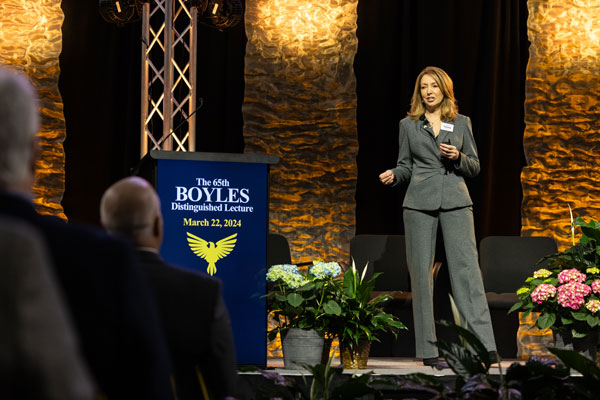
Skateboarding is banned on the Boone campus.

Campus recycling program created. Learn more about current recycling efforts at App State.
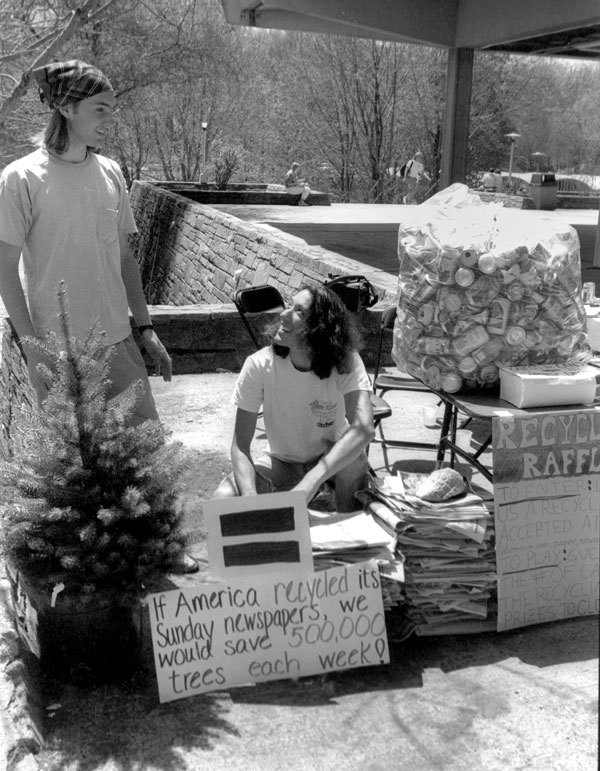
Jerry Moore becomes App State’s head football coach. Moore served as head football coach from 1989 to 2012, leading the Mountaineers to three consecutive national championships and 23 winning seasons in 24 years. In 2021, the university dedicated the Jerry Moore Plaza and unveiled the bronze statue crafted in Moore’s likeness, both located outside the north end zone facility entrance at App State’s Kidd Brewer Stadium.
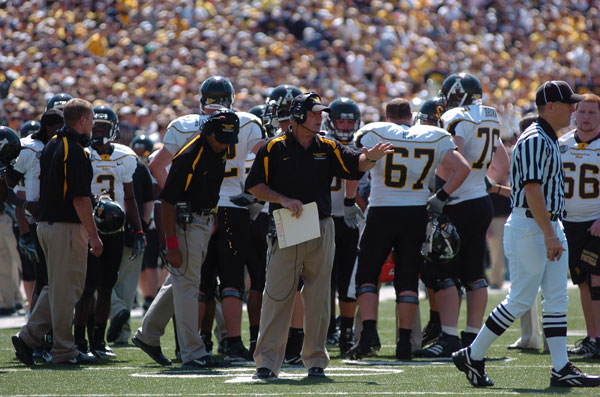
Department of Music moves to the School of Music.
Small Business and Technology Development Center (SBTDC) begins operations at App State. SBTDC is an advisory resource for growing and developing businesses hosted by campuses of the University of North Carolina System. From 2018 to 2013, App State’s SBTDC Centers in Boone and Hickory served nearly 1,000 clients, helping create or retain over 1,600 jobs and assisting with $65.6 million in capital formation. Over the five-year period, SBTDC clients experienced $33 million in sales growth.

American author, poet and civil rights activist Maya Angelou speaks at App State’s 1990 Convocation. Angelou appeared at App State as part of the university’s Artist and Lecture Series, a program to bring music, dance and theater performances to App State.
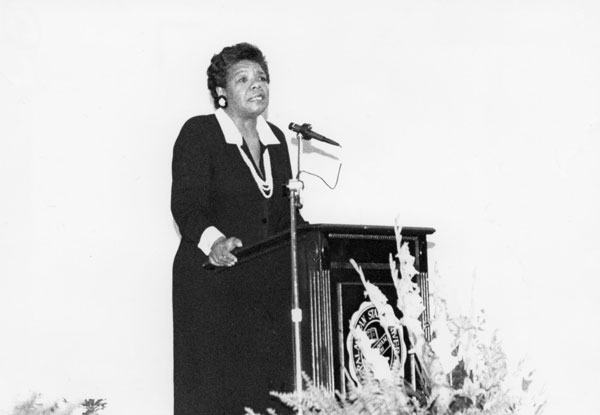
The Art Department adds a Bachelor of Fine Arts degree.
Raley Business Hall completed. The 130,000-square-foot, four-story building was named and dedicated in honor of Thelma C. Raley in 1993. Today, this facility is known as Peacock Hall, named in honor of App State’s sixth chancellor, the late Dr. Kenneth E. Peacock.
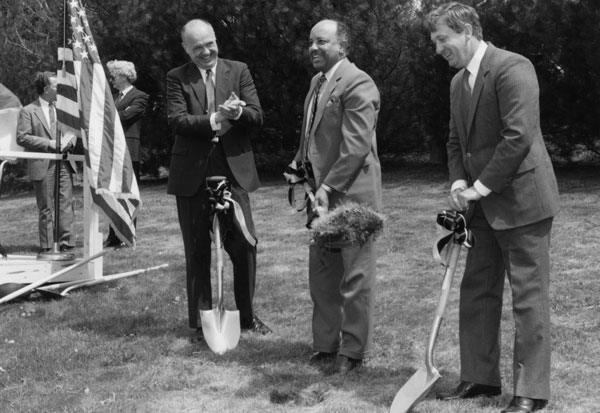
Nearly 12,000 students enrolled and 700 faculty employed at App State.
App State’s Child Care Center, now known as the Child Development Center, opens in the fall.
Campus Security becomes University Police. This unit is now known as the Appalachian State University Police Department (APD). The university’s official policing agency, APD supports the university’s academic mission by working in partnership with the campus community to prevent crime, solve problems and improve the quality of life on campus — holding the safety and health of App State’s community members as its top priorities.
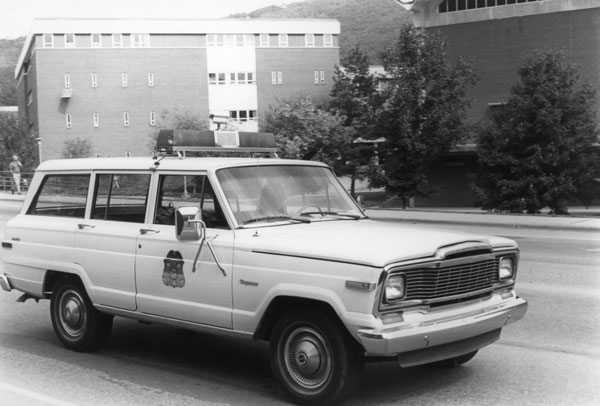
Trivette Hall completed. This hall is home to App State’s Park Place at the Pond dining facility.
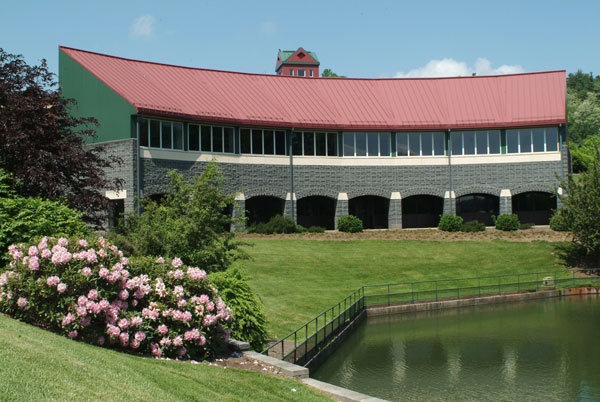
The App State women’s basketball team defeated East Tennessee State, 98-87, to win the Southern Conference Championship — the team’s fourth title in five years.
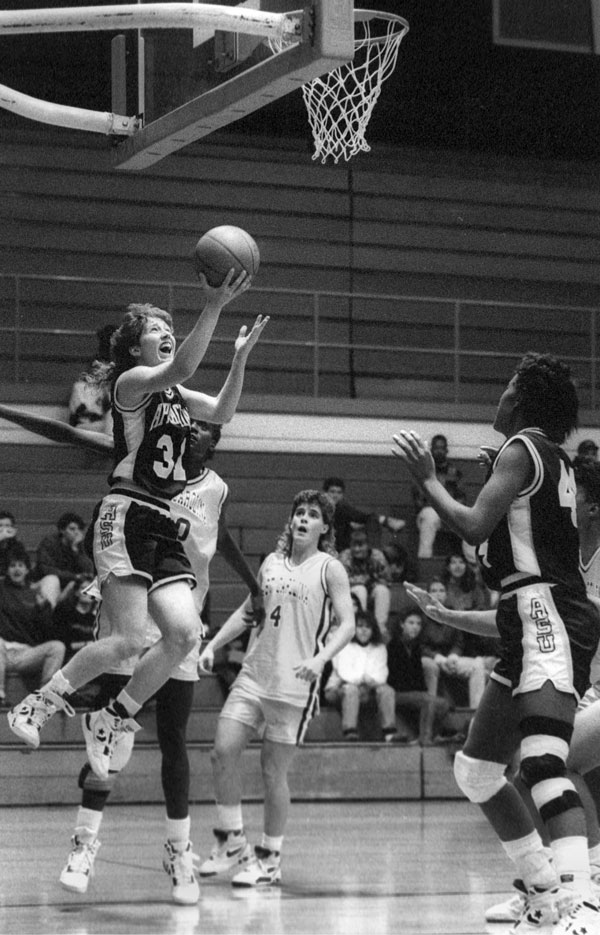
Women’s outdoor track team wins the Southern Conference Championship five years in a row.
The University of North Carolina Board of Governors approves App State’s doctoral program in educational leadership. It was the first doctoral program at the university. Today, in addition to the EdD program, App State offers a Doctor of Psychology in clinical psychology.
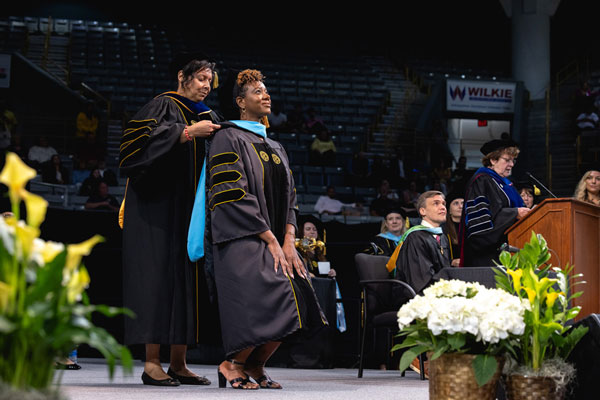
University’s core curriculum adjusted to place more emphasis on computers, math and communication, with emphasis on writing, speaking and computing skills courses.
Dr. John E. Thomas retires as chancellor, and Dr. Francis Thomas Borkowski becomes App State’s fifth leader.
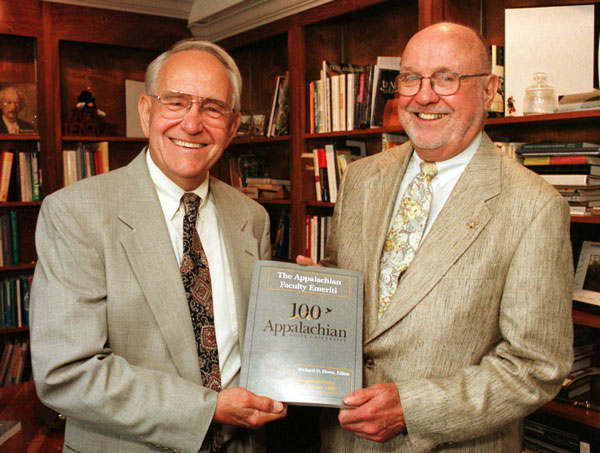
Department of Theatre and Dance dedicates and opens Valborg Theatre. Valborg is the department’s mainstage theater for student productions and also serves as a venue for An Appalachian Summer Festival. The department performed “A Midsummer Night’s Dream” as the opening production for the theater in 1994.
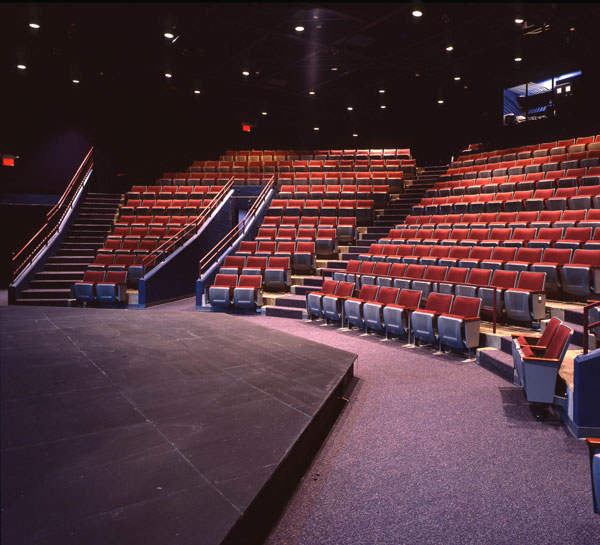
Student enrollment reaches just under 12,500 in fall 1995, and 745 full- and part-time faculty are employed at the university.
McKinney Alumni Center completed. Located across from the Holmes Convocation Center on App State’s Boone campus, the 7,200-square-foot center serves the needs of more than 150,000 App State alumni. Inside the center are a large reception area, a great room and a multipurpose conference room. The offices of Alumni Engagement and the Appalachian Foundation are housed in the center.
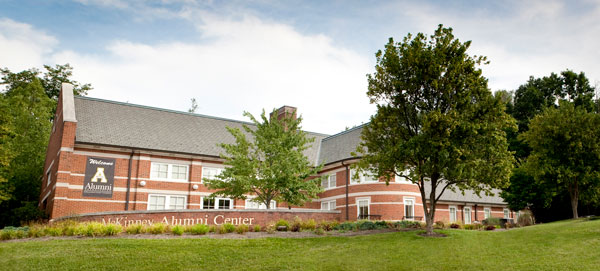
The Department of Women’s Studies — now known as the Department of Interdisciplinary Studies — becomes a separate, universitywide academic program.
The Holland International Impact Exchange Program begins. Offered through App State’s Walker College of Business, the Holland Program is an international learning experience that allows participants to explore business design and comprehensive internationalization strategies by visiting with organizations and individuals shaping the business landscapes across Asia and the world. The program is named for the late Dr. William R. Holland, businessman and honorary App State alumnus.
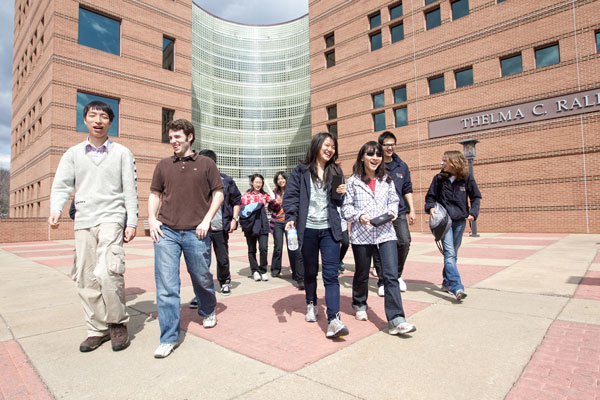
Summer Reading Program instituted for incoming first-year students. This is now known as the Common Reading Program, through which first-year App State students read a university-selected book as part of their orientation to the university. By participating in the Common Reading Program, students establish a common experience with other new students that helps develop a sense of community and introduces them to academic life at App State.
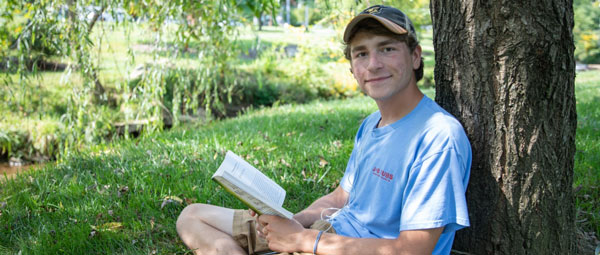
App State purchases its new New York City Loft, a 4,400-square-foot facility located in the Gramercy Park neighborhood of Manhattan. The Appalachian Loft rented for $30 a night for students, faculty and staff, and $40 for alumni and guests. App State’s New York Loft program, which began in 1974, celebrates its 50th anniversary in 2024.
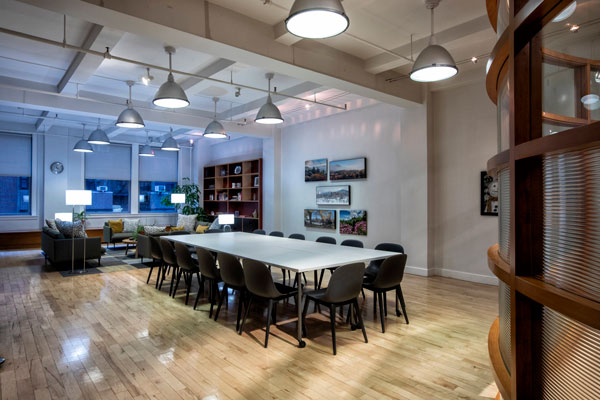
Appalachian State University celebrates its 100 year anniversary. The university’s Centennial Campaign, a yearlong event, featured workshops, lectures, exhibits and symposiums on student development issues, sustainable development, children’s literature and the women of Appalachian, as well as arts events, including special concerts and performances, visiting scholars, art installations, folk music and story events, and dramatic performances. University administration launched new initiatives: more off-campus programs, building renovations and enhancing university athletics.
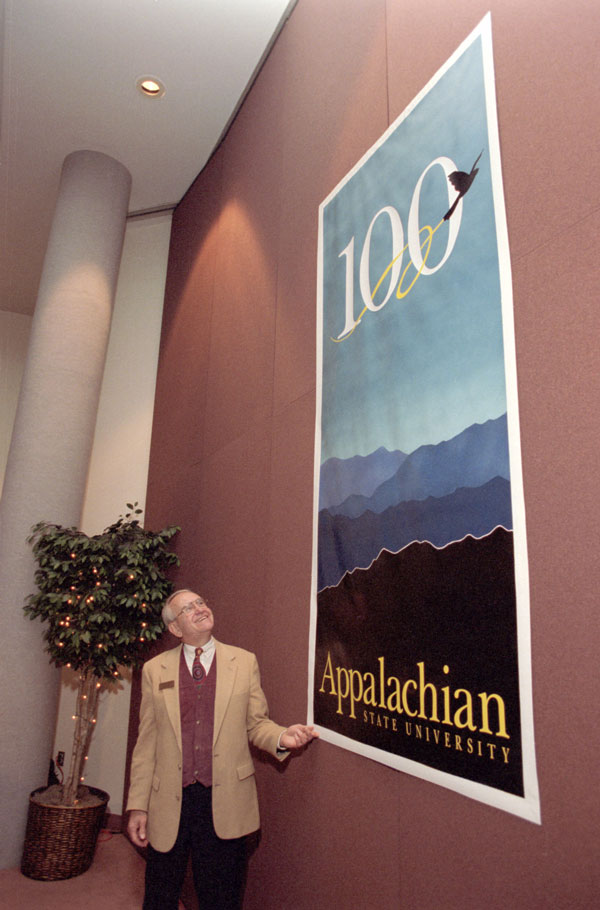
App State holds its first Martin Luther King Day Challenge. The challenge consisted of service projects to bring students and the community together in memory of Dr. Martin Luther King Jr. This event has since transitioned into multiple Mobilize the Mountains Days of Service held over each academic year, with App State student and faculty volunteers contributing hundreds of hours to community service. Days of Service is organized by App State’s Office of Community-Engaged Leadership.
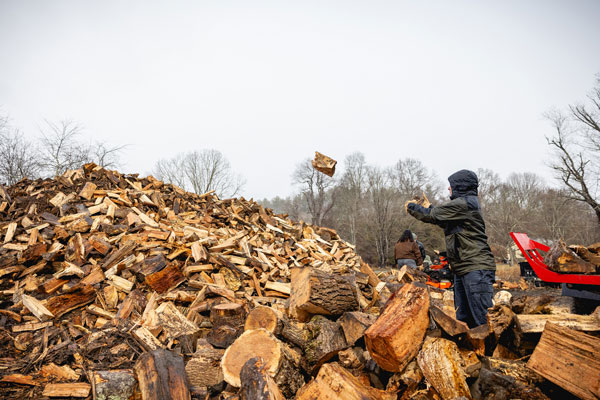
Reich College of Education establishes the Rhododendron Society. This honor recognizes alumni for their exemplary contributions to education and their communities. Induction into this society is the highest honor given by the College of Education.
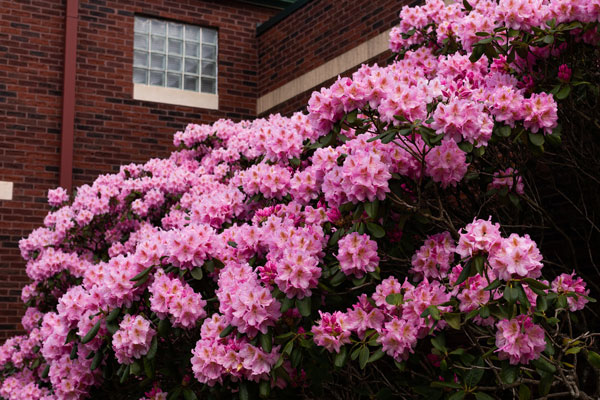
Daniel Boone statue installed on App State’s Boone campus. It was created by the late Sherry Edwards, a former App State professor. Fun fact: The Town of Boone is named for legendary American pioneer and explorer Daniel Boone, who frequently visited the Watauga County area in his travels.
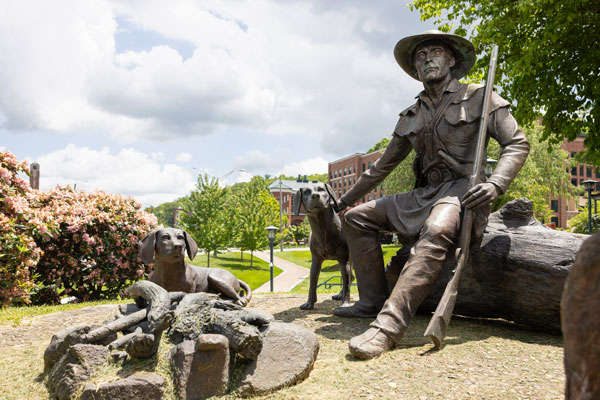
A ribbon-cutting ceremony is held Sept. 6 for App State’s George M. Holmes Convocation Center, a 200,840-square-foot, multipurpose facility located at the Boone campus that hosts varsity sports and major campus events, including Open House, Club Expo and commencement, and also houses the Beaver College of Health Sciences’ Department of Recreation Management and Physical Education. The center officially opened on Nov. 17, when the App State men’s basketball program hosted the North Carolina Tar Heels in front of a sell-out crowd. A groundbreaking ceremony for the center was held Dec. 5, 1997, and in March 1998, App State named the center in honor of North Carolina Rep. George Holmes, who helped secure funding for the center’s construction.
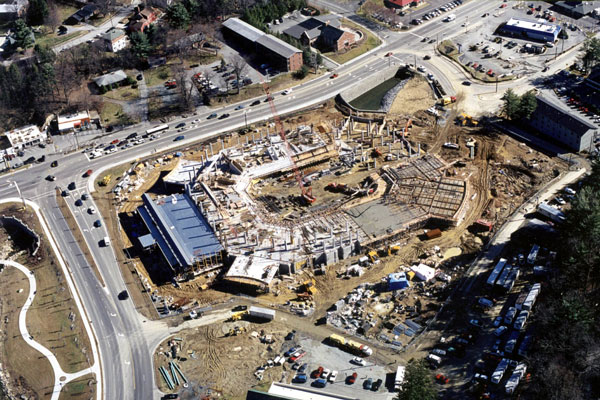
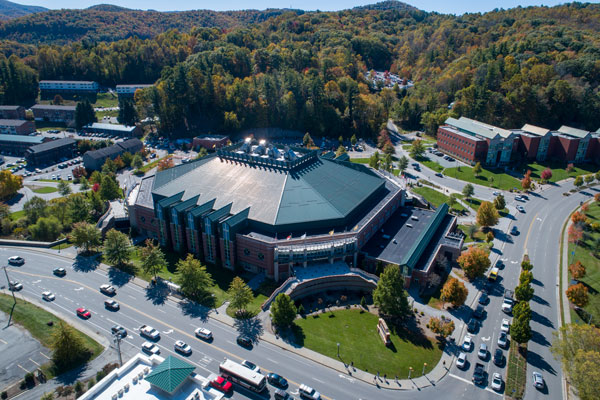
Skateboarding and rollerblading are allowed on the Boone campus, for App State students only. Did you know? App State has a policy on the use of skateboards and similar devices on campus.
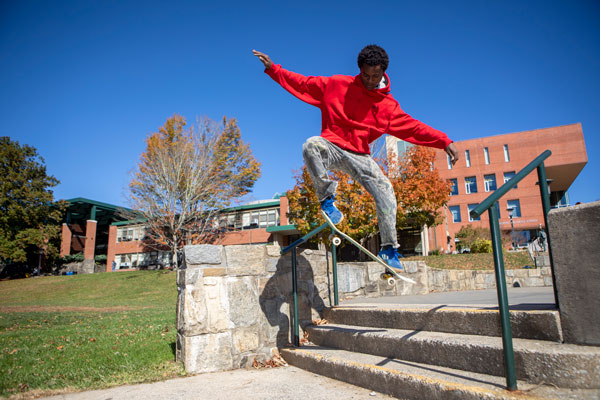
Yosef sculpture installed on Tomlinson Field on App State’s Boone campus. The 6-foot-6-inch bronze statue of Yosef — the university’s beloved mascot since 1942 — faces Rivers Street and is located in front of App State’s Duck Pond. The sculpture was gifted to App State by the late NC business leader, philanthropist and university benefactor Irwin “Ike” Belk.

Greenbriar Movie Theater opens in Plemmons Student Union. The facility screens a variety of films and documentaries and is the location of the Greenbriar International Film Festival.
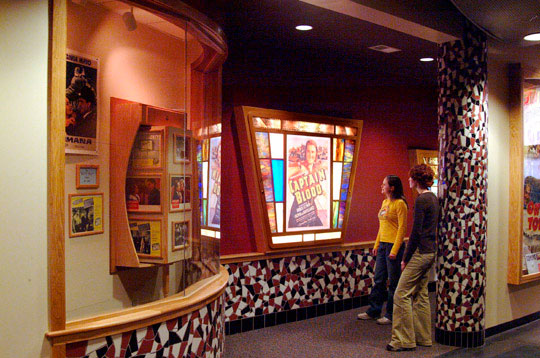
The old 1963 Rankin Science Building is demolished and Rankin Science North addition is completed.
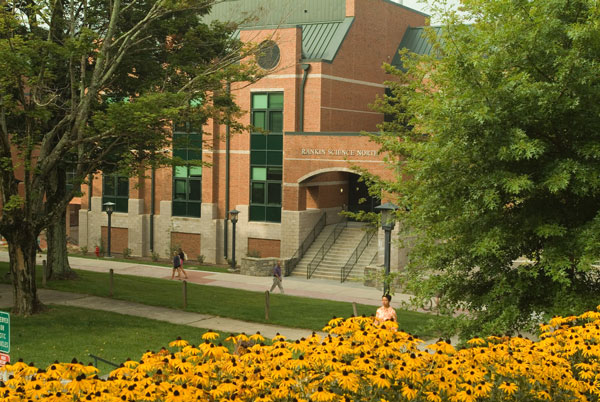
Chancellor Frank Borkowski retires on June 30. Provost Harvey Durham is appointed interim chancellor of Appalachian State University for the 2003–04 school year. Prior to serving as provost, Durham was vice chancellor for academic affairs.
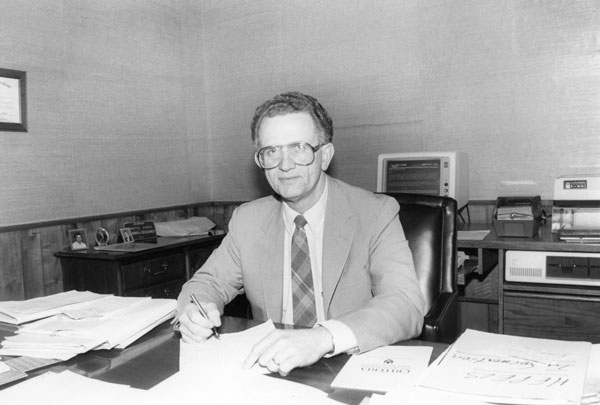
Turchin Center for the Visual Arts opens. Located on King Street, at the crossroads of campus and community, the Turchin Center at Appalachian State University engages visitors in dynamic and accessible exhibition, education, outreach and collection programs. These programs inspire and support a lifelong engagement with the visual arts and create opportunities for participants to learn more about themselves and the world around them.
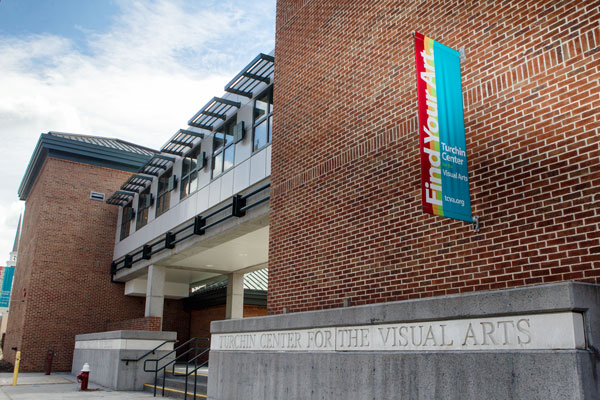
Dr. Kenneth E. Peacock, interim provost and vice chancellor of academic affairs, is elected chancellor of Appalachian State University in February 2004. He was formally installed as chancellor on April 22, 2005. Peacock spent more than 30 years as an educator at App State: First, as a faculty member teaching accounting and taxation; later, as the dean of the Walker College of Business; and finally, as chancellor of the university from 2004 to 2014, pledging to the campus community that he would work tirelessly for “students first, quality in all.”

Students vote with 83% approval to charge themselves a $5 per semester student fee to begin the Renewable Energy Initiative (REI) — a student-led, student-funded organization that seeks to install renewable energy and energy efficiency projects at App State’s campuses. Since its inception in 2005, REI has funded over 20 renewable energy and energy efficiency projects, including the Broyhill Wind Turbine, which, until recently, was the largest wind turbine in NC. REI works closely with App State’s Office of Sustainability.
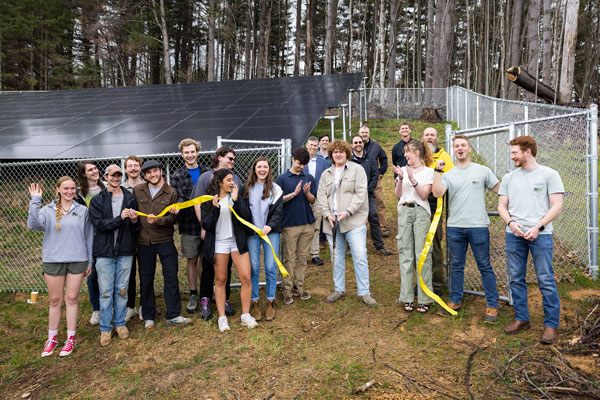
Durham Park on App State’s Boone campus dedicated in honor of App State Chancellor Durham in summer 2004. Durham Park was constructed alongside App State’s Holmes Convocation Center, in the late 1990s.
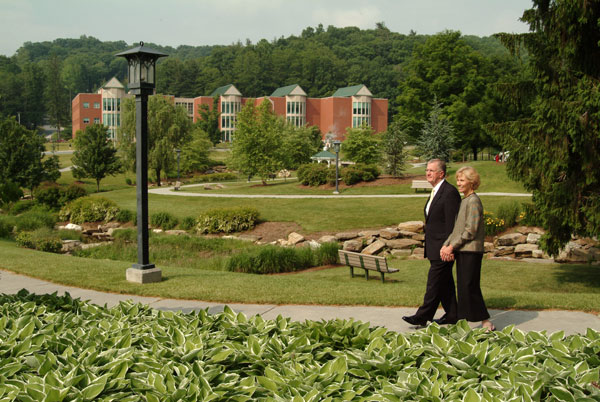
Student enrollment reaches 14,653 in fall 2005 and nearly 1,000 faculty are employed at App State.
App State’s Mountaineers football team becomes NC’s first football team to win an NCAA national championship, with its win over Northern Iowa in the Division 1-AA National Championship game in December. It would be the first of three football national championships (2005, 2006 and 2007).
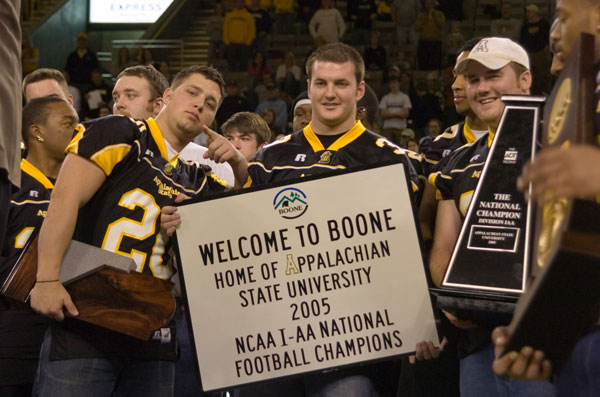
Belk Library and Information Commons completed. The Belk Library, Erneston Music Library and Hickory Library and Information Commons compose University Libraries at App State, which serves the students, faculty and staff of App State’s Boone and Hickory campuses, as well as community members and public school teachers. Belk Library receives nearly 1 million visitors each year.
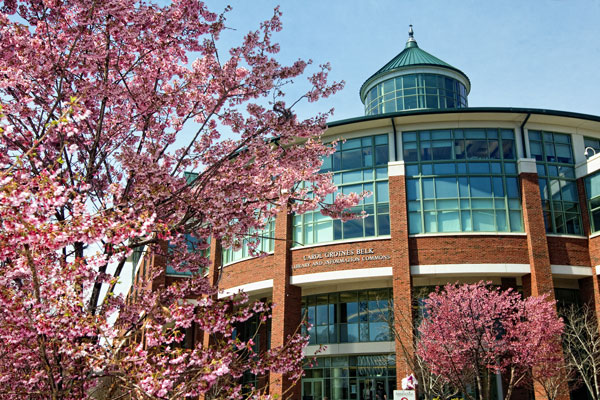
The Office of Student Research (OSR) is established to expand opportunities for undergraduate and graduate students to engage in research and mentored scholarship. More than $100,000 in grants are awarded each year to support their endeavors.
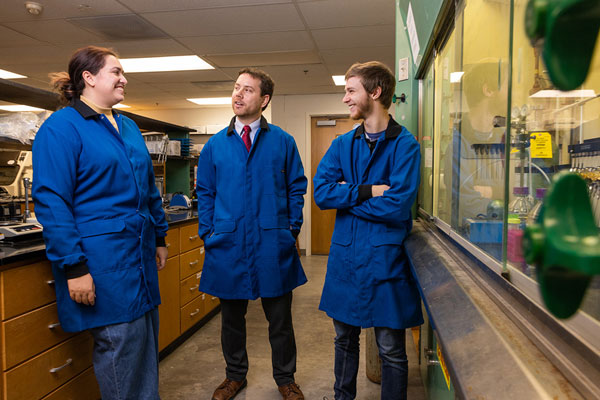
Special Collections Research Center established. Located on the fourth floor of the Belk Library and Information Commons, Special Collections is home to the W. L. Eury Appalachian Collection, the Stock Car Racing Collection, Rare Books and Manuscripts, and University Archives and Records Management Services. Its collections and activities support teaching, learning, research and scholarship at Appalachian State University and beyond.

The App State Mountaineers win their second NCAA Division I Football Championship in a row, with a 28-17 victory over the UMass Minutemen.
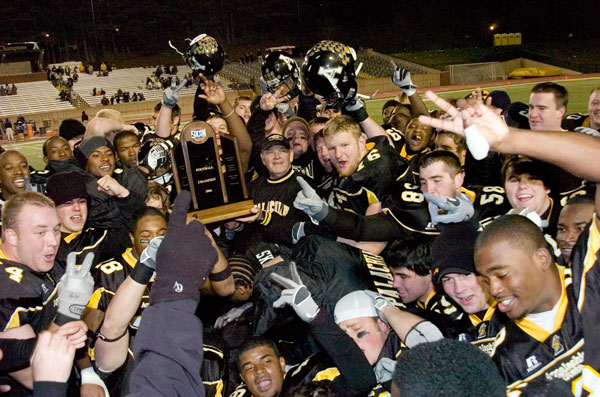
Center for Entrepreneurship in the Walker College of Business is created to support a burgeoning group of student entrepreneurs. In 2012, a generous donation led to renaming the center the Transportation Insight Center for Entrepreneurship. The center helps App State students — regardless of major — faculty, staff and alumni conceive, develop, incubate and launch new business ventures, turning their ideas into reality.
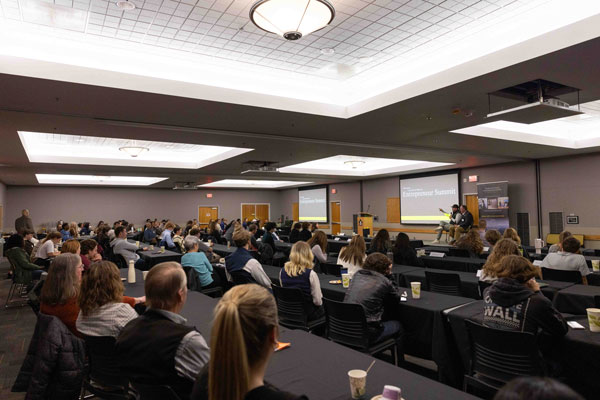
University Communications (UComm) office formed as part of the University Advancement Division. UComm continues the work of the former News Bureau and Public Affairs, both of which were under the Office of Development until 2006, when UComm was created. Now operating under the Division of External Affairs and Strategic Initiatives, UComm manages media relations and critical and crisis communications, serves as an in-house advertising and public relations agency for university clients, and promotes and supports major university events and initiatives.

Broome-Kirk Gymnasium demolished to make room for the new Central Dining Hall.
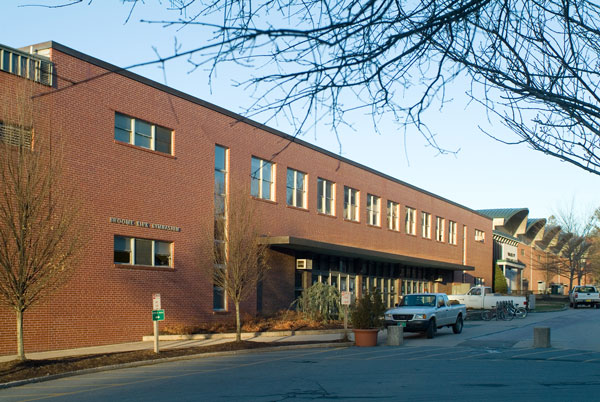
The App State Mountaineers upset Michigan 34-32 in the Big House on Sept. 1. During the fall 2007 season, App State also set a new national record, winning 15 consecutive games. They would go on to secure their third consecutive national championship on Dec. 14, with a 49-21 win against the Delaware Fightin’ Blue Hens.
The win against Michigan marked the first time a Football Championship Subdivision (FCS) team had beaten a ranked Football Bowl Subdivision (FBS) opponent — a moment so significant that the Associated Press changed its policy allowing FCS teams to receive votes in its polls. It is still widely regarded as one of the biggest upsets in college football history, according to Sports Illustrated.
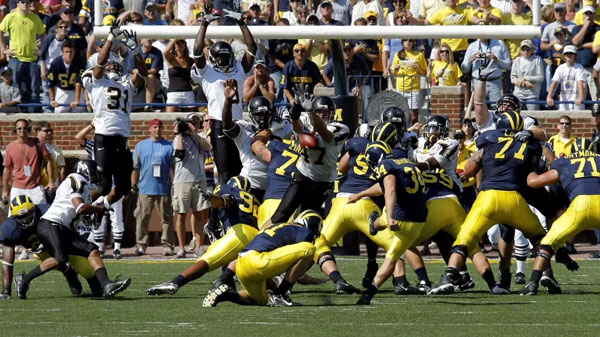
The Appalachian Commitment to a College Education for Student Success Scholarship program (ACCESS Scholarship) is established. The program ensures 50 students from low-income families in NC can attend and graduate from App State debt-free. It covers full institutional costs for up to eight semesters, including tuition and fees, room and board and book rental. Along with financial assistance, the ACCESS program offers recipients a comprehensive program of academic and personal support that includes orientation and academic advising, mentorship and professional development opportunities.
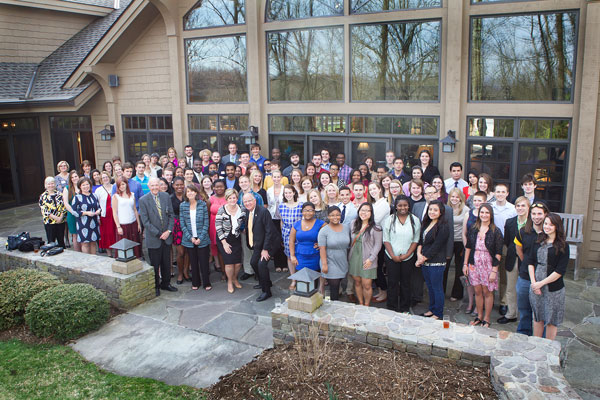
University College, formerly known as the General College, is established. The college consists of the university’s General Education program, faculty and student support, and co-curricular programming and support — all designed to support the work of students both inside and outside the classroom. All students at App State begin their education in University College and benefit from its programs until they graduate.
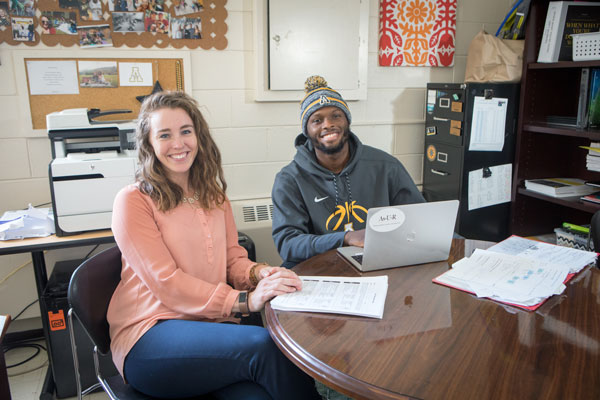
LGBT Center opens in Plemmons Student Union to provide resources, support, information and a welcoming atmosphere for LGBT individuals and their allies at App State. In 2014, the center was renamed the Henderson Springs LGBT Center in honor of university benefactors Bo Henderson and Ed Springs. The facility is now known as the Henderson Springs LGBTQ+ Resource Center.
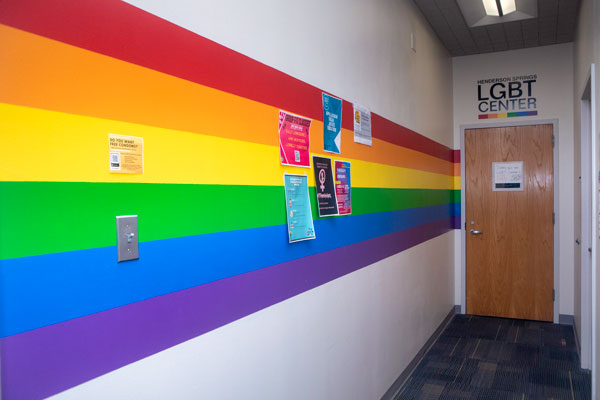
App State joins more than 500 universities, colleges and community colleges in pledging to reduce its greenhouse gas emissions by year 2050. Former Chancellor Kenneth Peacock formalized the goal by signing the American College and University Presidents Climate Commitment on Earth Day, April 22.
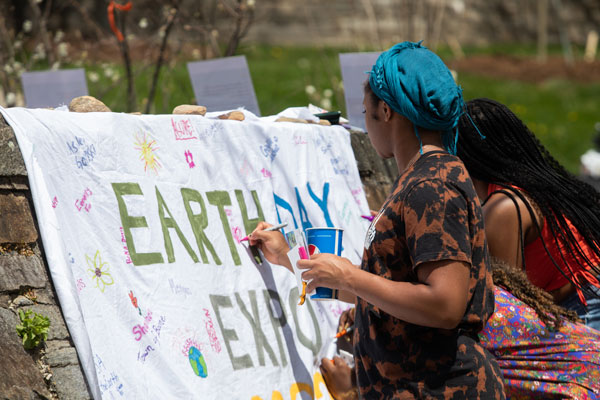
App State’s Research Institute for Environment, Energy and Economics (RIEEE) begins. Since its launch, RIEEE has fostered interdisciplinary research on the environment, energy and economics, especially the areas in which these subjects intersect. The institute serves as an umbrella organization for three centers: the Appalachian Energy Center, Center for Economic Research and Policy Analysis and the Southern Appalachian Environmental Research and Education Center. The work supported by RIEEE is integrated into App State’s academic programs, used to facilitate discovery among K-12 student students and teachers and employed in the region’s economic development.
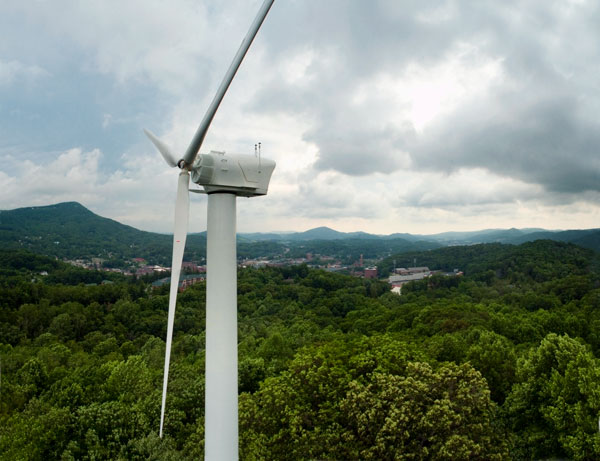
App State joins the North Carolina Research Campus in Kannapolis, NC — a 350-acre campus devoted to research in the fields of human health and nutrition. App State is one of eight NC universities with a physical presence at the campus, where it operates the Human Performance Laboratory and Exercise Biochemistry Laboratory.
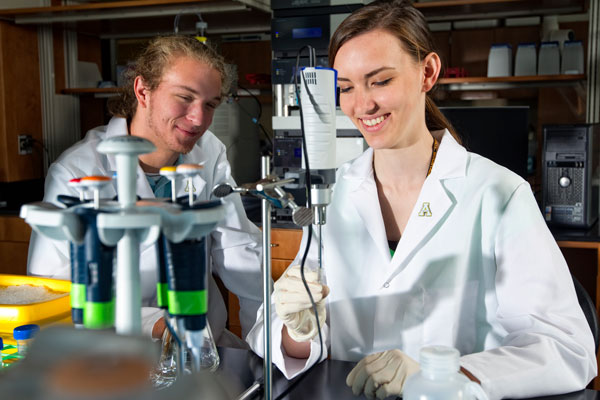
Office of Sustainability is created to guide the university in strategic sustainability goals, create partnerships among students, faculty and staff, develop policies and guidelines to support strategic goals, provide program evaluation, and create opportunities for App State to engage with its community in sustainable practices.
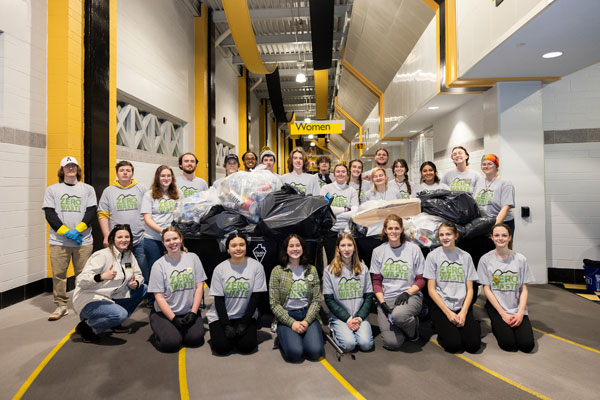
Boone campuswide siren system installed. The AppState-ALERT siren warning system in Boone is designed to provide Boone campus students, staff, faculty and visitors with an audible notification of an emergency event that affects campus across multiple buildings and outdoor areas.
App State uses multiple methods to notify and communicate emergency information to the campus community — including, but not limited to, siren, email, voice and text messaging and the Alertus desktop notification system. Visit appstatealert.com for regularly updated emergency messages and other important campus safety information.

Enrollment reaches over 17,000, with undergraduates composing 89% of the student body and the university employing over 1,200 full- and part-time faculty.
Beaver College of Health Sciences opens as the result of a strategic university commitment to significantly enhance the health and quality of life for individuals, families and communities in NC and beyond. The college prepares highly skilled health care workers in nursing, nutrition, communication disorders and exercise science to meet the needs of the state and nation’s health care industry. Learn more about the college’s history.
App State receives its first Military Friendly® School designation from Victory Media Inc. (now known as VIQTORY). App State has been named a Military Friendly School for 15 consecutive years, recognized for its leading practices, outcomes and effective programs for military-affiliated students. For 2024-25, App State has also received a top 10 Military Spouse Friendly School designation, which recognizes the university’s dedication to supporting military families.
App State hosts its inaugural Spooky Duke 5K/10K Race and Costume Contest — a fundraising and awareness-raising event that supports the work of App State’s Parent to Parent Family Support Network-High Country (FSN-HC). Parent to Parent FSN-HC assists regional families who have children with special needs. Learn more about Spooky Duke and this year’s race.
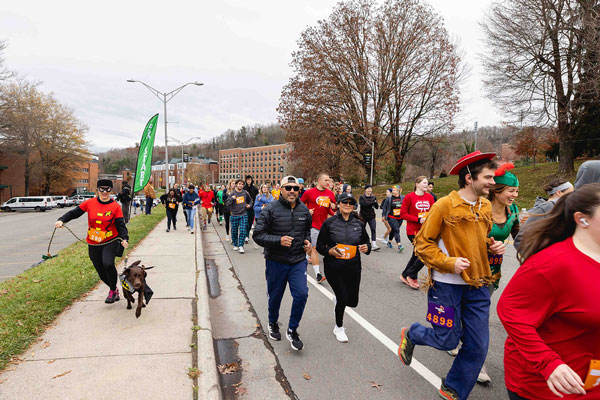
The university’s Scholars with Diverse Abilities program, a new initiative designed for young adults with intellectual disabilities, begins its pilot year at App State in the 2011-12 school year. SDAP celebrated its 10-year anniversary in 2022.
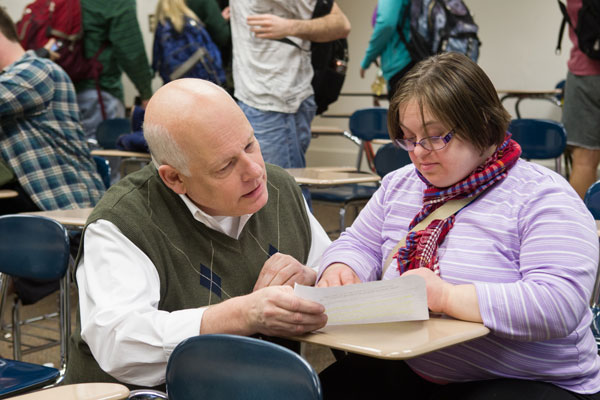
Funded by a $34 million allocation by the North Carolina General Assembly, the new Reich College of Education (RCOE) building opens in August. The state-of-the-art facility serves nearly 2,000 students connected with the RCOE, whether through one of the college’s programs or through teacher education programs across campus.
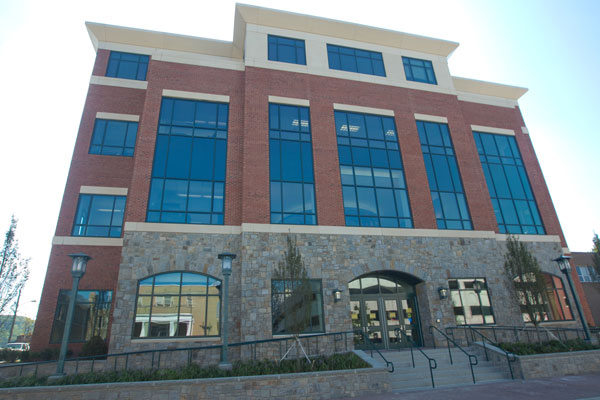
App State hosts the first Appalachian Energy Summit at its Boone campus. This multi-day event brings together faculty, staff and students from colleges and universities, as well as energy managers and visionaries, and government and industry leaders to share ideas and put into action ecological, financial and social processes designed to improve energy efficiency across the UNC System, the state and beyond.
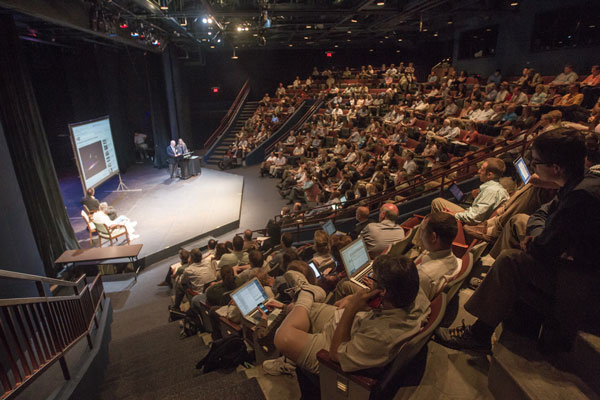
Aspire sculpture dedicated on the Boone campus, after being installed in 2011. The late NC business leader, philanthropist and university benefactor Irwin “Ike” Belk gifted the sculpture to App State. It is located across from Sanford Mall and was created by artist Jon Hair.
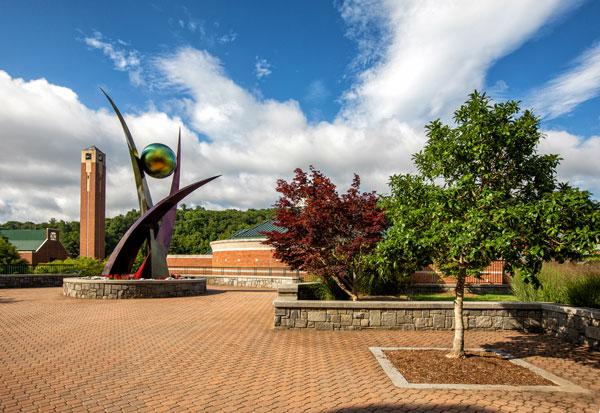
Team Sunergy — App State’s student-led solar vehicle team — established in fall 2013 as part of a class project to build a solar-powered golf cart. Since then, Team Sunergy has become a well-known ambassador for the university’s commitment to sustainability and ingenuity. The team has evolved into an award-winning program that has consistently secured podium finishes at North American track and road racing competitions — namely, the American Solar Challenge and its qualifier race, the Formula Sun Grand Prix. Early student teams began with a modified single-occupant race car, Apperion, and then built the current two-passenger car, Racing on Solar Energy (ROSE).
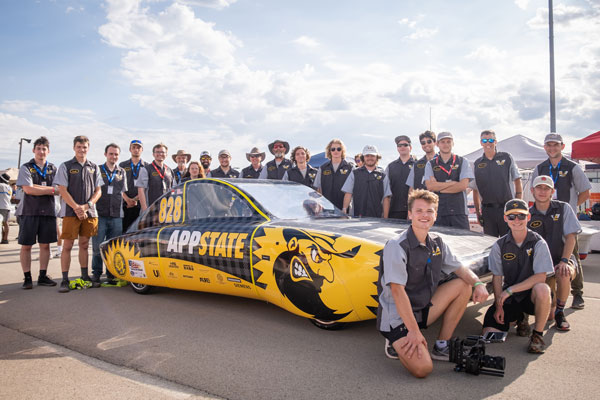
George G. Beasley Media Complex — a new, 18,000-square-foot facility housing broadcast studios, classrooms, labs and faculty offices — opens at the intersection of Rivers and Depot streets on the Boone campus. This state-of-the-art media education complex, which houses the university’s television and radio stations, provides students with unparalleled learning environments and experiences, and broadcasting services to the surrounding community.
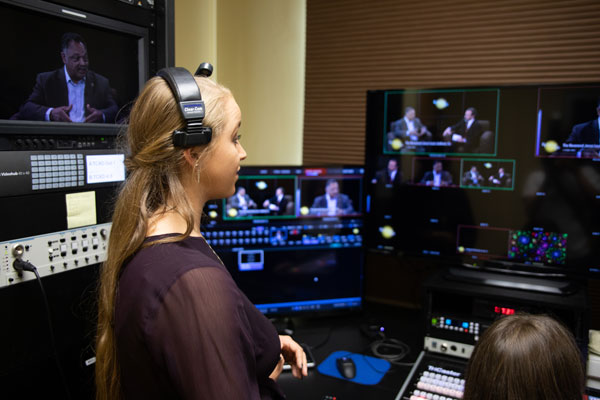
The 58,000-square-foot addition to App State’s Plemmons Student Union officially opens in January, doubling the meeting space available to students and campus organizations and enhancing the building’s sustainable features, earning it an LEED Gold Certification.
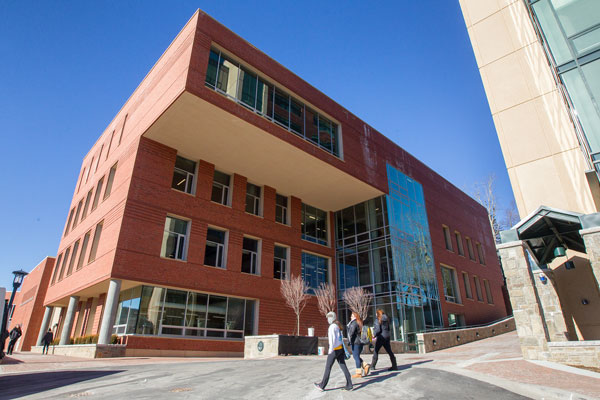
App State becomes an official member of the Sun Belt Conference (SBC). It was the move to the SBC that graduated App State football from a Division I FCS school to a Division I FBS school. Prior to the switch, the university had played in the Southern Conference since 1971. More than 400 Mountaineer student-athletes compete in 17 NCAA Division I varsity sports. All varsity teams, except field hockey (MAC) and wrestling (SoCon), compete in the Sun Belt Conference. App State athletics teams have claimed 13 Sun Belt titles since 2016.

Dr. Sheri Everts takes office as App State’s eighth leader and first woman chancellor. She was formally installed to the role in April 2015. Everts stepped down from the chancellor role in April 2024, after a decade of leadership at App State.
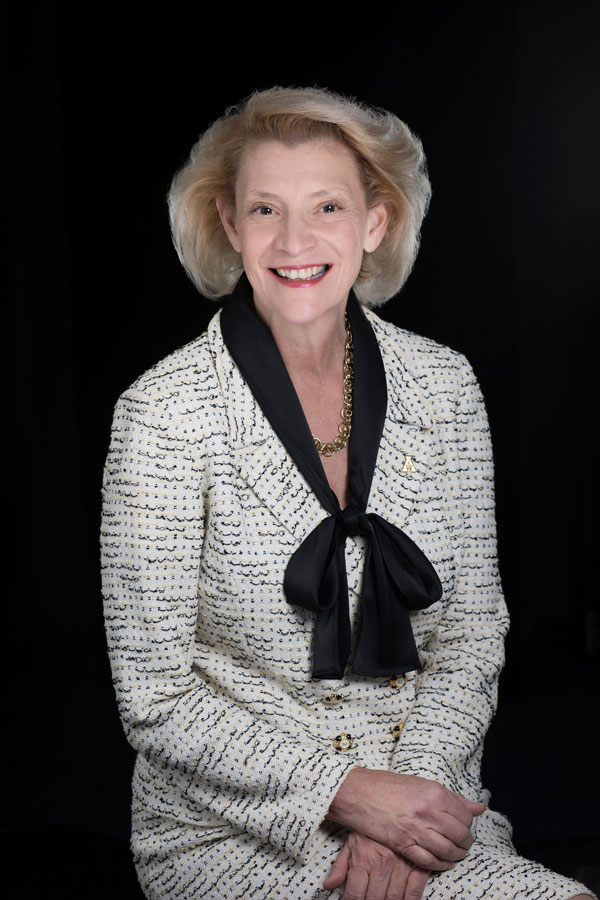
App State’s Raley Hall, home to the Walker College of Business, is renamed Kenneth E. Peacock Hall in June, in honor of Chancellor Peacock’s years of service to both the college and App State.
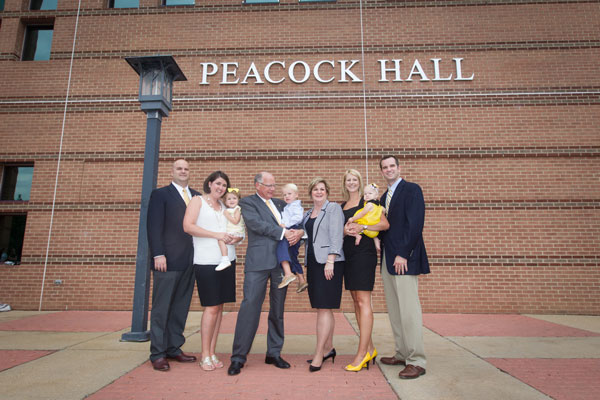
Wake Forest Physician Assistant (PA) Program begins at App State, in partnership with the Wake Forest School of Medicine. The Boone campus program was established to train primary care physician assistants to help address the critical health care needs in rural Western North Carolina. Students in the inaugural Boone PA cohort graduated with Master of Medical Sciences degrees in May 2014.
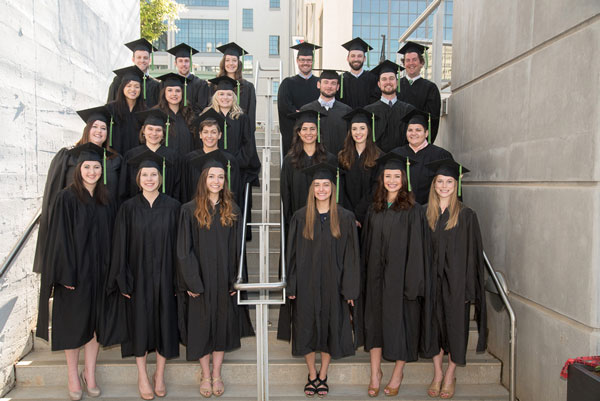
More than 17,000 students enroll at App State in fall 2015 and the university employees over 1,300 faculty.
AppTV, the university’s student-staffed, award-winning television station, is launched by the Department of Communication.
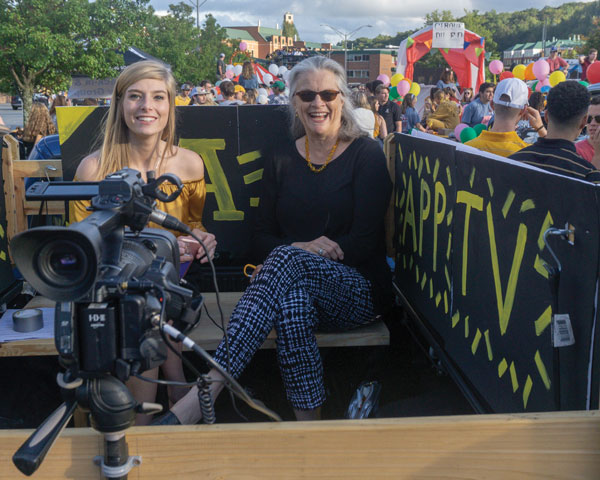
App State first recognized as the nation’s leader for National Board Certified Teachers (NBCT) — teaching’s top credential. App State has earned the NBCT honor for eight consecutive years, with 2,321 alumni having earned the national credential as of 2023. App State awards an average of 721 teaching degrees and certificates to graduates each year — many who go on to fulfill teaching and school administration positions throughout NC.
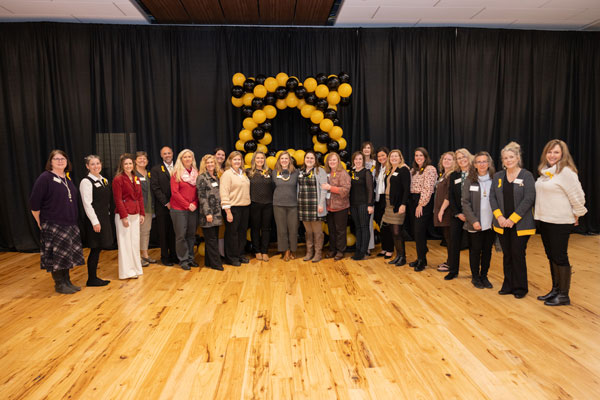
App State opens the Major General Edward M. Reeder Jr. Student Veterans Resource Center. Located in Plemmons Student Union, the center serves as a central hub for App State’s military-affiliated community members, providing programming, services and resources to assist military-affiliated students throughout their entire higher education journey at App State — and beyond.
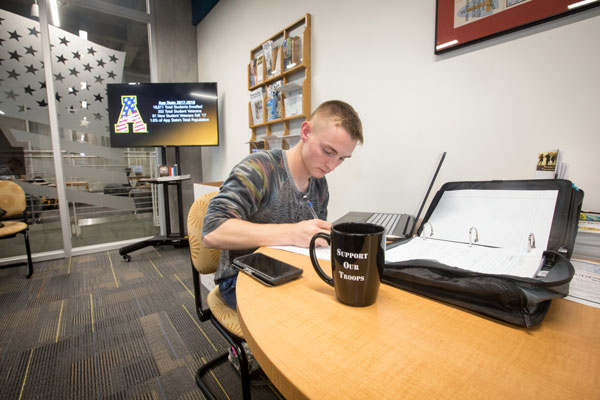
Chancellor’s Innovation Scholars Program established. The program supported research and practice related to the innovation of higher education in its first six funding cycles. For 2024, in addition to the innovation of higher education, the program has been expanded to emphasize the creation of robust partnerships with the community, industry and businesses. App State faculty and staff from all disciplines and program areas are eligible for support.

Food pantry established on the Boone campus in the 2016-17 school year. Known today as the Mountaineer Food Hub and Free Store, the Food Hub serves as a means to address food insecurity and provides staple foods, fresh produce, bread, breakfast items and personal care products, with pantry locations across the Boone and Hickory campuses. The Free Store, located in East Hall on the Boone campus, is a means to conserve resources and provides interview clothing, winter gear, school supplies, household items and various other goods. The Mountaineer Food Hub and Free Store is available to App State students, faculty and staff.
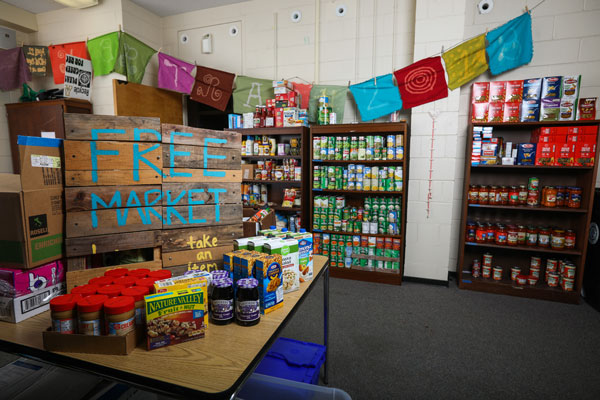
App State closed on the purchase of the old Watauga High School property in Boone, making way for the university’s Appalachian 105 project. A portion of the property is being developed into a sports complex with university-level, competition-grade venues for track, softball and tennis.
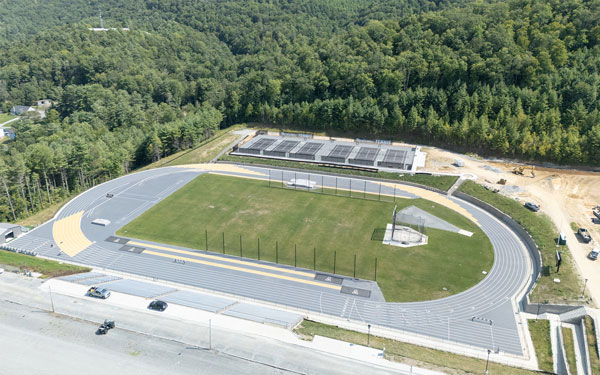
App State Board of Trustees approve the black-eyed Susan as the official flower of the university.

App State Student Ambassadors program celebrates its 40th anniversary.
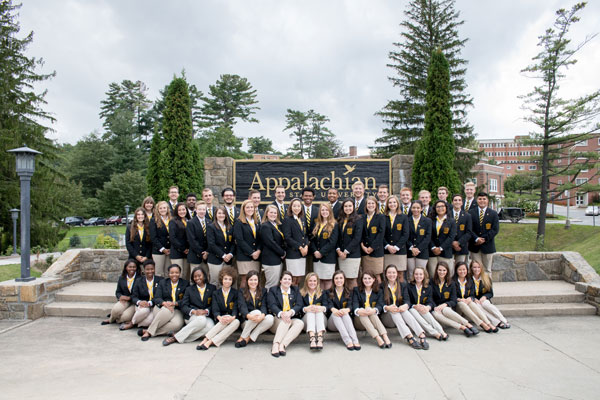
Appalachian State University Academy at Middle Fork established. App State’s Academy at Middle Fork lab school opened in August 2018, in collaboration with Winston-Salem/Forsyth County Schools, and serves approximately 274 students in kindergarten through fifth grade. Watch this Dave by the Bell podcast episode to hear from some of App State’s mini-Mountaineers.
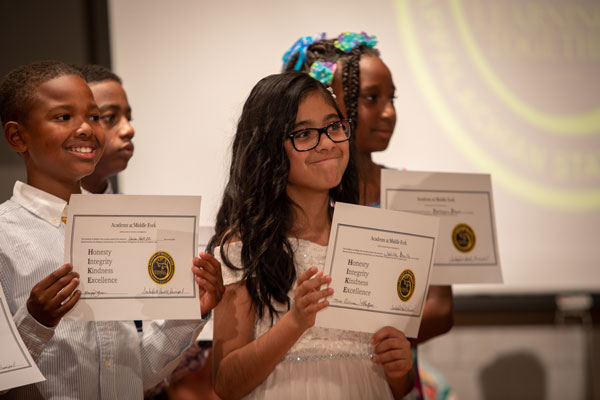
The university establishes its Founders Day tradition and dedicates Founders Plaza on Sept. 5, 2018. More than 25 members of the Dougherty family, as well as former chancellors and the Appalachian Community past and present gathered on App State’s Boone campus for the event.
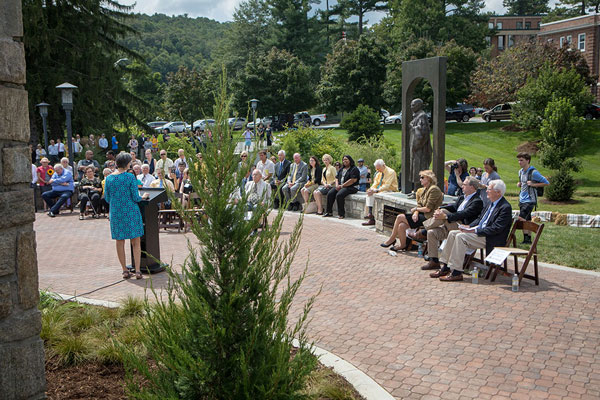
App State cut the ribbon on the Levine Hall of Health Sciences, home to the university’s Beaver College of Health Sciences. The five-story, 203,000-square-foot Levine Hall was the first project funded by the Connect NC Bond, a bond approved by the citizens of NC in 2016 by a 2-to-1 margin.
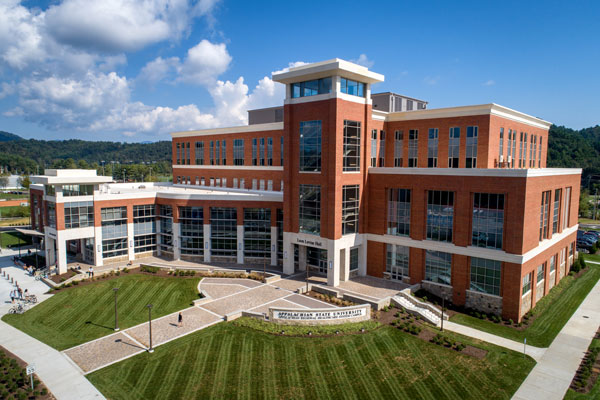
App State celebrates 50 years of women’s athletics. Field hockey was the university’s first women’s sport, established in 1968.

App State secured a 30–19 victory over Louisiana to win the inaugural Sun Belt Conference Football Championship Game at Kidd Brewer Stadium on Dec 1. This was the team’s third straight league title and the win earned the Mountaineers an automatic bid to face a Conference USA team in the R+L Carriers New Orleans Bowl on Dec. 15.
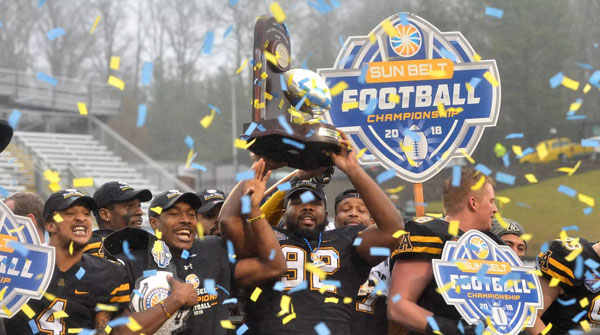
App State holds a ribbon-cutting and unveiling ceremony for its National Pan-Hellenic Council (NPHC) Plots and Garden project — a gathering space and tribute to the Greek-letter organizations that compose the NPHC, collectively called “The Divine Nine.”
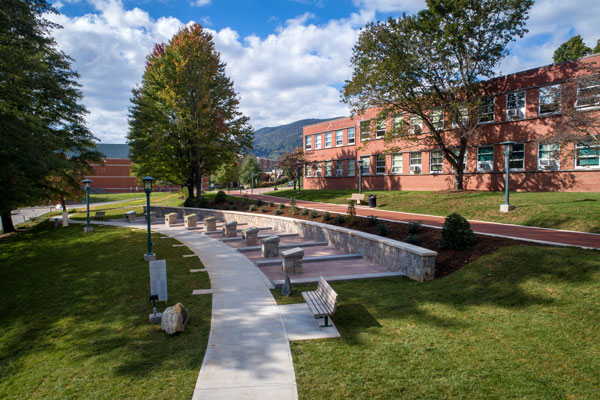
A 64-square-foot floating shelter is installed on Duck Pond to provide Boone campus ducks a safe nesting area and refuge from stormy weather.
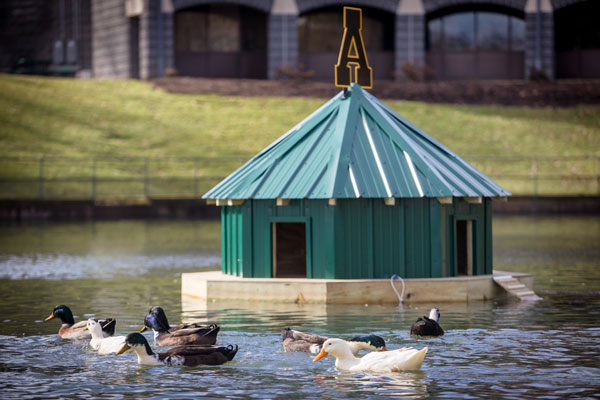
The Appalachian Police Officer Development Program (ADPD) and its Appalachian Police Academy launch at App State. APDP was initiated by the Appalachian State University Police Department to equip students with the knowledge, skills and training to become law enforcement officers. The first Police Academy cadets graduated in August 2018.
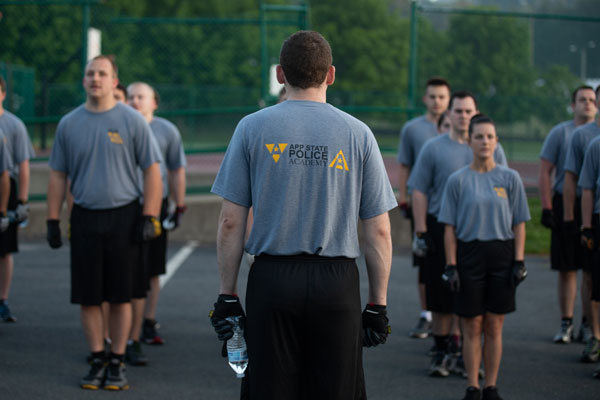
The Hayes School of Music’s Cannon Music Camp celebrates its 50 anniversary. A three-week, music-filled retreat, the camp offers a comprehensive course of musical instruction for student musicians who are rising high school freshmen to rising college freshmen, with intensive college preparatory work in performance and music theory.
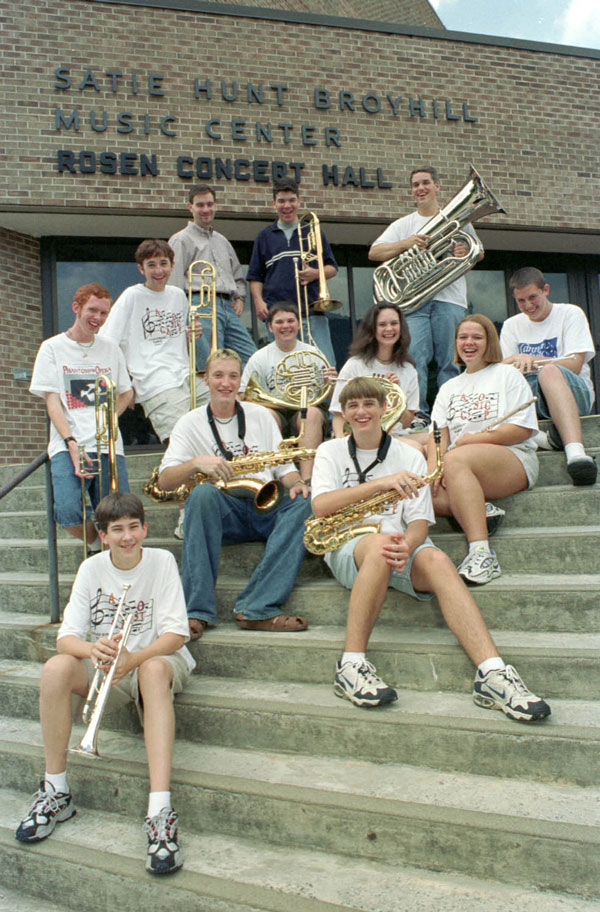
App State men’s basketball celebrates its 100th anniversary during the 2019-20 schools year. During their first century of play, the Mountaineers posted more than 1,200 victories and had a .518 winning percentage. The App State’s men’s basketball program has captured 19 conference titles across the Carolinas Conference, Southern Conference and Sun Belt Conference. And the Mountaineers have made three appearances in the NCAA Tournament — two in the National Invitation Tournament, one in the College Basketball Invitational and one in The Basketball Classic.
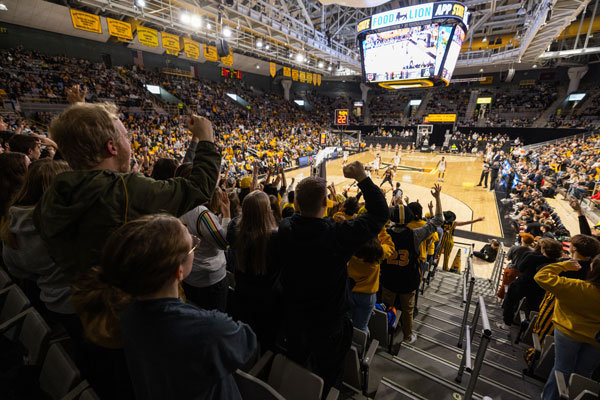
Appalachian State University Police Department honored as the Law Enforcement Agency of the Year by the North Carolina Police Executives Association, a statewide organization for police leadership. The award honors one NC police agency each year that has pioneered an innovative program, policy or concept that demonstrates the principles of community policing, problem-solving strategies and/or strengthens community trust.
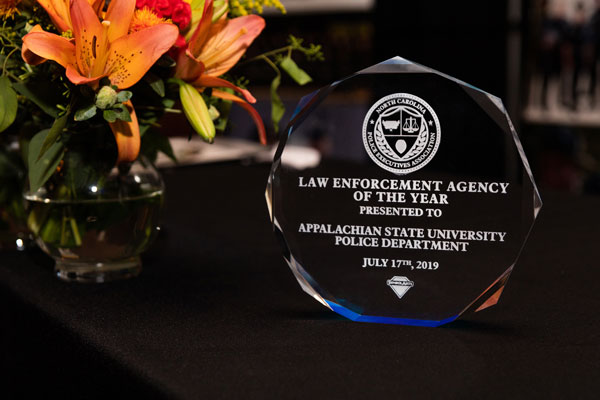
As part of the 2019 National Geographic and Rolex Perpetual Planet Everest Expedition, former App State professor Dr. Baker Perry helped install weather stations at the highest elevation on the planet — Mount Everest. Perry regularly returns to Mount Everest to maintain the stations, which were recognized in the Guinness World Records book in 2021 as the highest altitude weather station on land.
Weather data from the stations — including real-time wind, temperature and precipitation measures — are improving climber safety on the main Mount Everest climbing routes. Longer term, the data are enabling scientists to learn more about climate at high altitudes — which affects everything from glacier health, to water supply, to agricultural growing seasons, Perry said.
Fun fact: Perry is the great-great grandson of App State founders D.D. and Lillie Dougherty.

App State’s ROTC program celebrates its 50th anniversary. The university’s Mountaineer Battalion first launched in 1969 at the height of the Vietnam War. In the five decades since, the battalion has commissioned 950 officers, including Lt. Gen. Robert Ashley ’84, former director of the U.S. Defense Intelligence Agency, and Maj. Gen. John Evans ’88, former commanding general of U.S. Army Cadet Command.
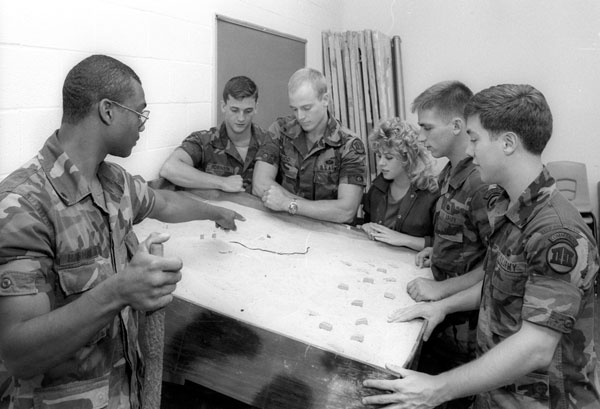
App State dedicates its Lille Shull Dougherty statue during the university’s 2019 Founders Day celebration.
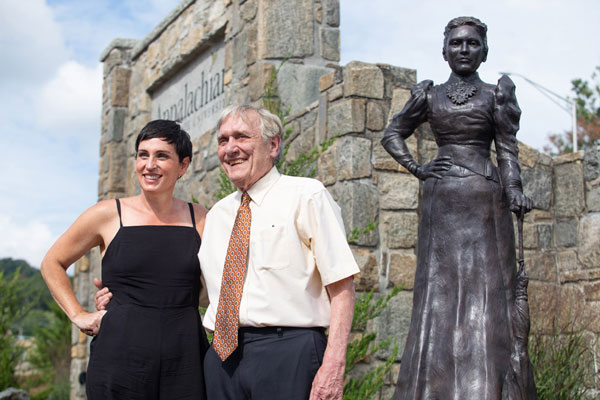
App State begins admitting students to its second doctoral program, the Doctor of Psychology (Psy.D.) program. The university received approval for the program from the UNC Board of Governors in 2018.
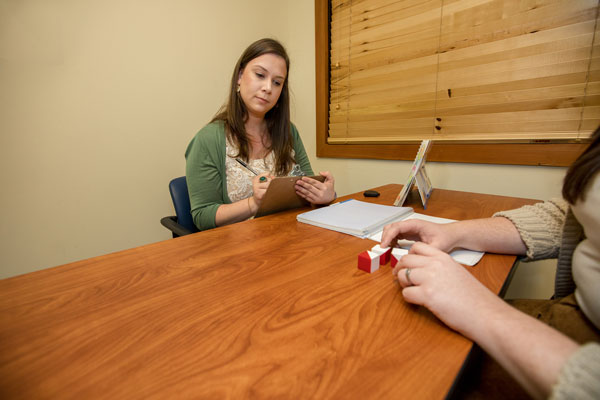
Founders Bell Pavillion completed in July. The pavilion, located on Founders Plaza at App State’s Boone campus, is a reproduction of the characteristic roofline of Watauga Academy, the school founded in 1899 that would later become Appalachian State University. The pavilion contains the Founders Bell, a representation of the first bell that called young people to education at the school founded by brothers B.B. and D.D. Dougherty and D.D.’s wife, Lillie Shull Dougherty. Learn more about the pavillion’s construction.
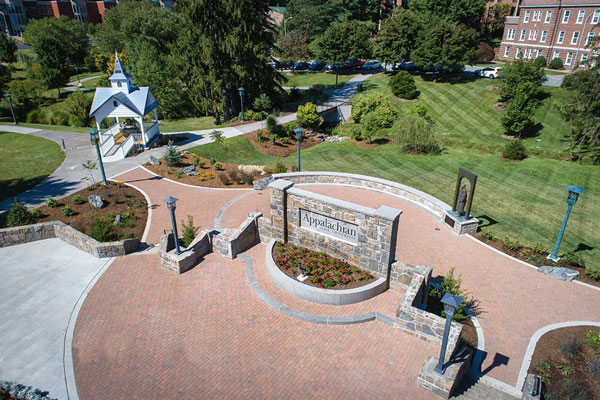
App State enrolls more than 20,000 students and employees nearly 1,400 faculty.
In March 2020, in response to orders given by the University of North Carolina System and North Carolina Gov. Roy Cooper, App State, along with all UNC System institutions, pivoted to remote working and learning for the spring 2020 semester due to the COVID-19 pandemic.
The campus remained open, continuing to deliver instruction remotely, in-person and using hybrids of both methods. Faculty and staff adapted classes, events and experiences to continue App State’s academic mission as safely as possible. Learn more about the university’s response to the global pandemic.

The university holds Spring 2020 Commencement virtually due to the COVID-19 pandemic — the first online commencement in the university’s history.

Appalachian State University and AppHealthCare partner to launch the #ShowYourLove public health campaign, which kicked off across the High Country in summer 2020 and encouraged residents and visitors to follow the 3Ws: wear a face covering, wait 6 feet apart and wash your hands often or use hand sanitizer.

North end zone facility at Kidd Brewer Stadium opens in November. This mixed-use athletics facility provides more than 80,000 square feet of space designed to accommodate various athletics, academic and community uses.
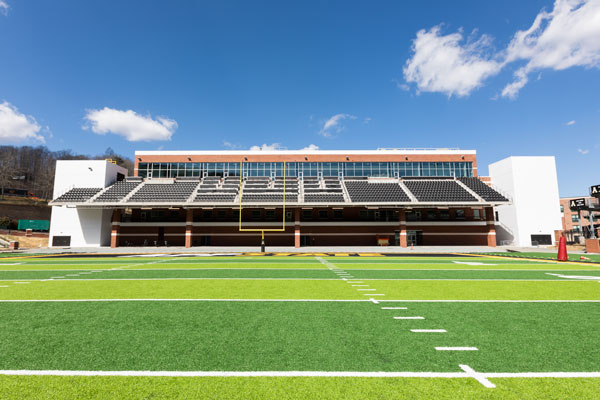
First App State Builds a Home (ABAH) project, built for the Barker family, dedicated on May 30. App Builds a Home is a campuswide partnership between App State and Watauga County Habitat for Humanity, bringing together students, faculty, staff and alumni, as well as community members, to help local partner families build safe, affordable homes. To date, five homes for local partner families have been constructed through ABAH, which is gearing up to begin its sixth home build in spring 2025.
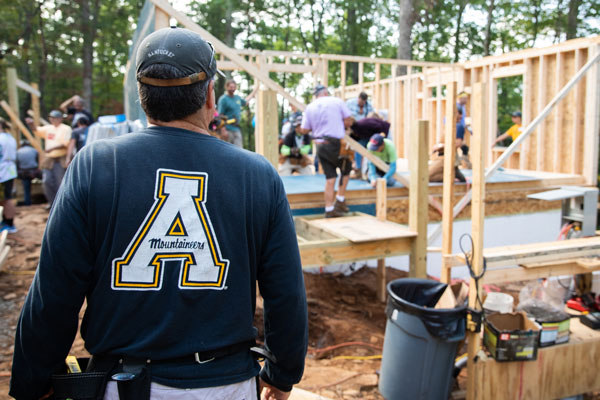
Appalachian State University Police Department named among top 25 university police departments in the nation for student safety by Safe Campus: The National Campus Safety Summit, which recognized ranked schools for “increasing the safety and security of their campus community” and “making a difference in student safety.”
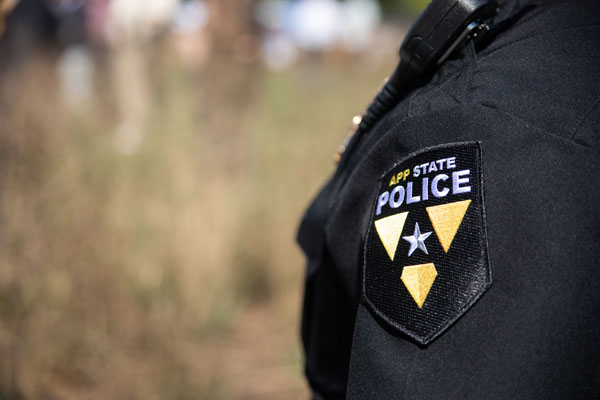
Bronze sculpture of Archie the aetosaur installed among the exhibits of App State’s Fred Webb Jr. Outdoor Geology Laboratory/Interactive Rock Garden on the Boone campus. A collaborative project of faculty and students in App State’s Department of Geological and Environmental Sciences and Department of Art, Archie is the largest and most accurate aetosaur sculpture in the northern hemisphere, according to App State professor and vertebrate paleontologist Dr. Andrew Heckert. Aetosaurs were prehistoric reptiles that prowled the Earth more than 230 million years ago.
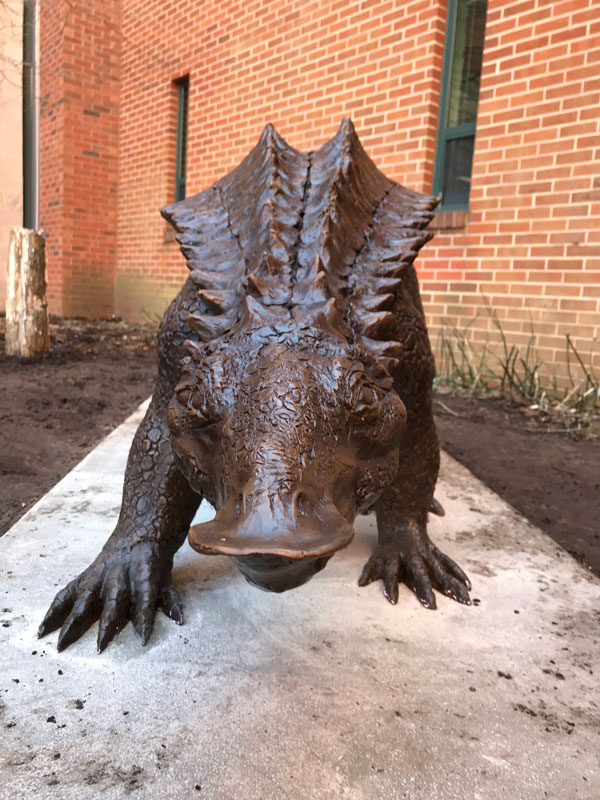
The university hosts its first COVID-19 vaccine clinic March 11–12 at the Holmes Convocation Center on the Boone campus, where M.S. Shook Student Health Service staff and Department of Nursing students administered 680 doses of the vaccine to students, faculty, staff and community members over the two-day period.
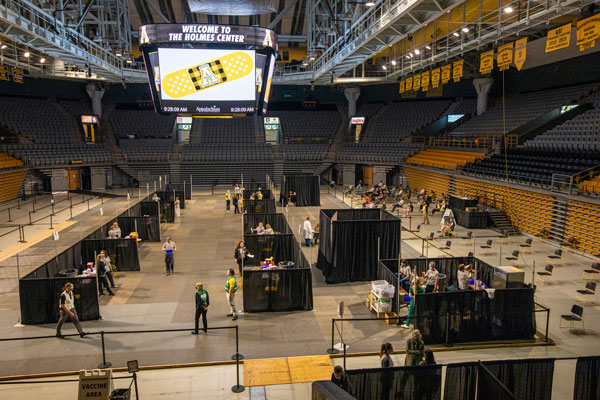
App State’s solar vehicle team, Team Sunergy, secures a first-place win in the Cruiser Class at the 2021 American Solar Challenge and a second-place finish at the 2021 Formula Sun Grand Prix. Since 2016, the team has secured podium finishes in every competition in which it has participated. Most recently, the team earned second place in both the 2024 American Solar Challenge and Formula Sun Grand Prix.
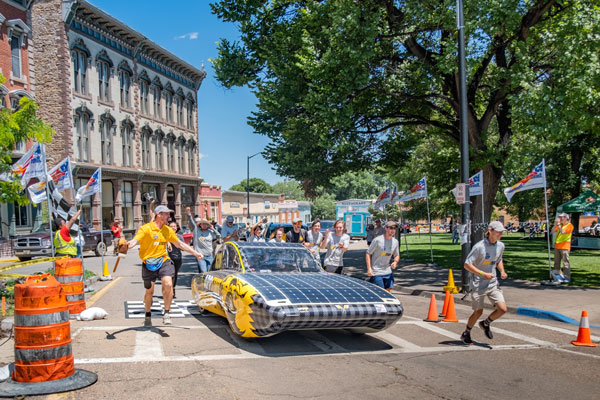
App State launches new digital delivery system for its textbook rental program, offering students significant savings and value. Students can now read and download textbooks and class materials on their tablets and phones, improving the accessibility and volume of material available via the university’s textbook rental program. In the 2022–23 academic year, the program saved students over $5 million. It has been utilized by 99% of the student population since its launch. And in February 2023, App State won an Independent College Bookstore Association (ICBA) award for excellence in course material management for its digital textbook program.
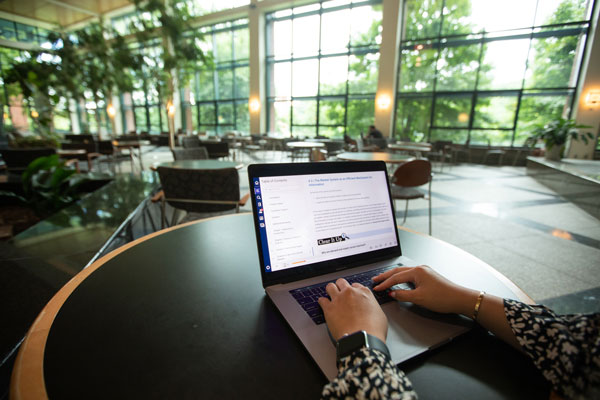
App State dedicates Jerry Moore Plaza at Kidd Brewer Stadium and unveils the bronze statue or Moore’s, located in the plaza. Moore served as App State’s head football coach from 1989 to 2012, leading the Mountaineers to three consecutive national championships and 23 winning seasons in 24 years.
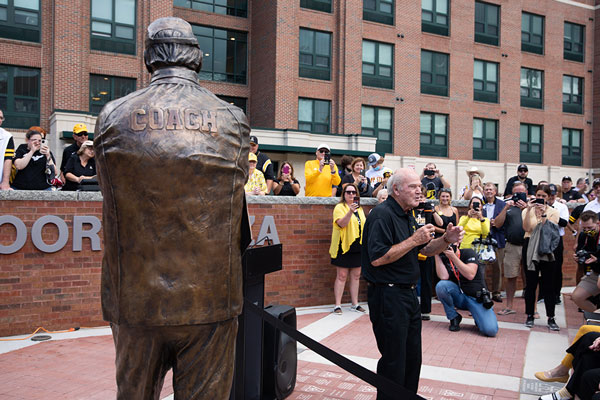
App State holds in-person commencement for the first time since December 2019, due to the global pandemic. The university hosted 13 in-person ceremonies May 7–12 for its Spring 2021 Commencement.
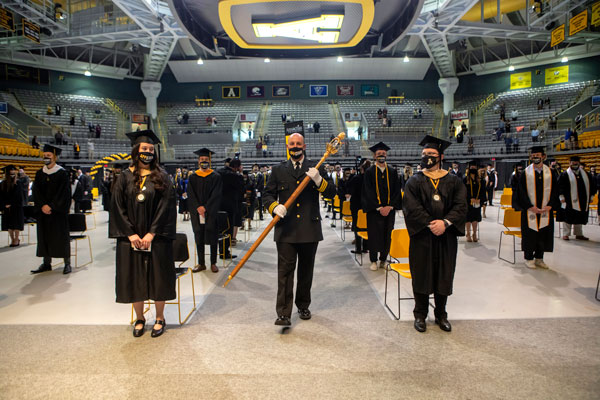
ESPN’s College GameDay comes to App State’s Boone campus after the Mountaineers’ 17-14 win against the No. 6-ranked Texas A&M on Sept. 10, 2022. College GameDay’s visit to Boone marked the show’s 96th city visit, and the second time the show has traveled to a Sun Belt Conference school.
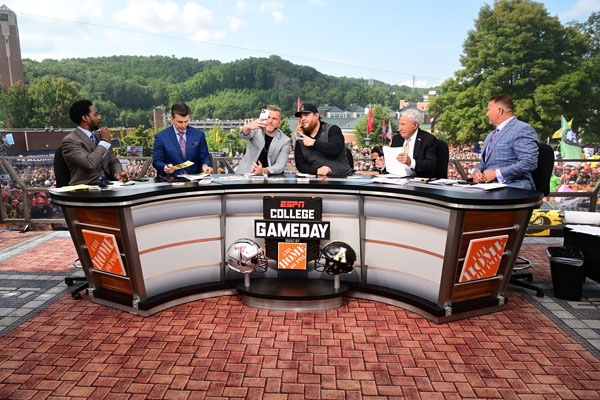
App State breaks ground on Phase 1 of its Innovation District project, located at the site of the former Broyhill Inn and Conference Center on Bodenheimer Drive. This initiative will bring together expertise across disciplines and facilitate collaborations on campus and with the communities throughout the region, extending the university’s mission of teaching, research and service, preparing the workforce of today and building the workforce of tomorrow. The project is expected to have a lasting and powerful impact on the entire region, broadening economic development opportunities across Northwestern North Carolina.
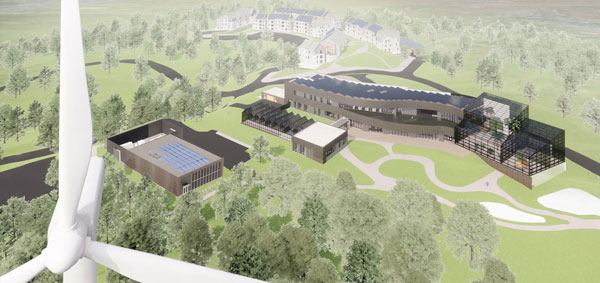
App State launches its online undergraduate veterinary technician program in fall 2022. Developed through a partnership between App State and Banfield Pet Hospital® — the leading provider of preventive veterinary care in the U.S. and part of the Mars Veterinary Health family of practices — the four-year program prepares students for meaningful employment in the growing veterinary medical profession.
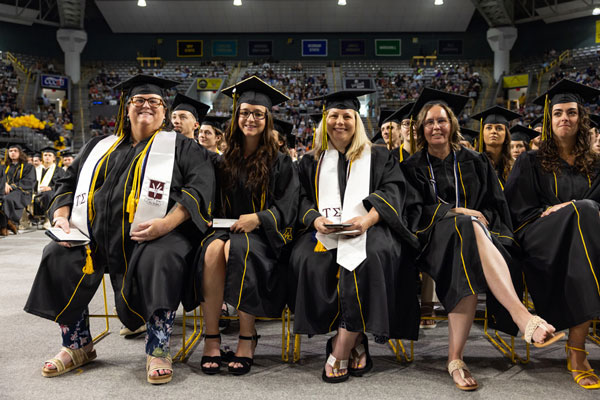
App State opens its new Hickory campus to students for fall 2023, expanding higher education access in what was previously the largest metropolitan area in the state without a public university campus. More than 100 undergraduate degree programs are available to students attending App State at the Hickory campus, and the on-site services and facilities at the campus continue to expand to meet students’ needs.
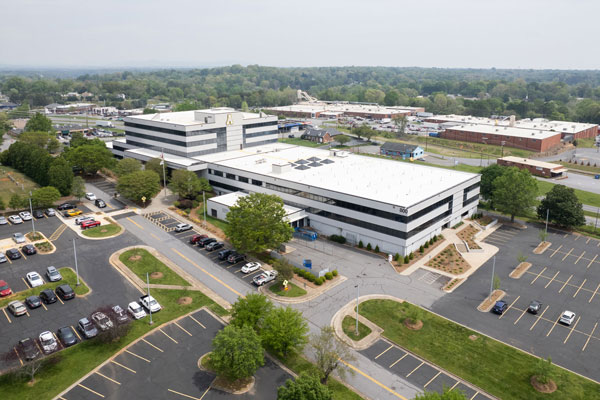
App State’s rare corpse flower (Amorphophallus titanum), known as Mongo, blooms on Nov. 24, 2023. It was the flower’s first bloom since arriving at the Department of Biology Greenhouse in 2011.
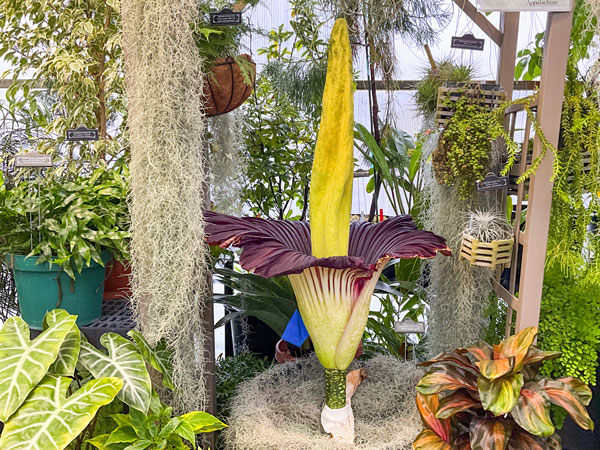
App State holds inaugural Camp Jean Rankin: Empowering Children and Youth Who Stutter. The camp is a residential, weeklong summer camp held at Appalachian State University for kids ages 11 to 16. Speech-language pathology (SLP) faculty, staff and students plan and host the camp, working alongside community SLPs to provide individual and group therapy for stuttering. The camp is named for Jean Rankin, mother of camp donor Ed Rankin ’70, who along with his wife, Thuy Le, sponsored the camp. Ten 10 campers took part in App State’s second annual Camp Jean Rankin in July 2024.
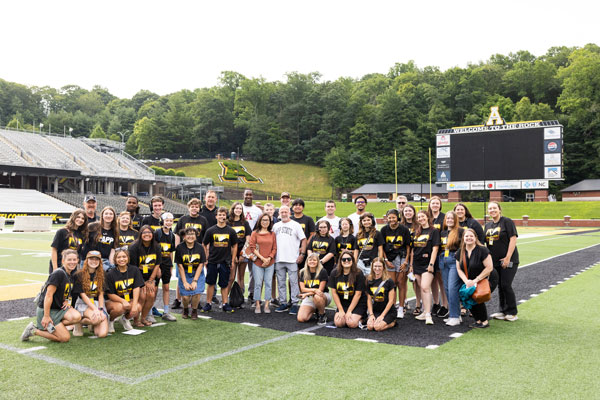
App State retires number 14, worn by Armanti Edwards — a record-breaking quarterback who played for the App State Mountaineers from 2006 to 2009 — in fall 2023. The retirement ceremony was held at halftime of the App State–Georgia Southern home game on Nov. 25, 2023.

App State celebrates its 125th anniversary during Founders Day — an annual tradition celebrated each fall to honor App State’s founders and the first day of classes in 1899. Watch this brief video for a glimpse of App State’s 125-year history.
21,570 students enroll at App State for fall 2024, and the university employs more than 3,600 full- and part-time faculty and staff.
Dr. Heather Hulburt Norris is appointed interim chancellor of Appalachian State University on April 19, 2024.
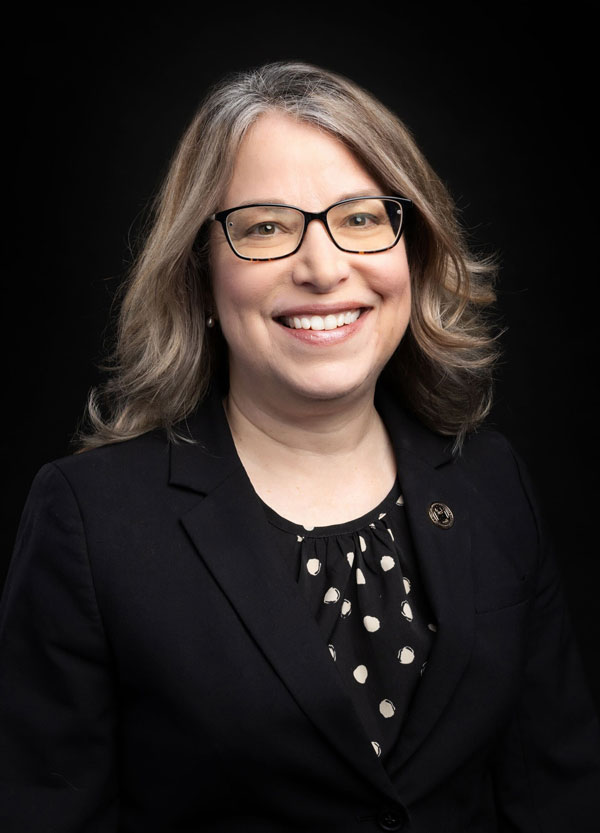
The spring 2024 semester marks the 12th consecutive year that Mountaineer student-athletes have earned a cumulative GPA above 3.0.
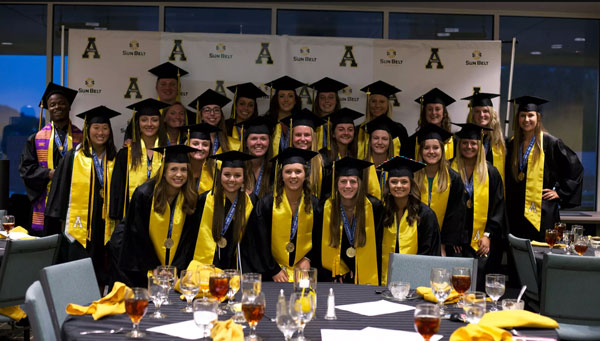
App State unveils new sculpture of former Chancellor John E. Thomas on the Boone campus in May. The sculpture sits outside the main entrance of John E. Thomas Hall — the building named in his honor. Thomas served as the university’s fourth leader from 1979 to 1993.
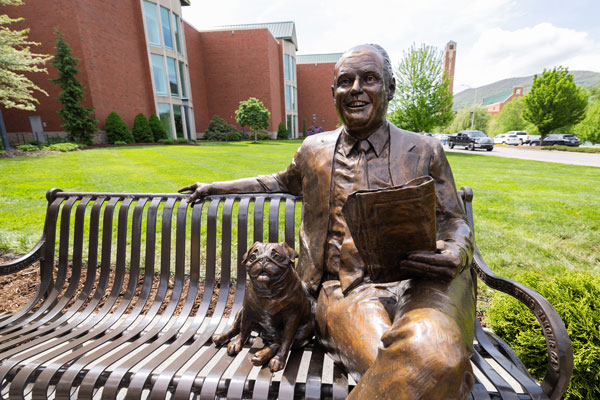
App State Gospel Choir celebrates 50 years of uplifting the campus and local community through song. Learn more about the Gospel Choir’s history.
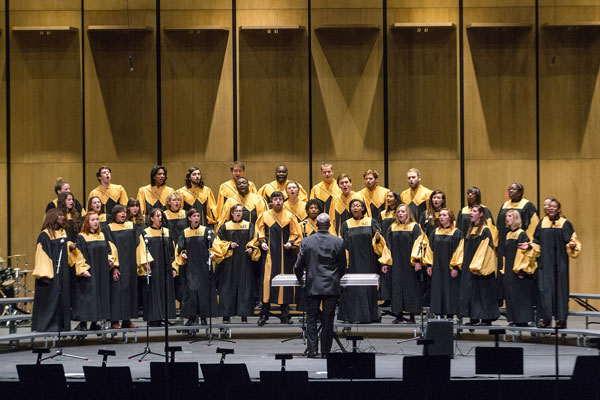
During App State’s 2024 Appalachian Energy Summit, Department of Environmental Quality representatives report that the state is well on its way to achieving — and most likely exceeding — $2 billion in avoided energy costs by 2025. Since the 2002–03 academic year, the UNC System and its partners have collectively avoided $1.96 billion in energy costs.
App State, along with 12 other state agencies, universities and community colleges, was recognized by the Department of Environmental Quality for significantly reducing its energy use since 2002–03. App State’s 48% reduction in energy use per square foot continues to surpass the state’s goal of at least 40% compared to 2002–03 fiscal year levels.

An Appalachian Summer Festival celebrates its 40th season.
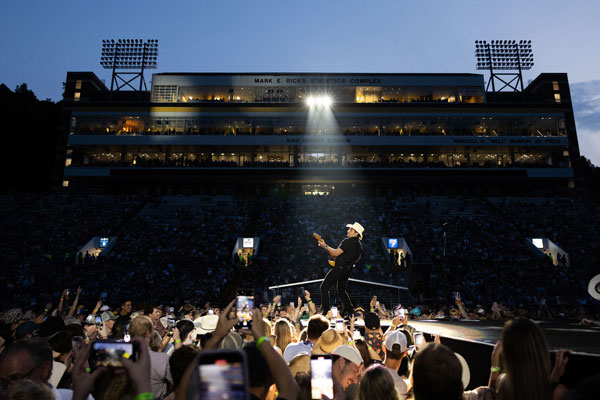
App State’s appropriate technology program celebrates its 40th year. The Appropriate Technology program has evolved into the Department of Sustainable Technology and the Built Environment, with over 800 students whose primary focus is renewable energy and energy-efficient buildings. Learn more about the program’s history.
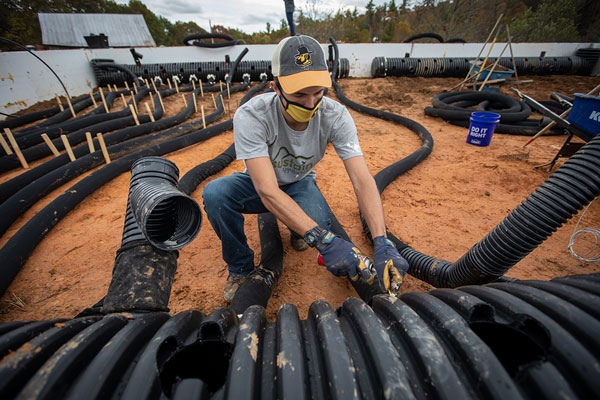
App State partners with Project Kitty Hawk, an ed tech nonprofit funded by the North Carolina General Assembly, to launch five online undergraduate degree programs in 2024-25, all designed to meet the needs of working adults.
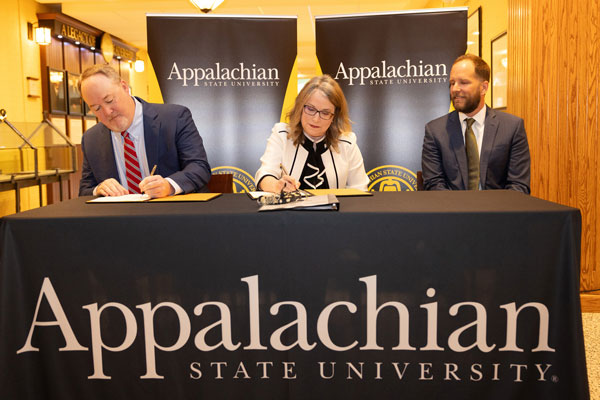
The North Carolina School of Banking — the longest running state banking school in the nation — moves its headquarters to App State, establishing a strategic partnership designed to enrich academic and professional development opportunities for future banking leaders.
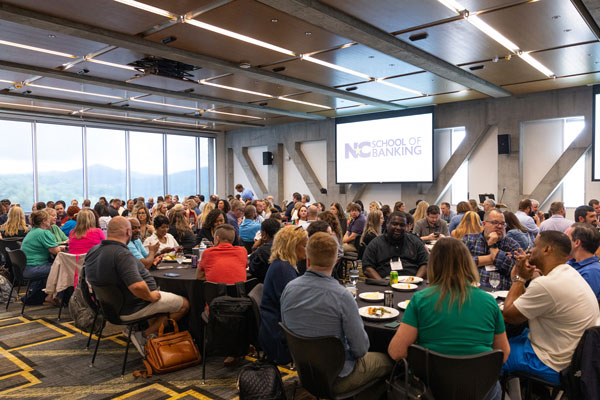
App State GEAR UP program awarded the largest ever single grant in the university’s history. The $35 million in federal funding will support App State GEAR UP in providing college and career services to thousands of middle and high school students across Western North Carolina. The program celebrates its 10th anniversary this year.
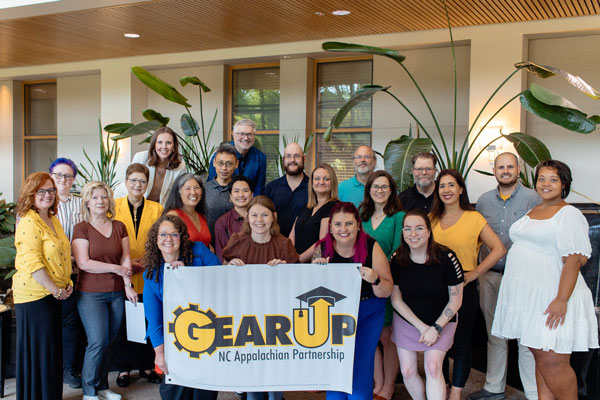
Open to anyone with an interest in the history of App State, University Archives houses not only the official records gathered from offices and departments but also the papers of individuals and organizations that are part of the university’s history.
Appalachian State University's History pages are a project of the University Communications team, with special acknowledgement for work by Jessica Stump, Derek Wycoff and the staff of University Archives.